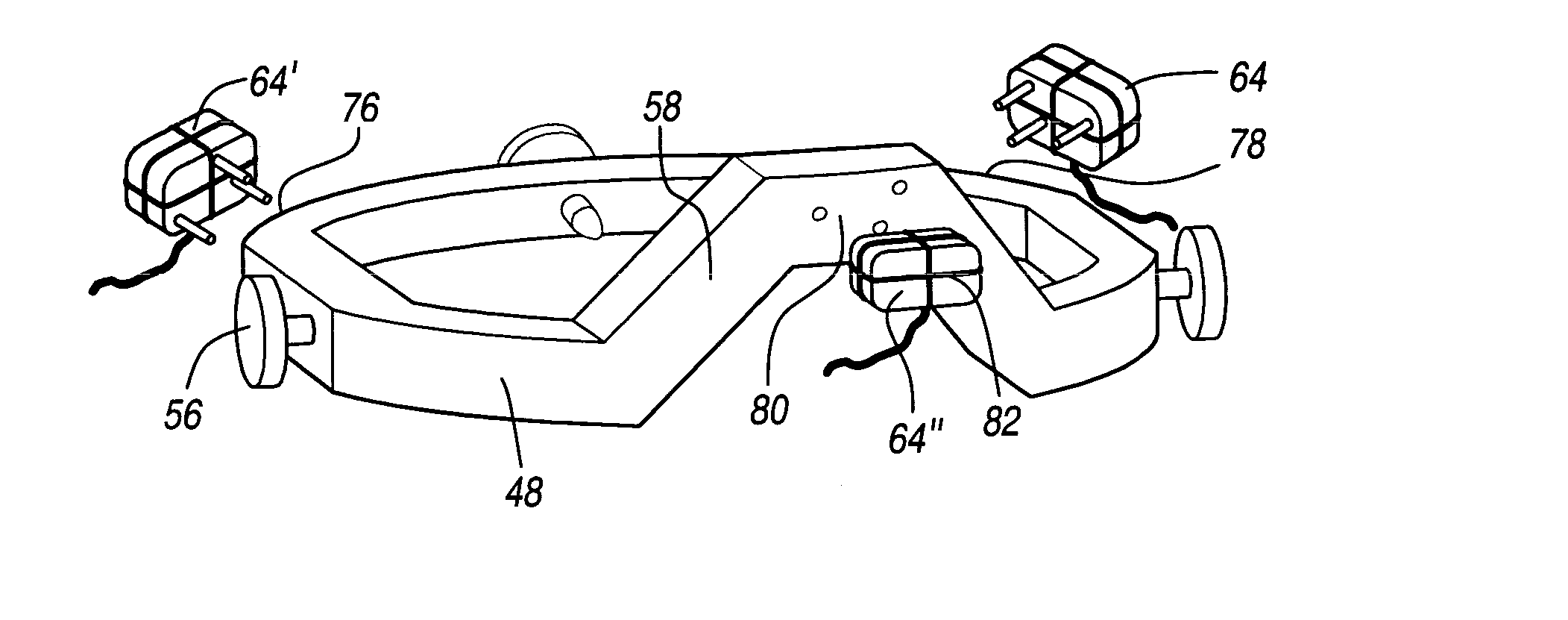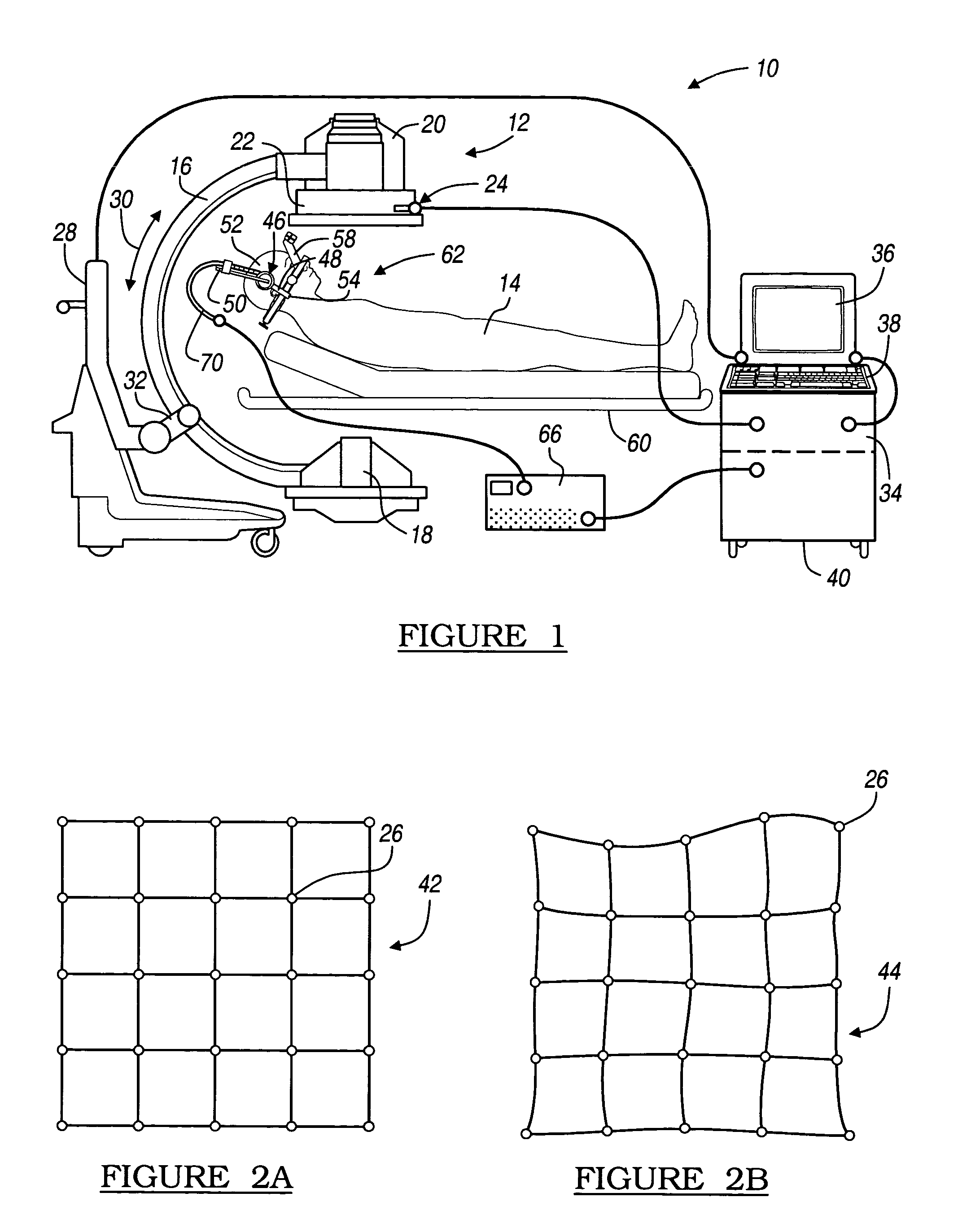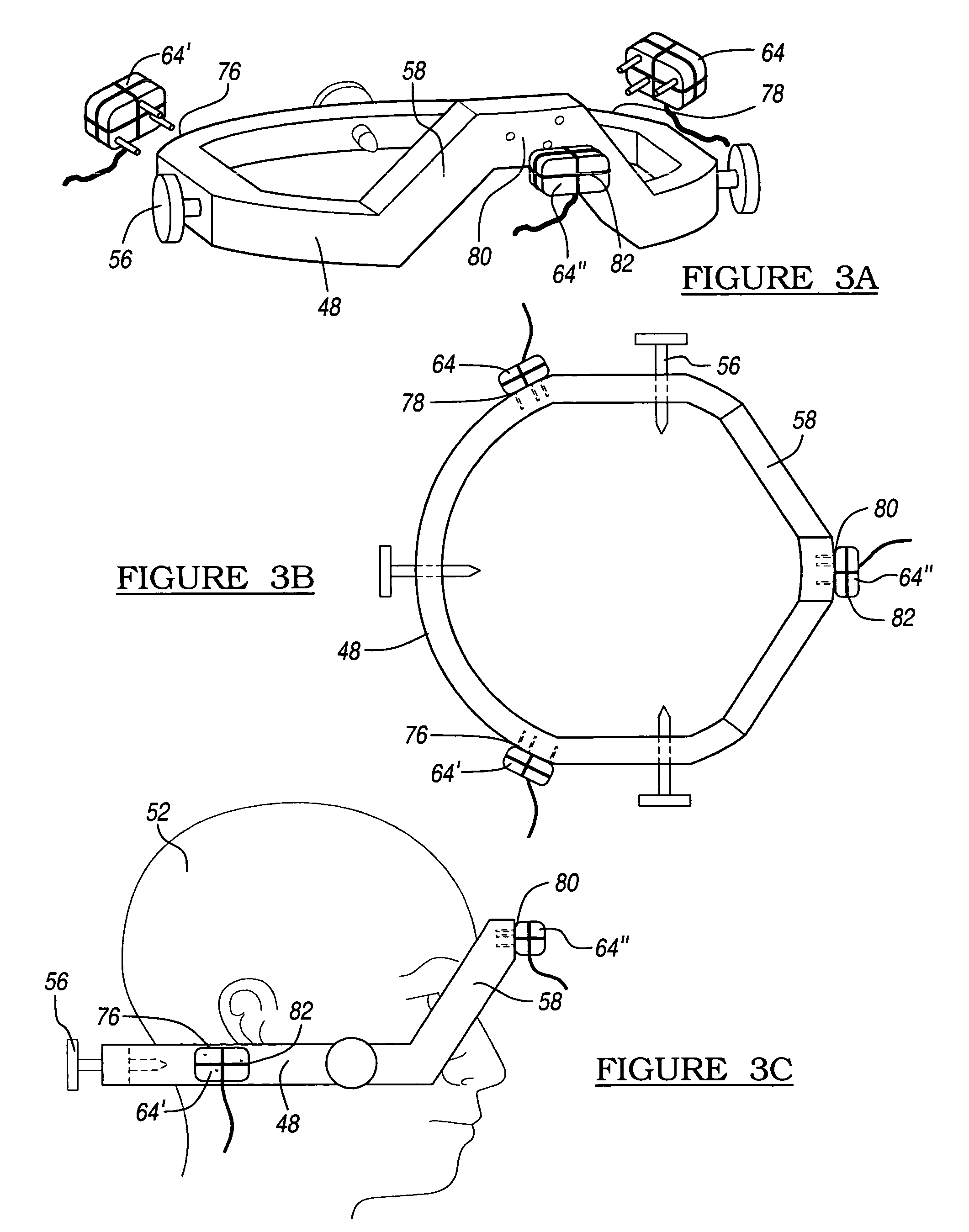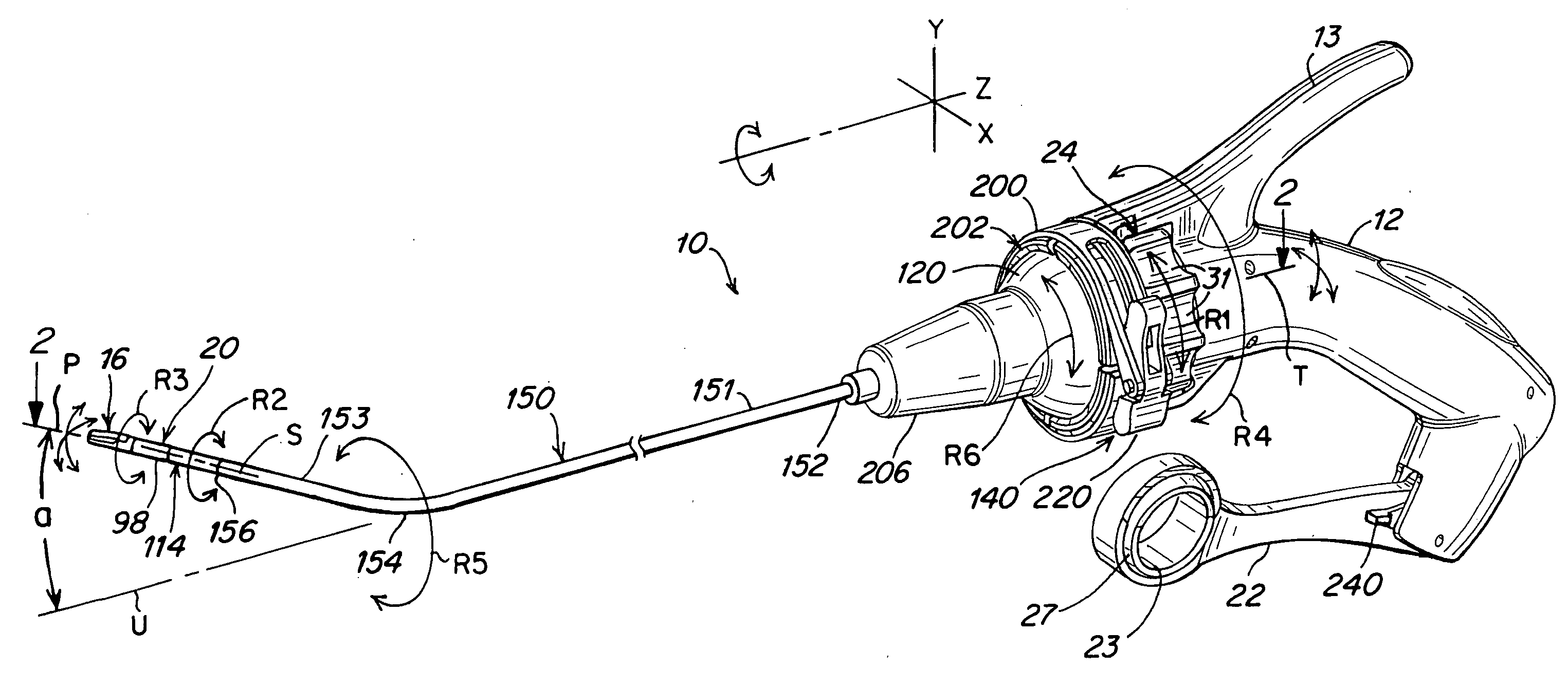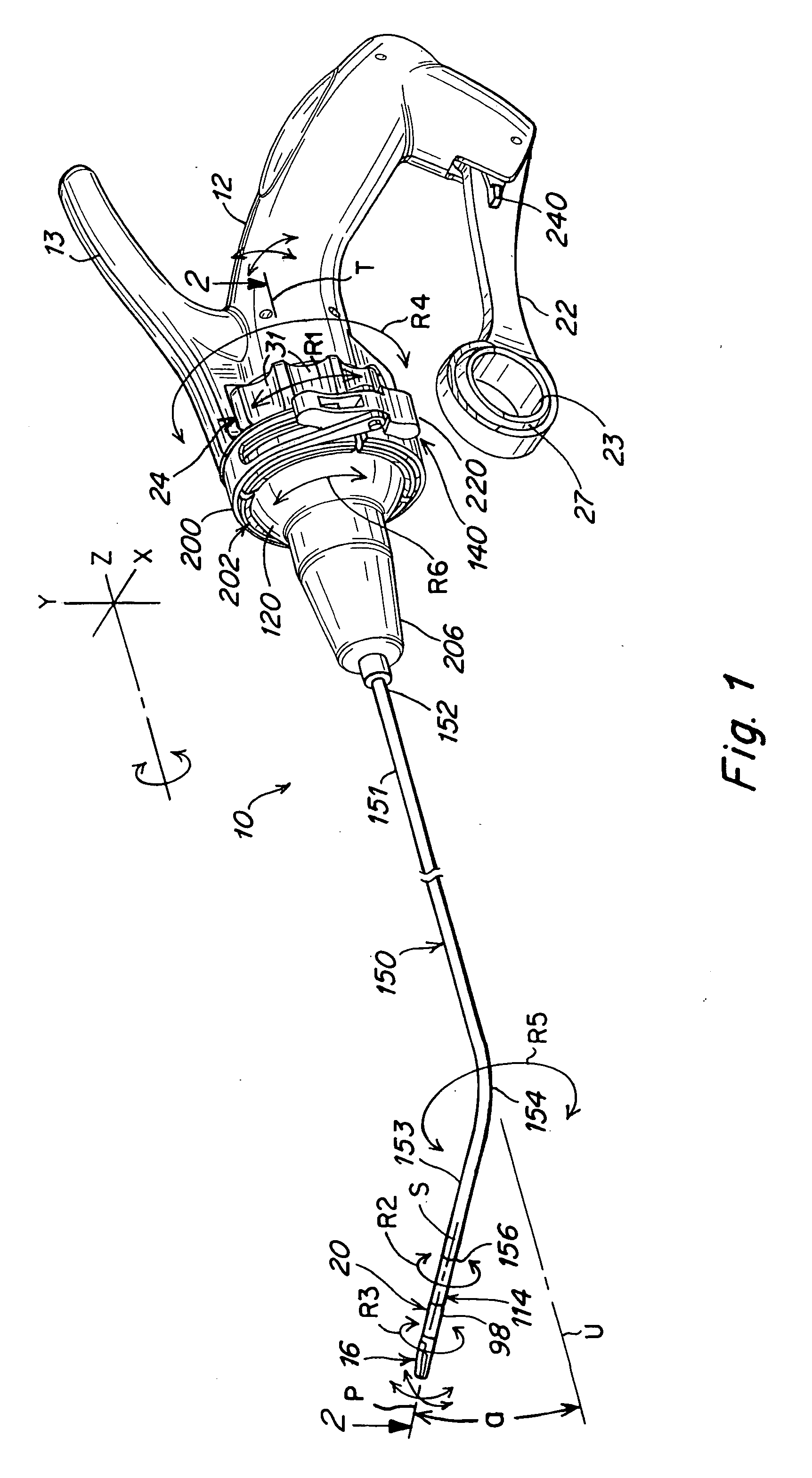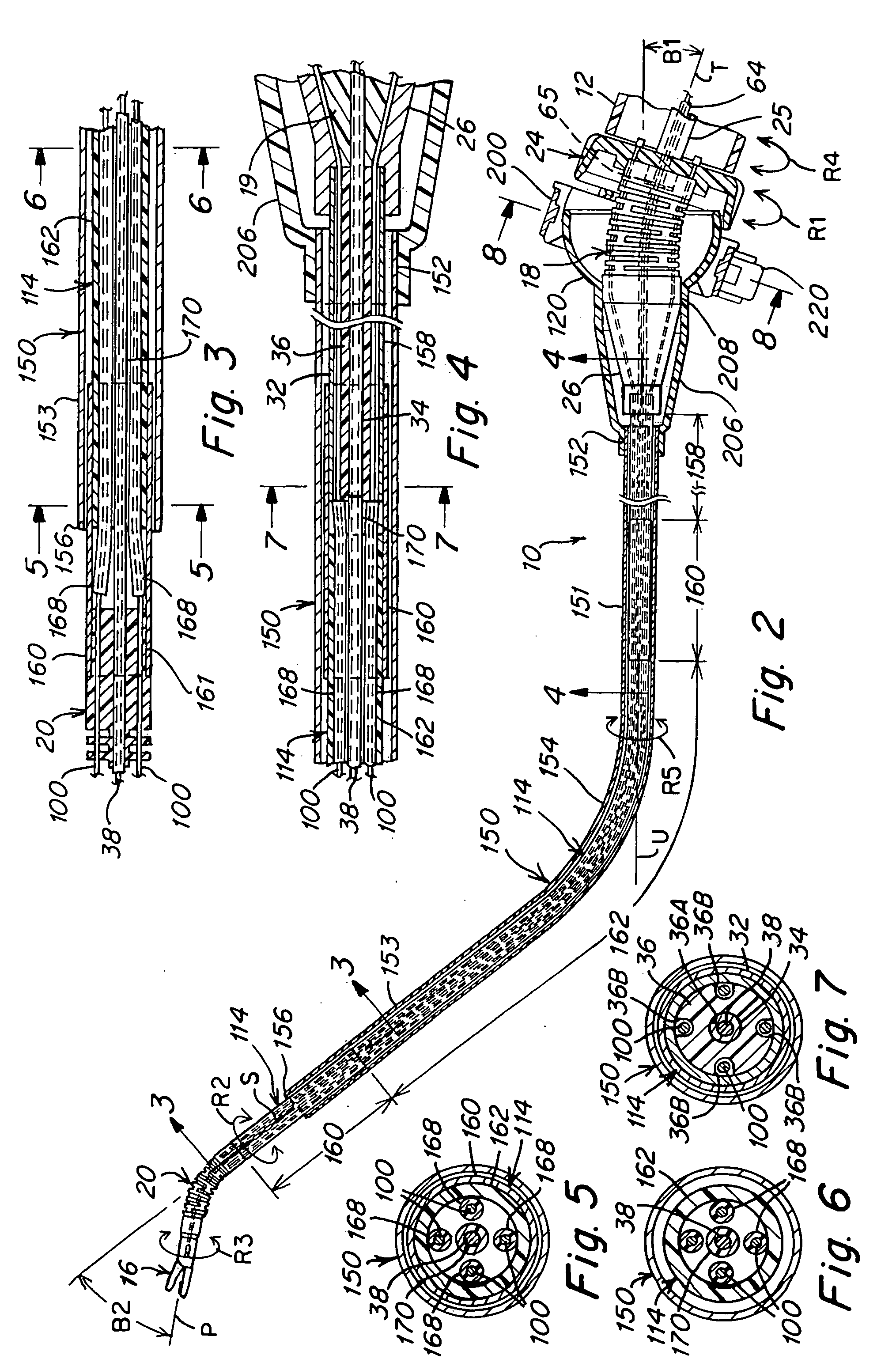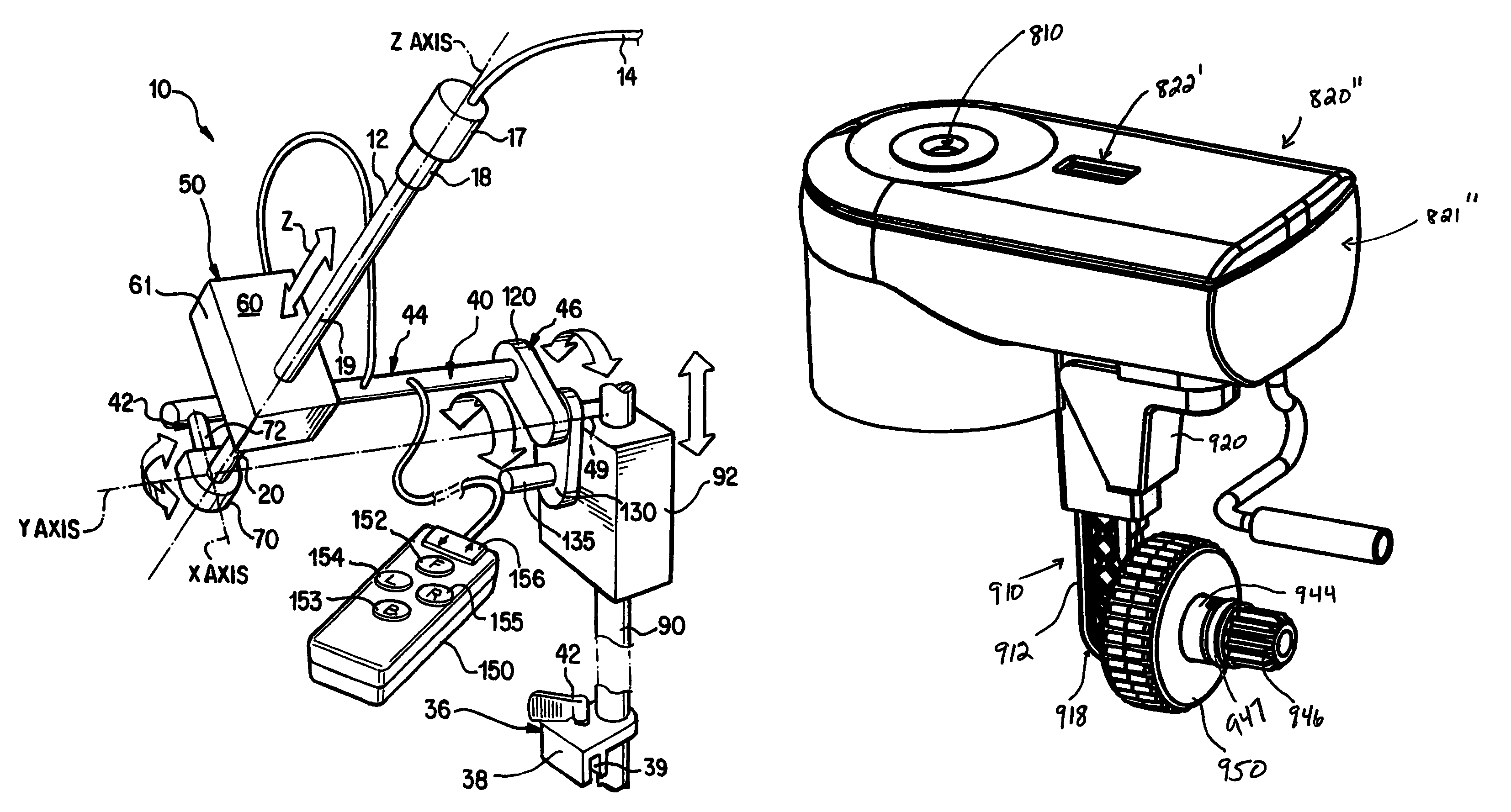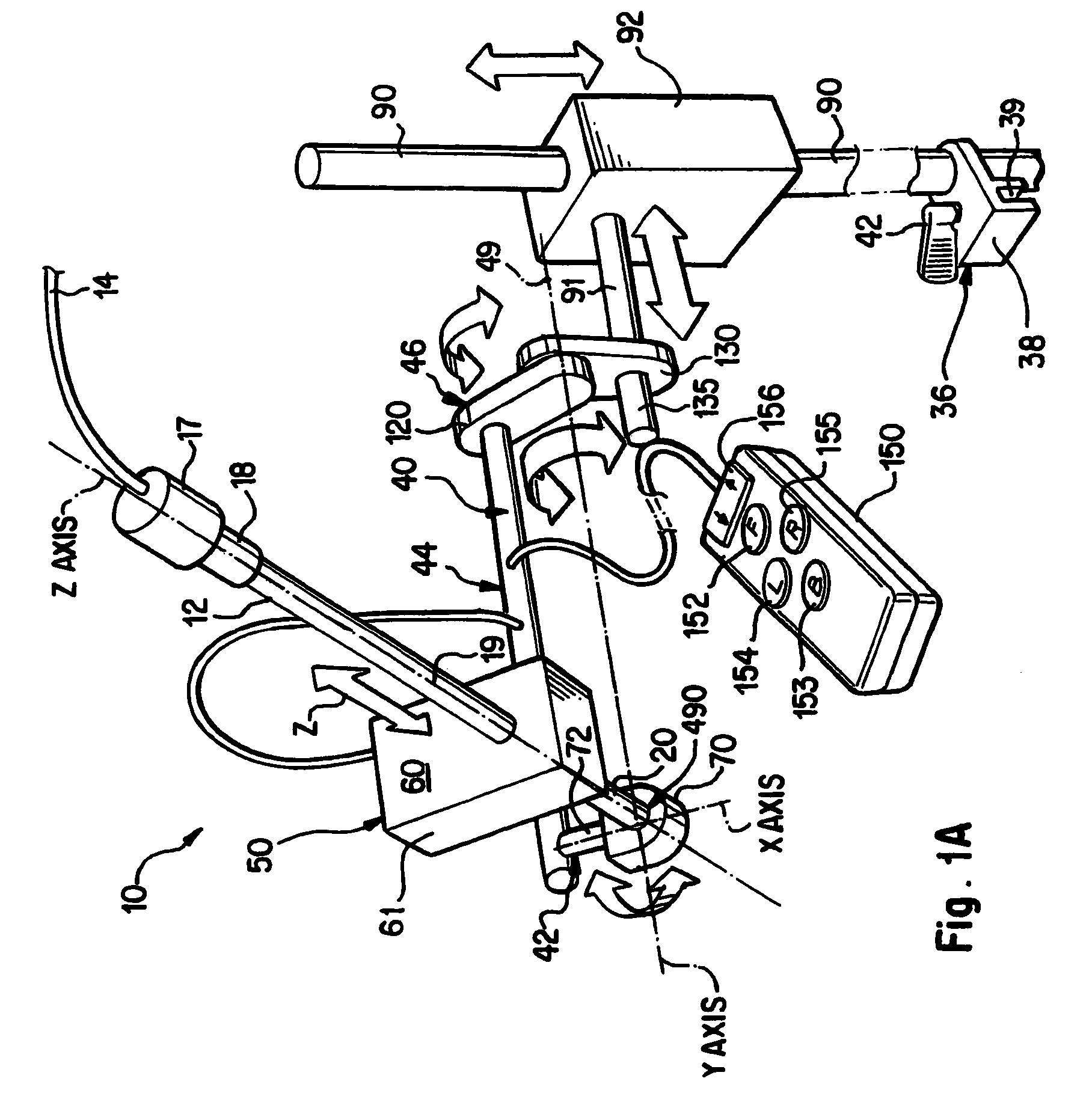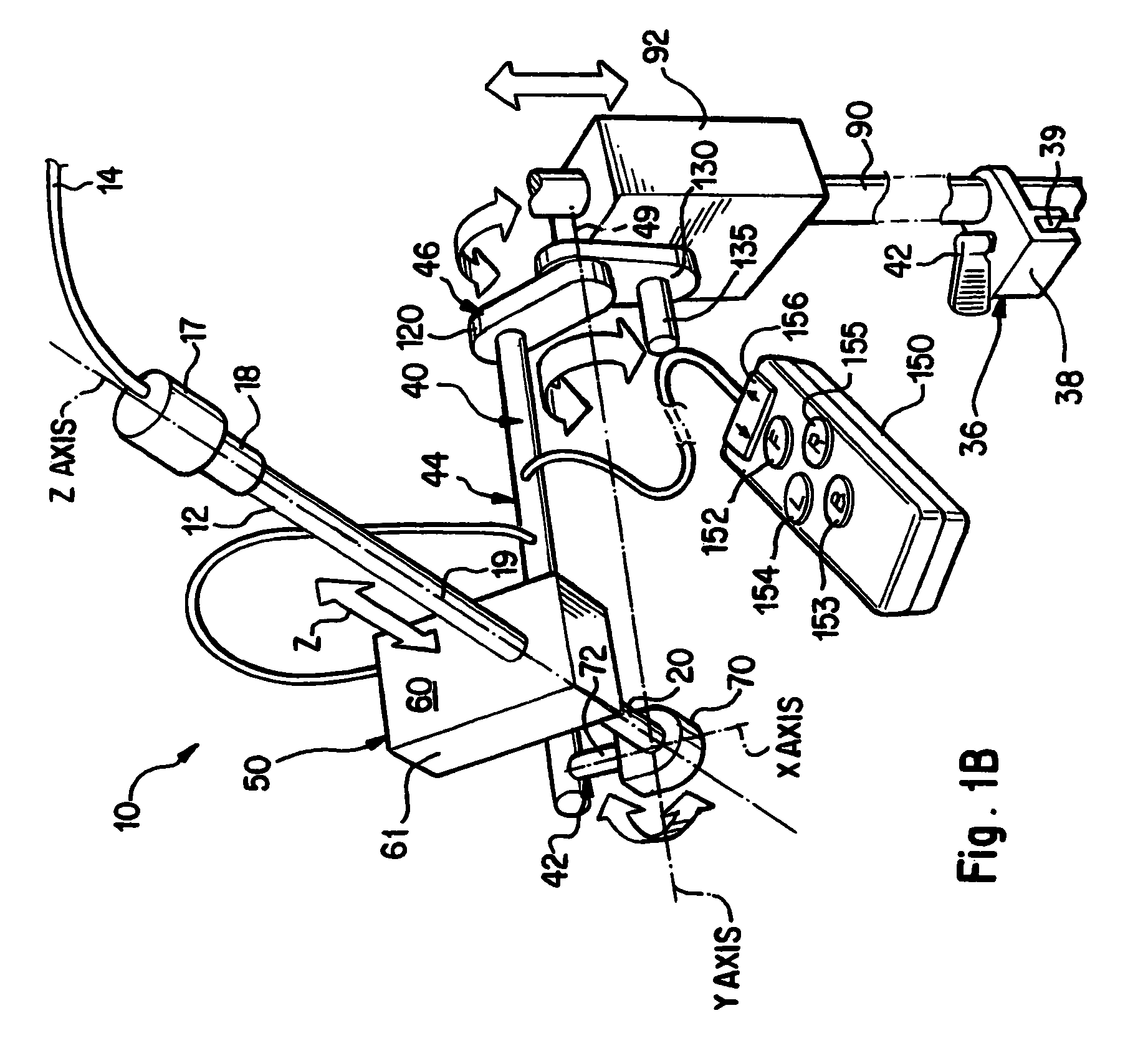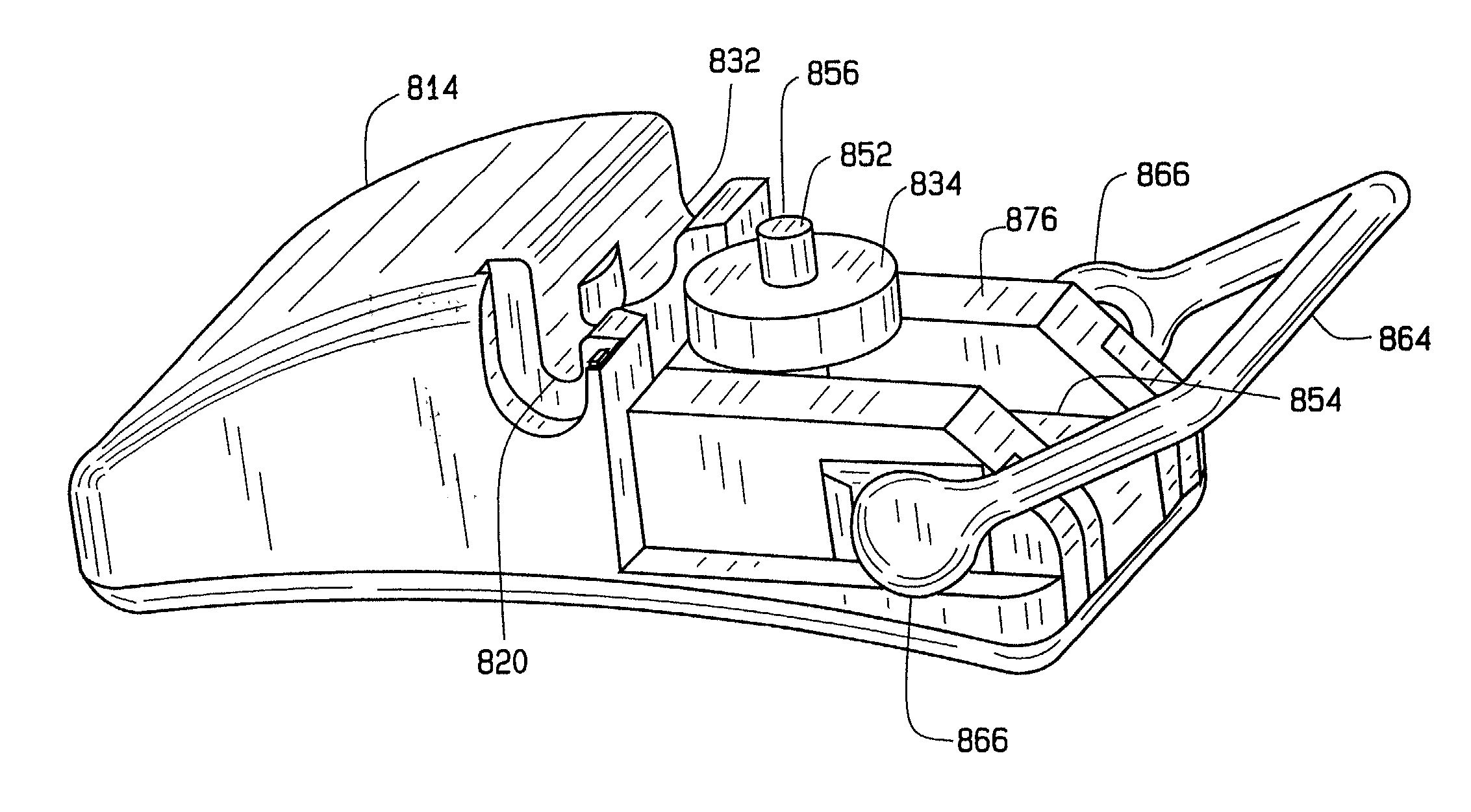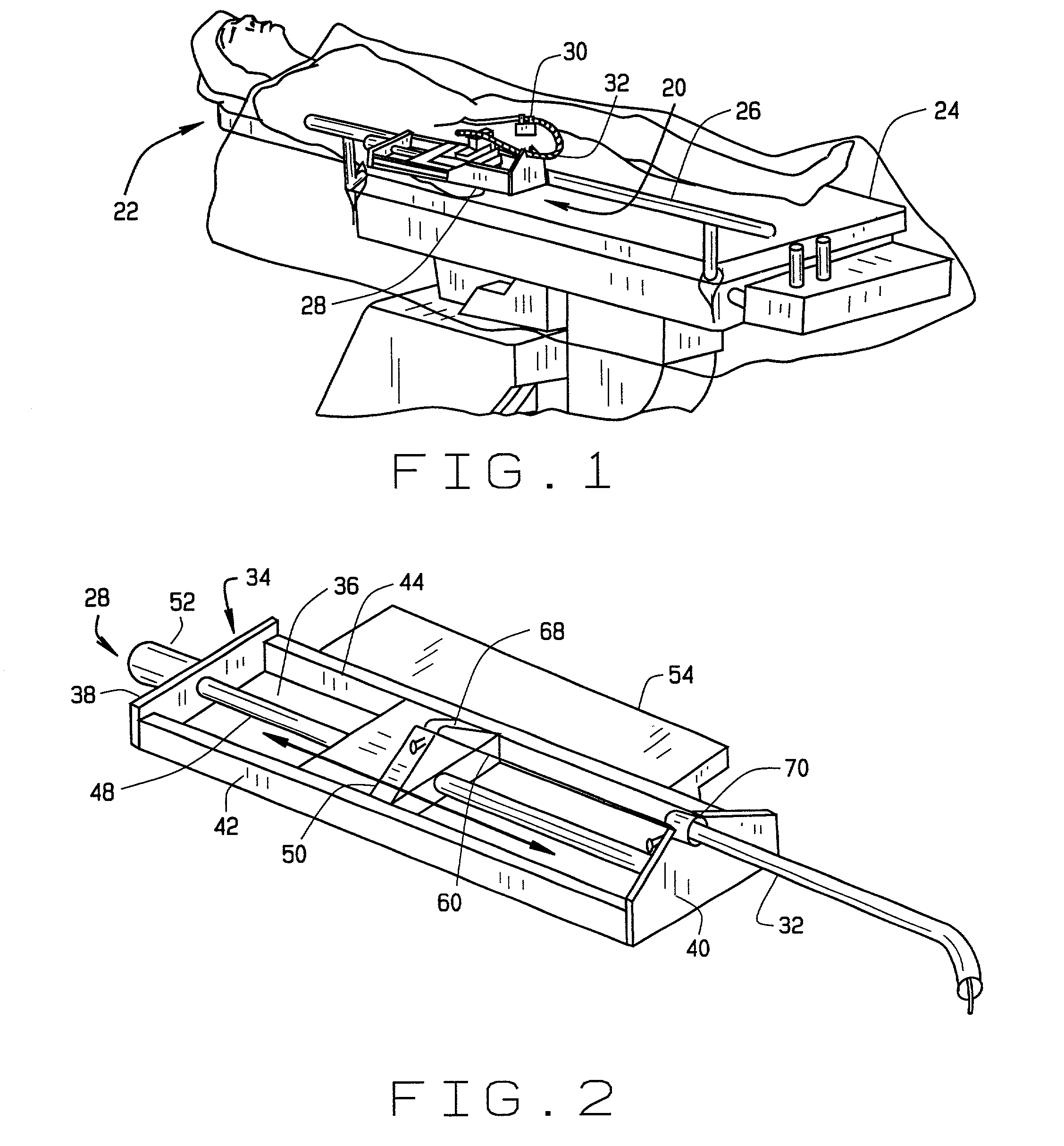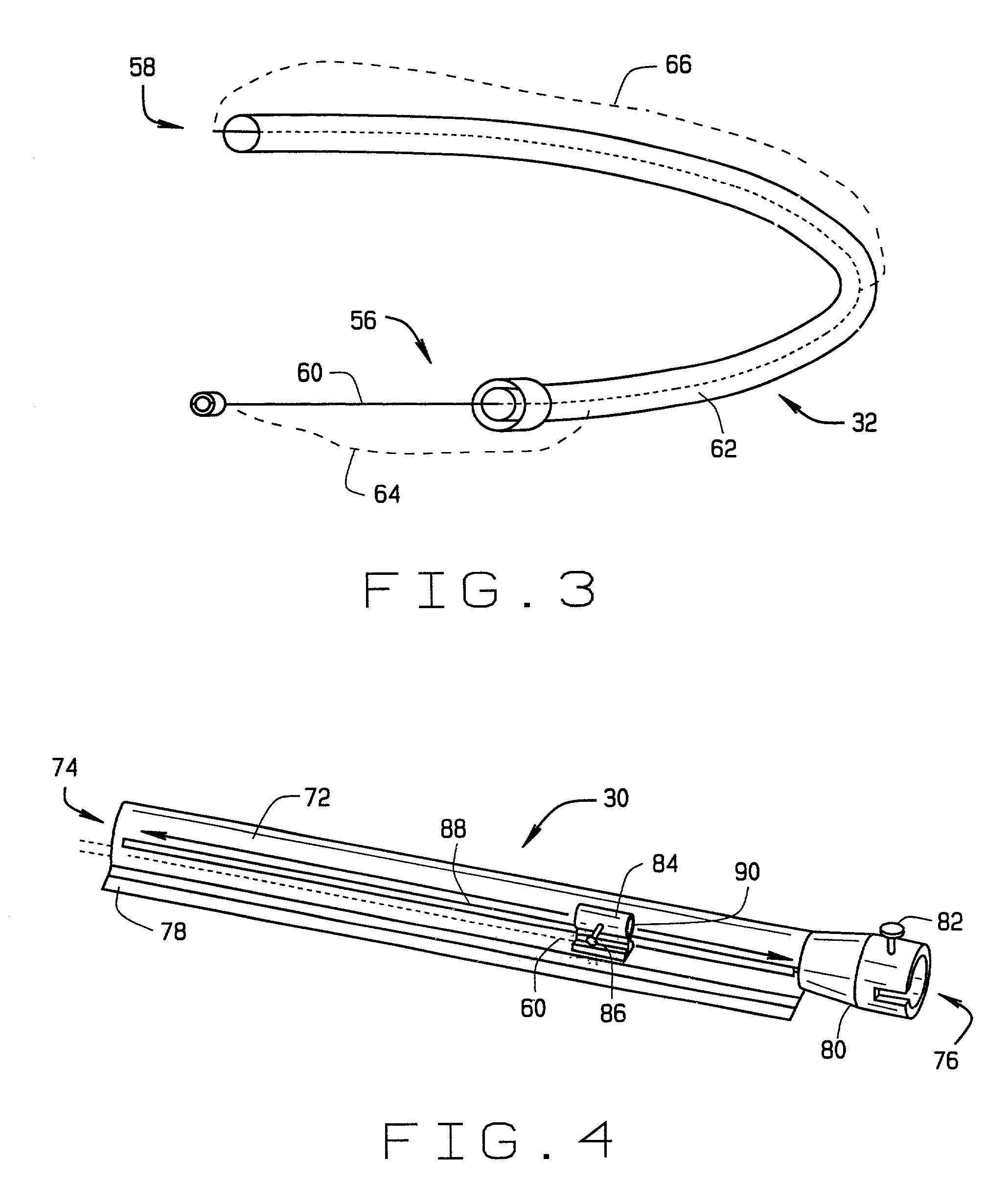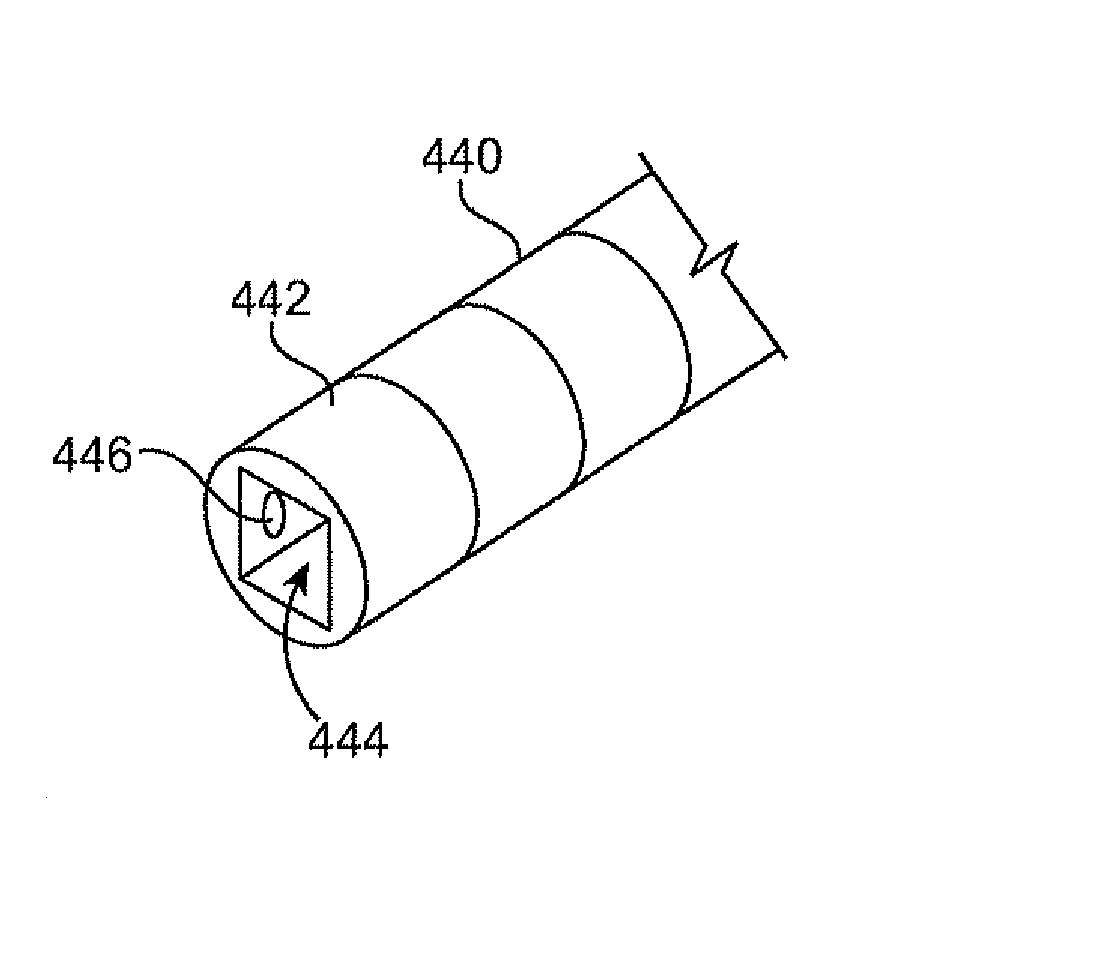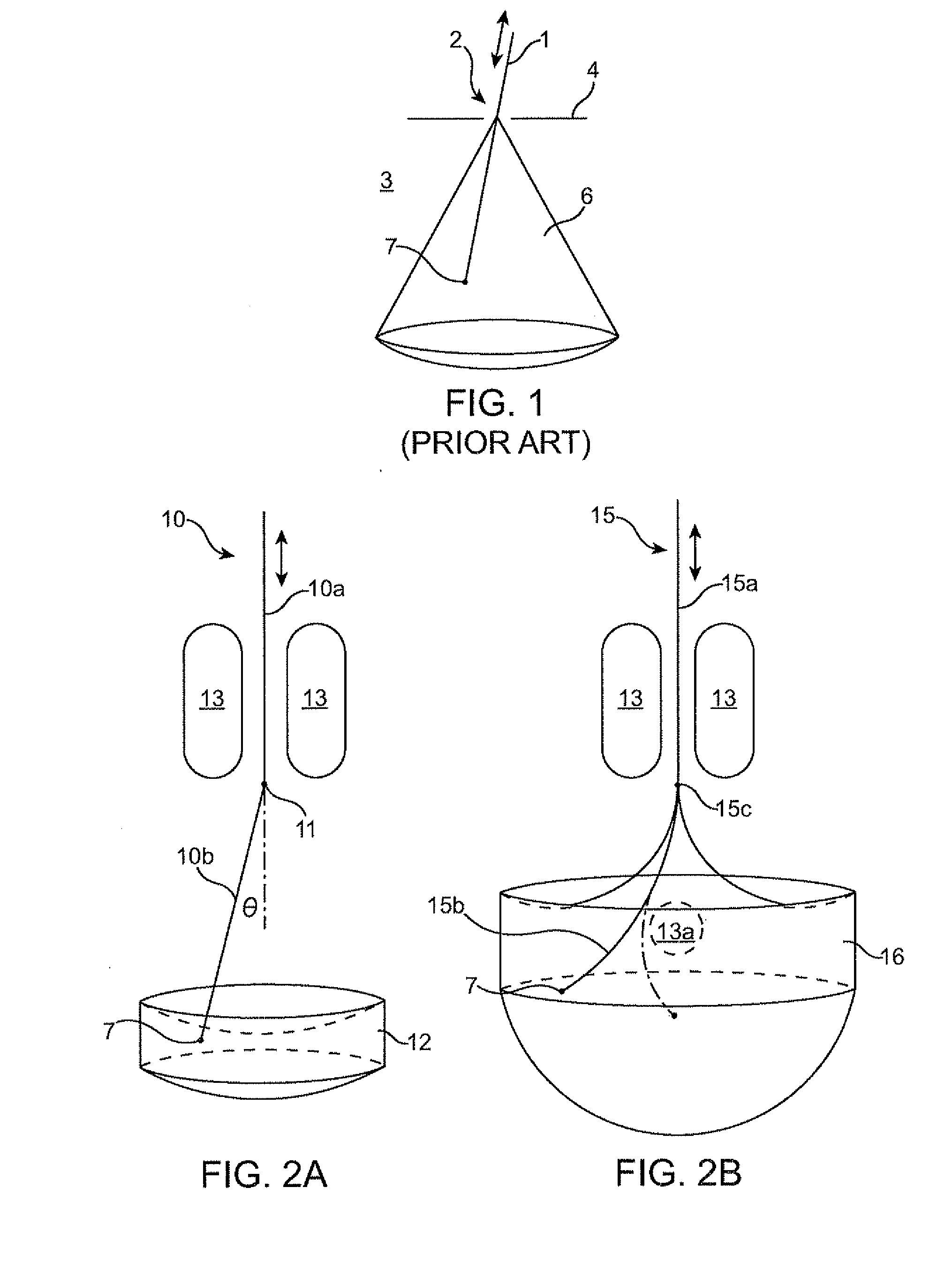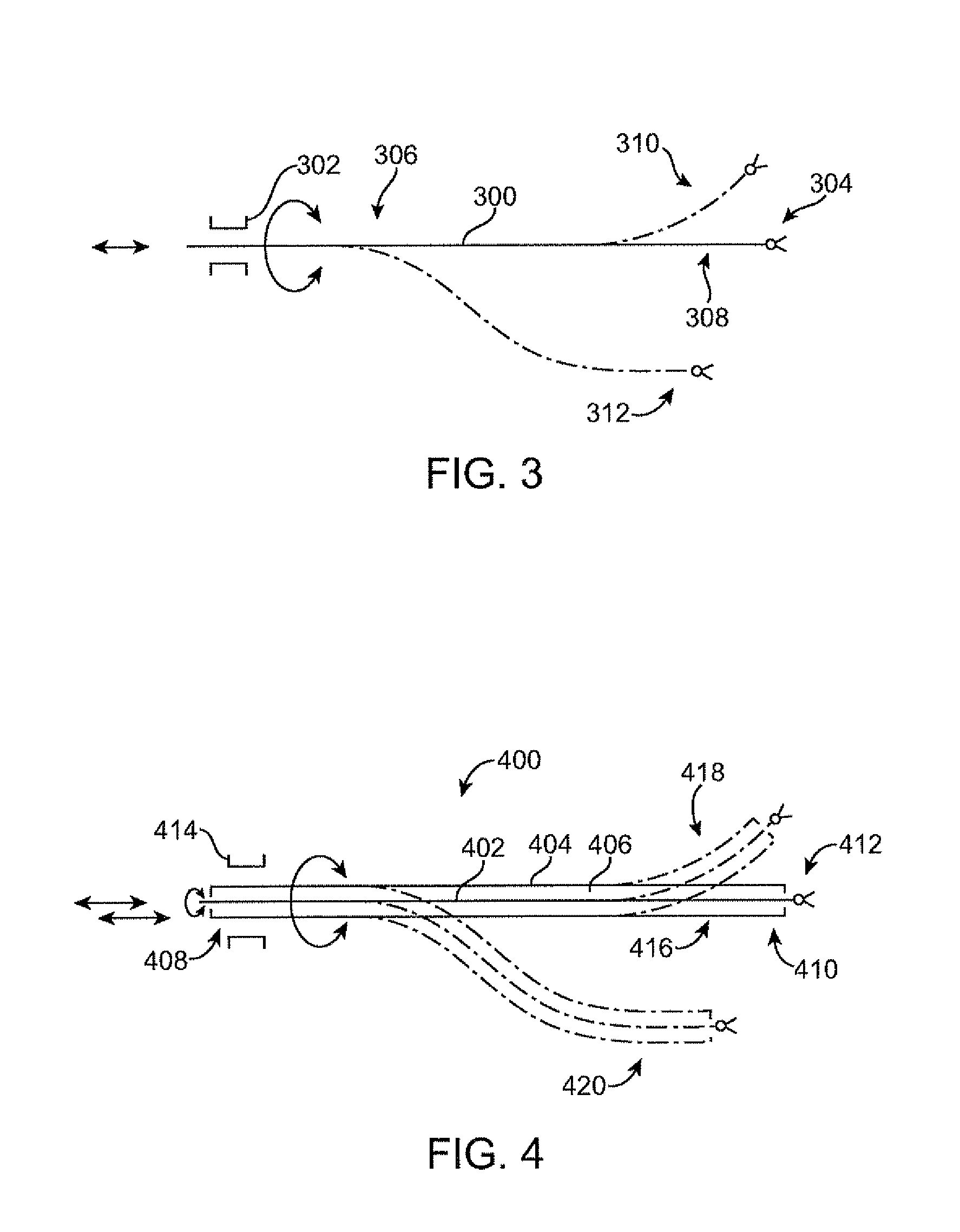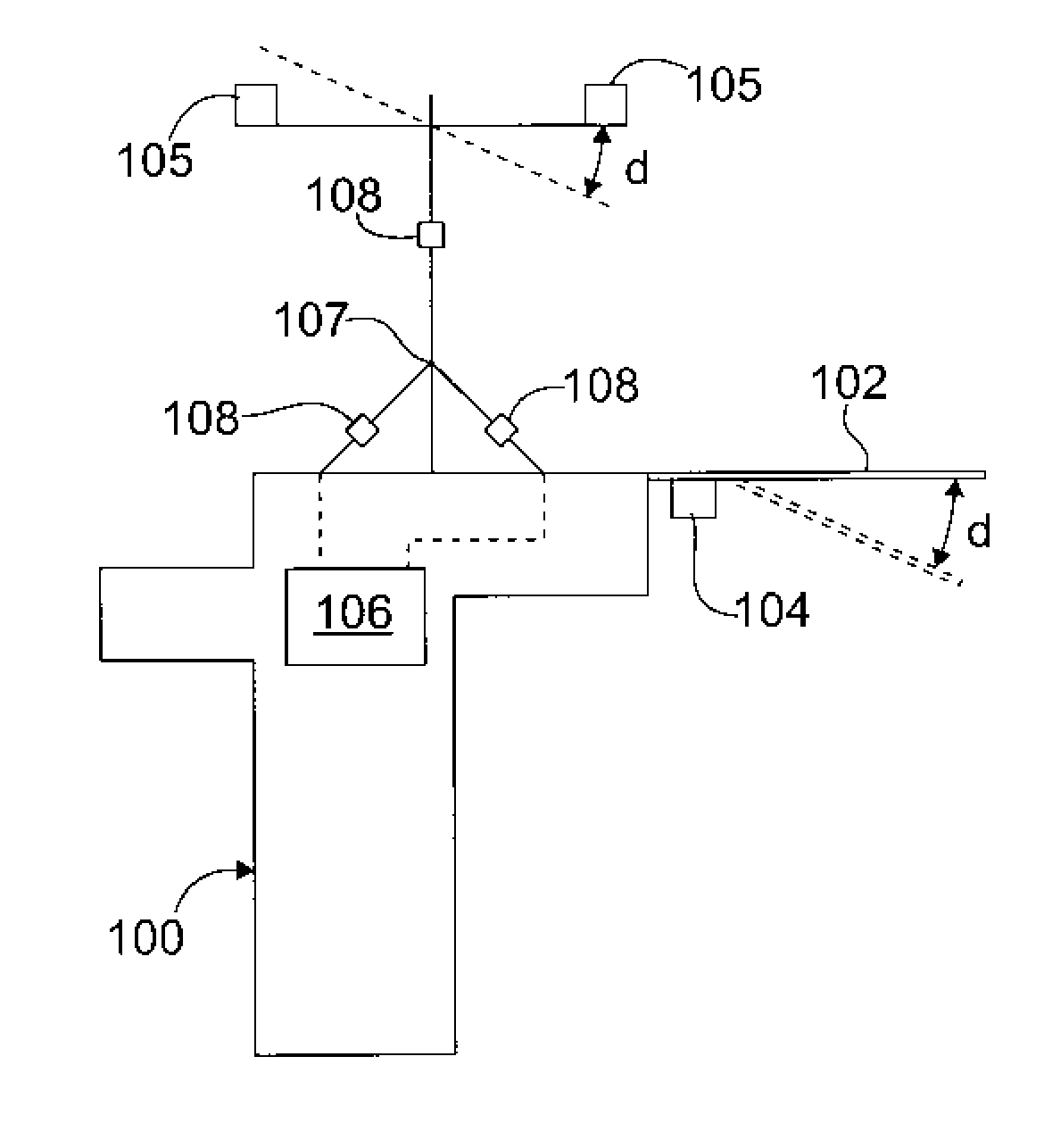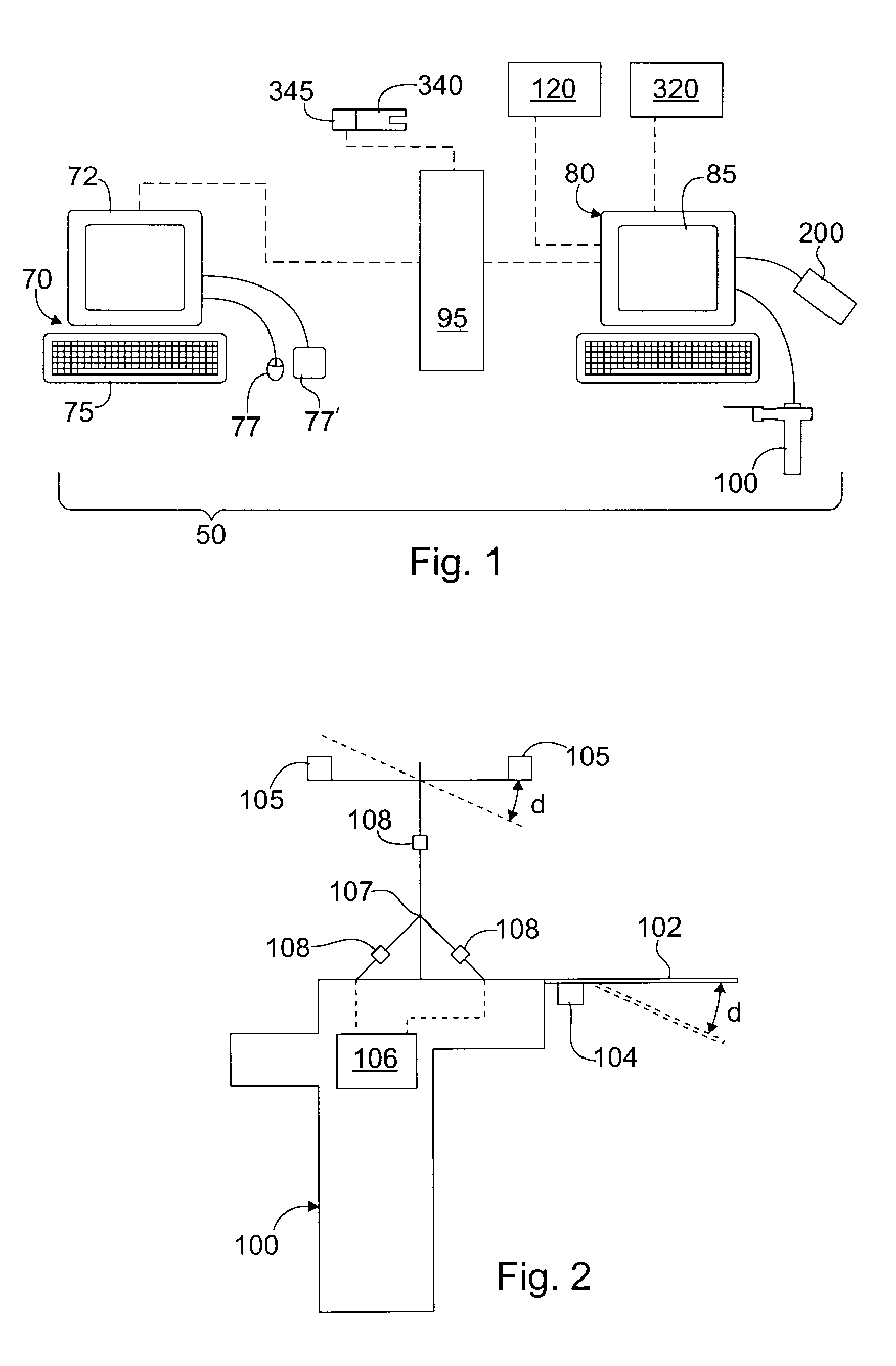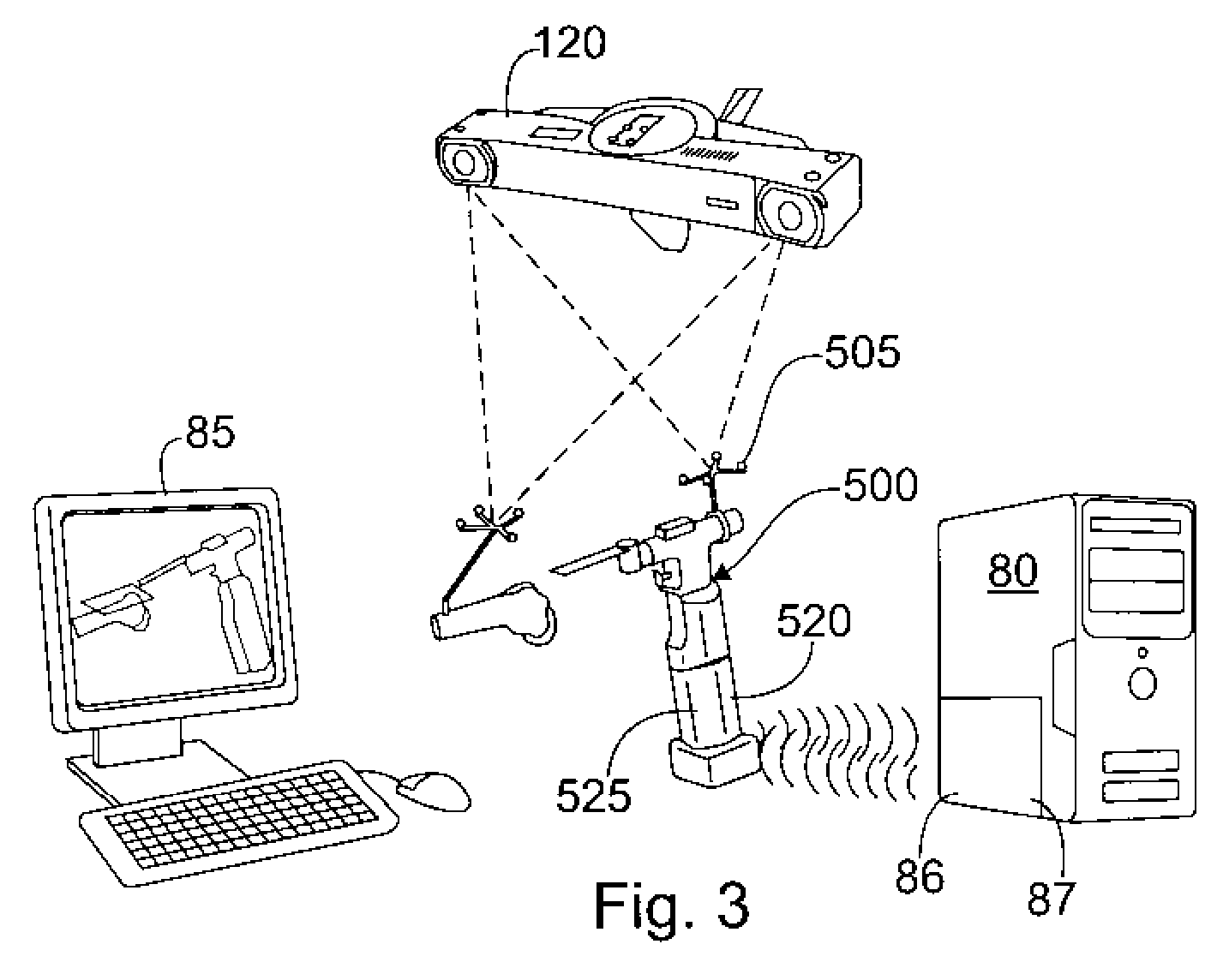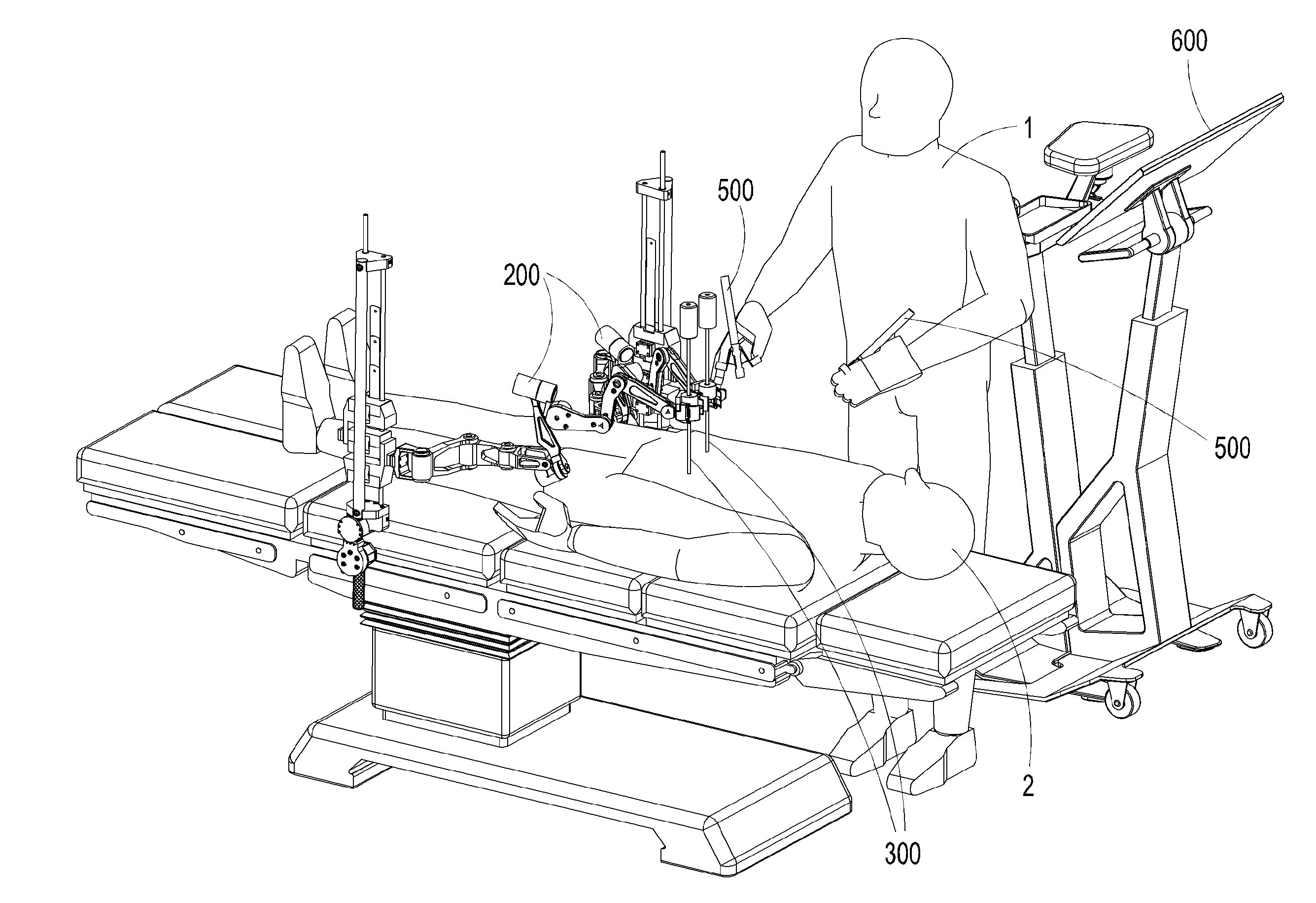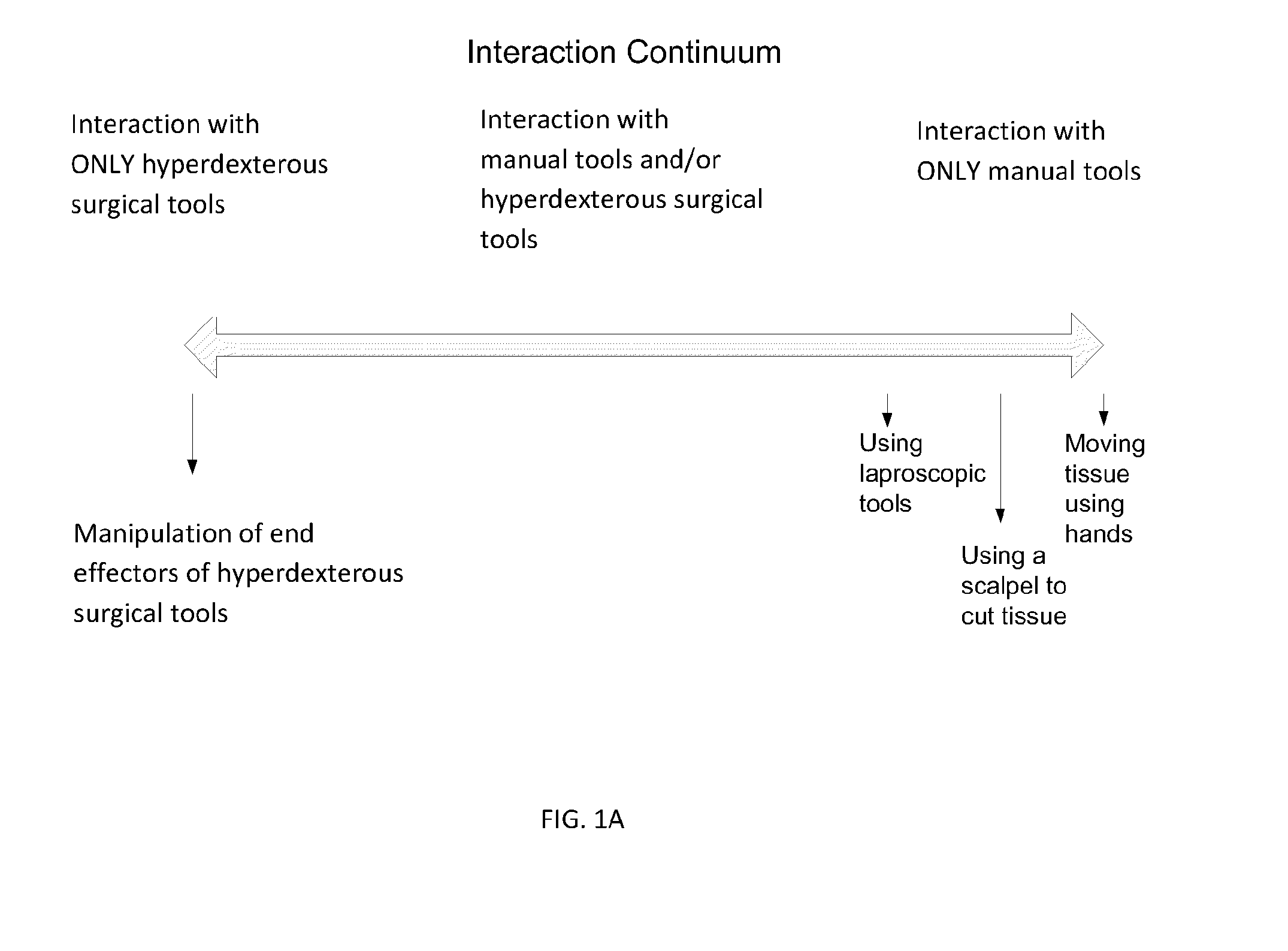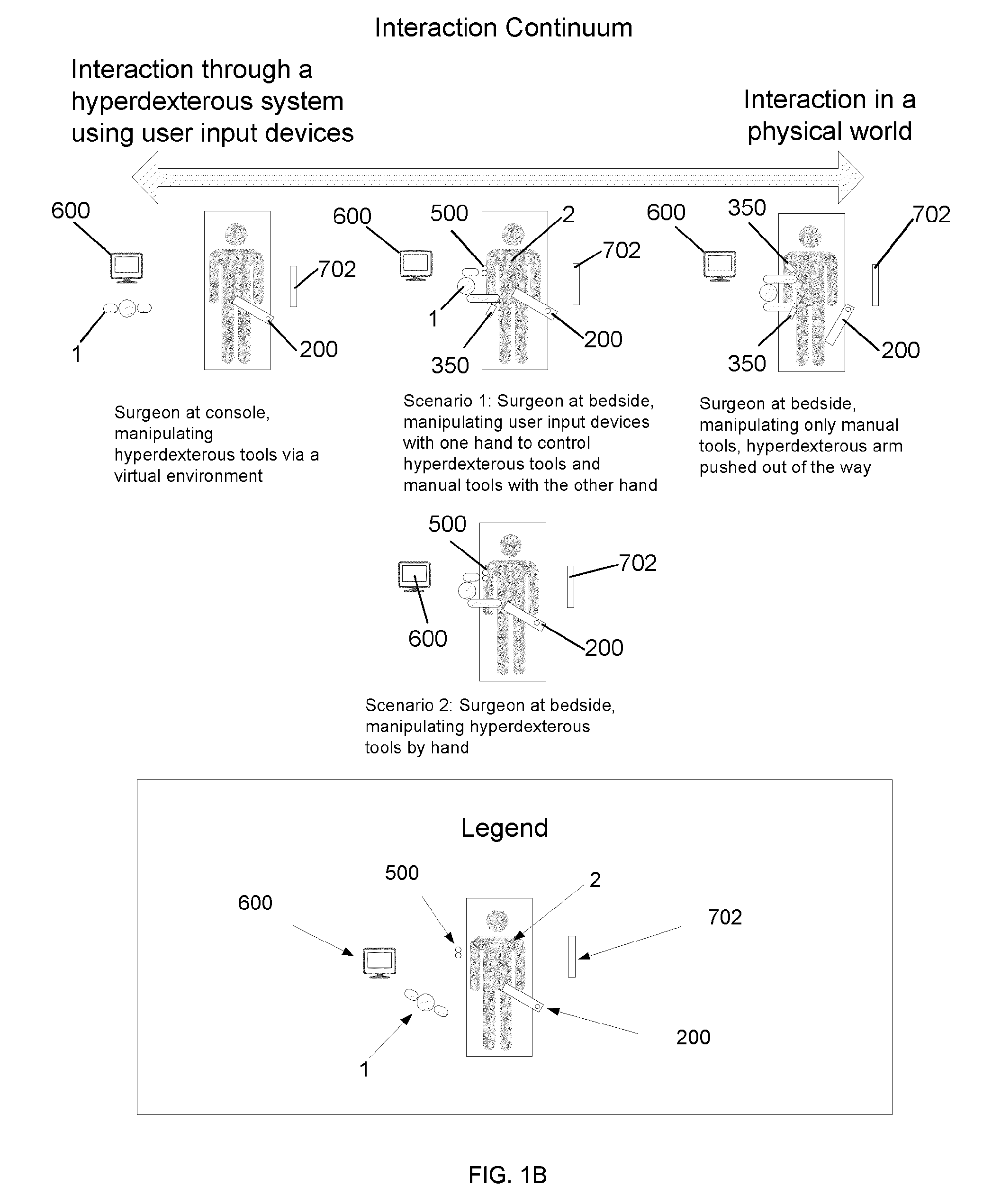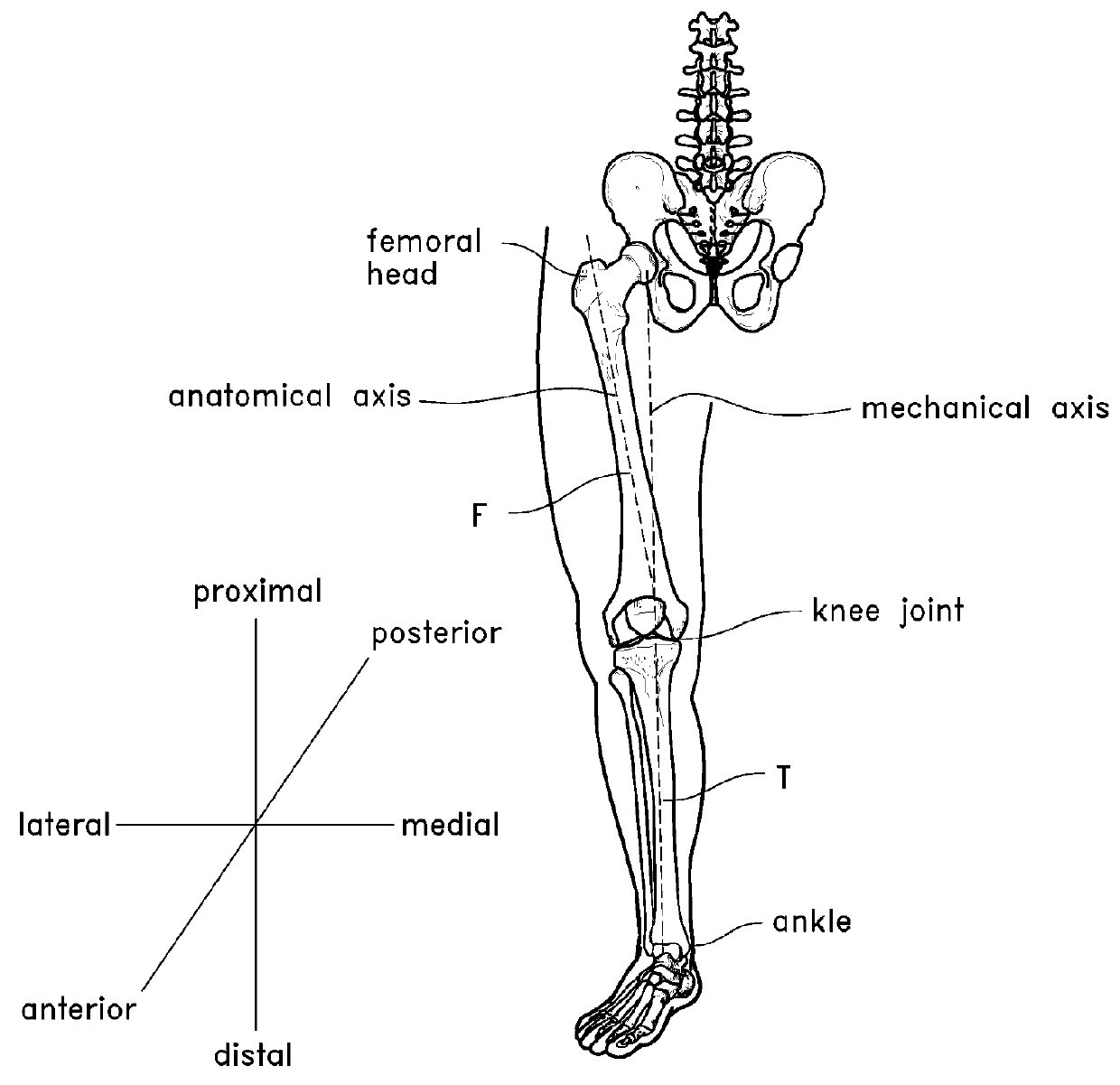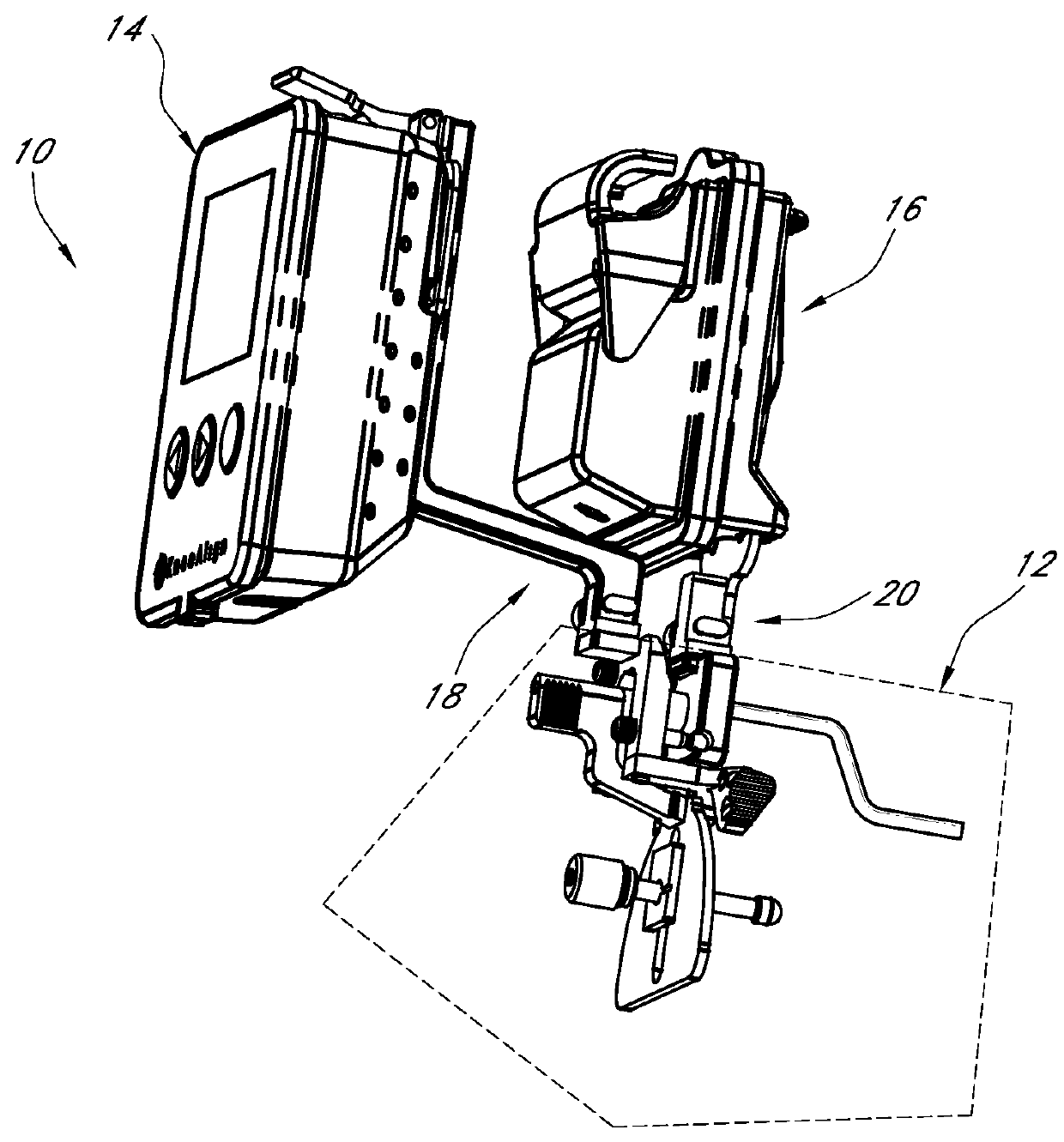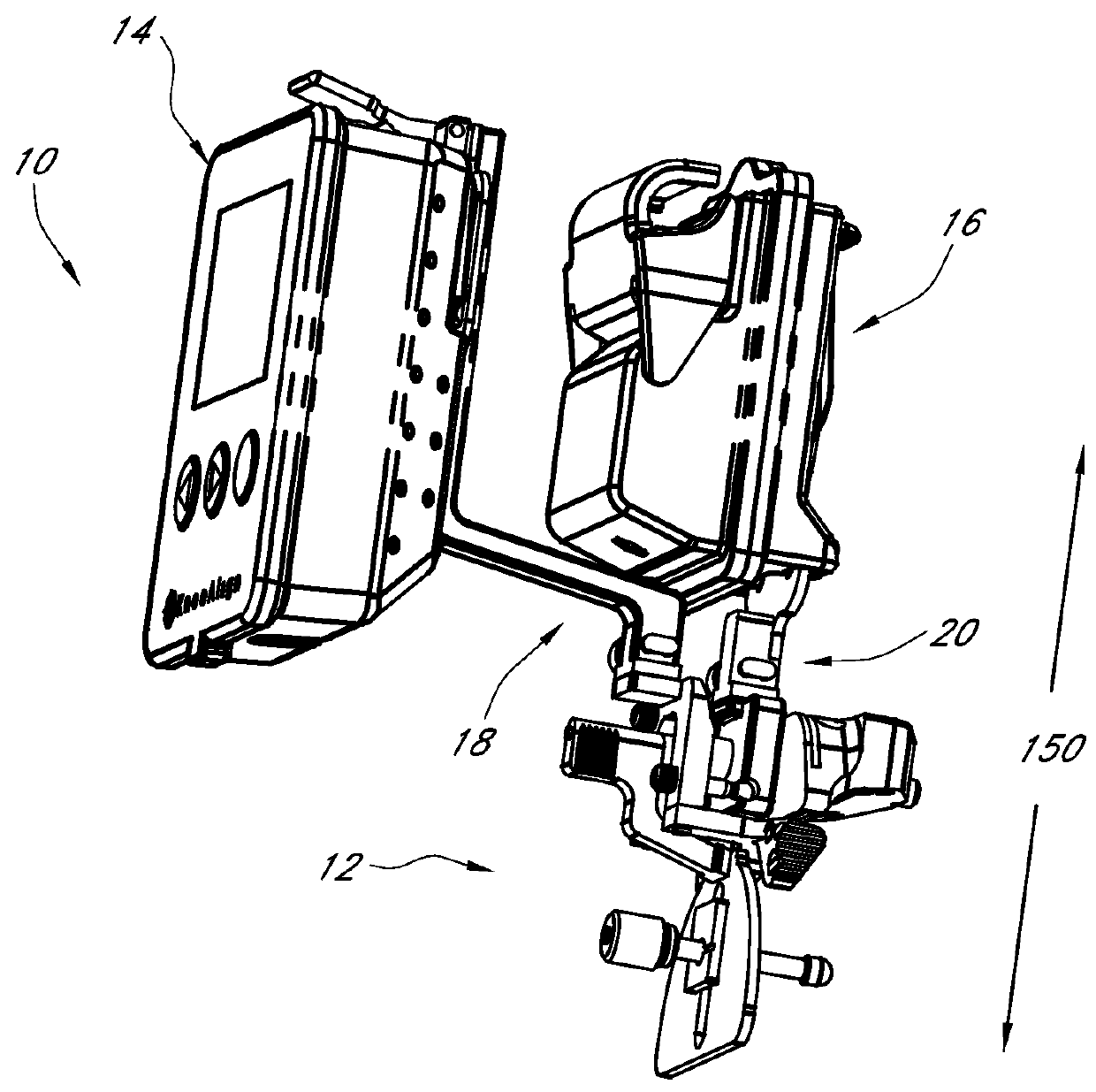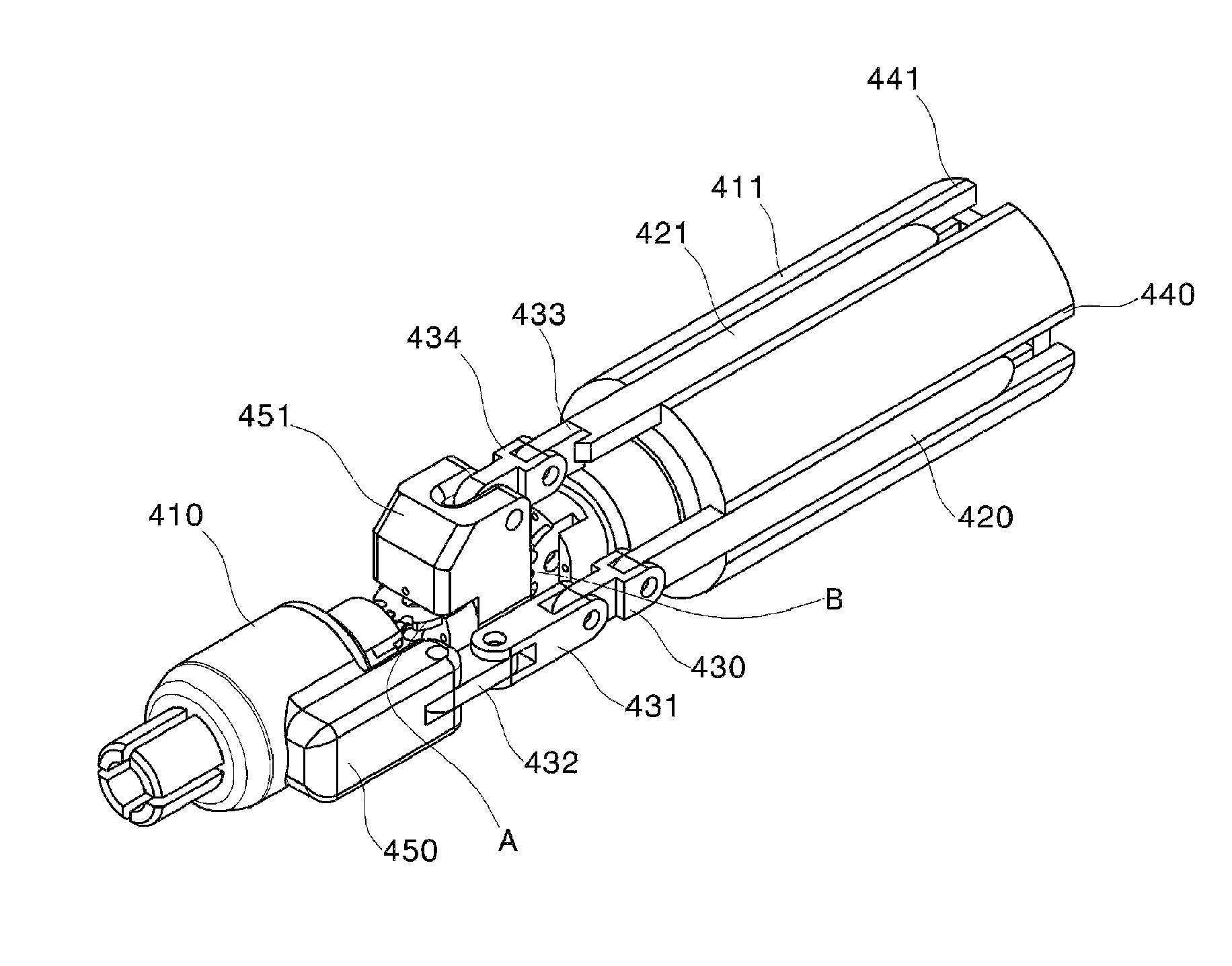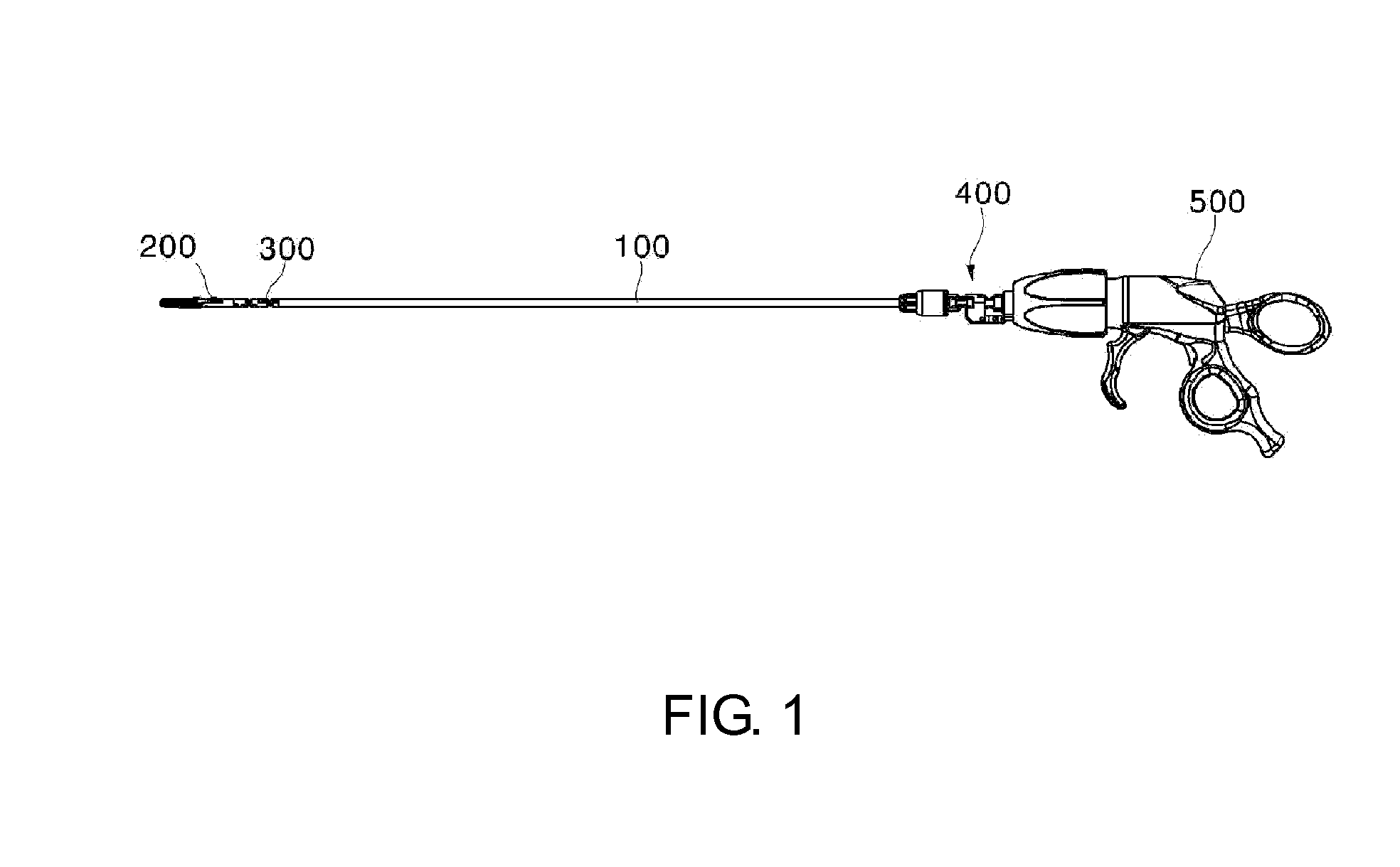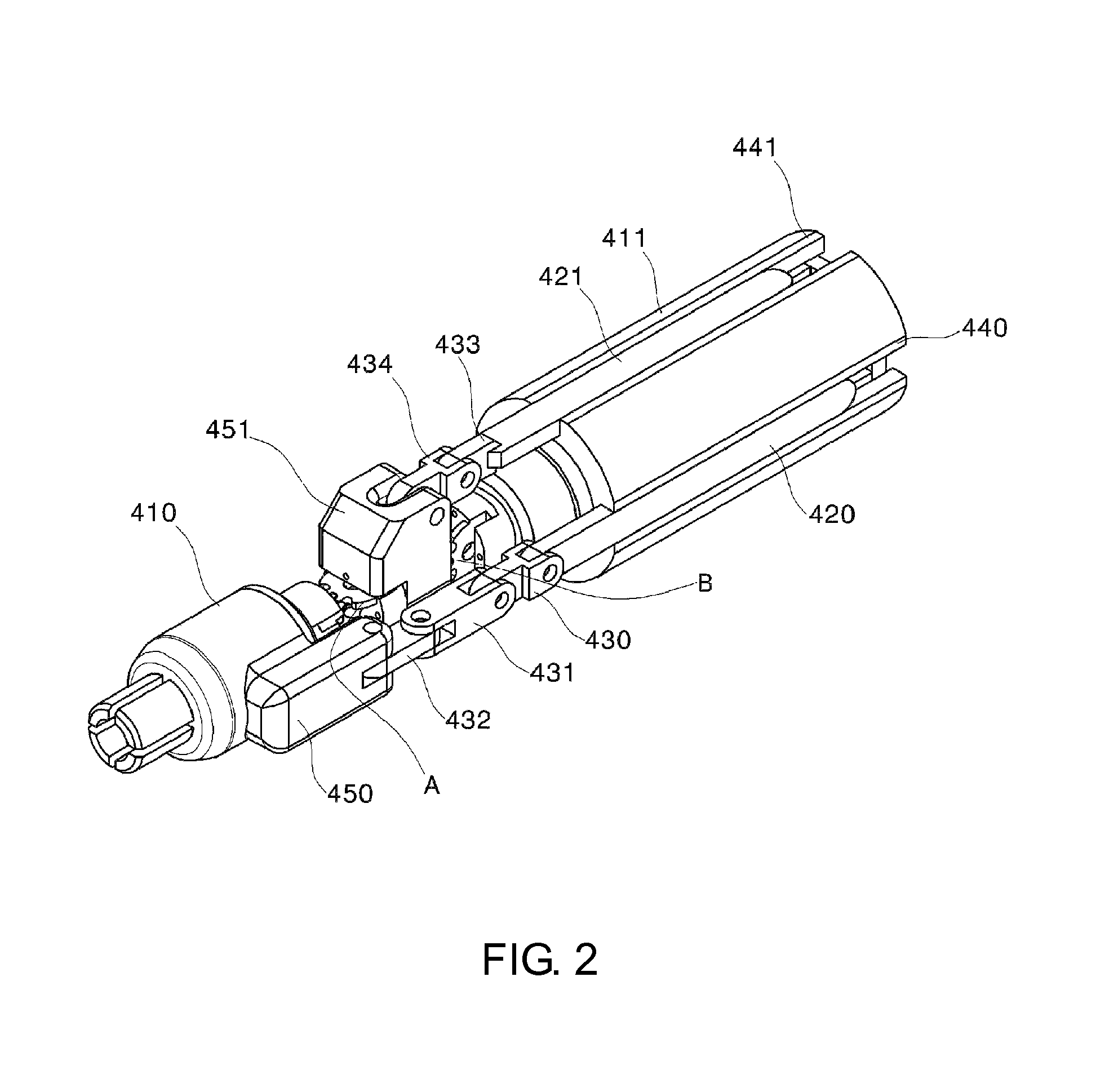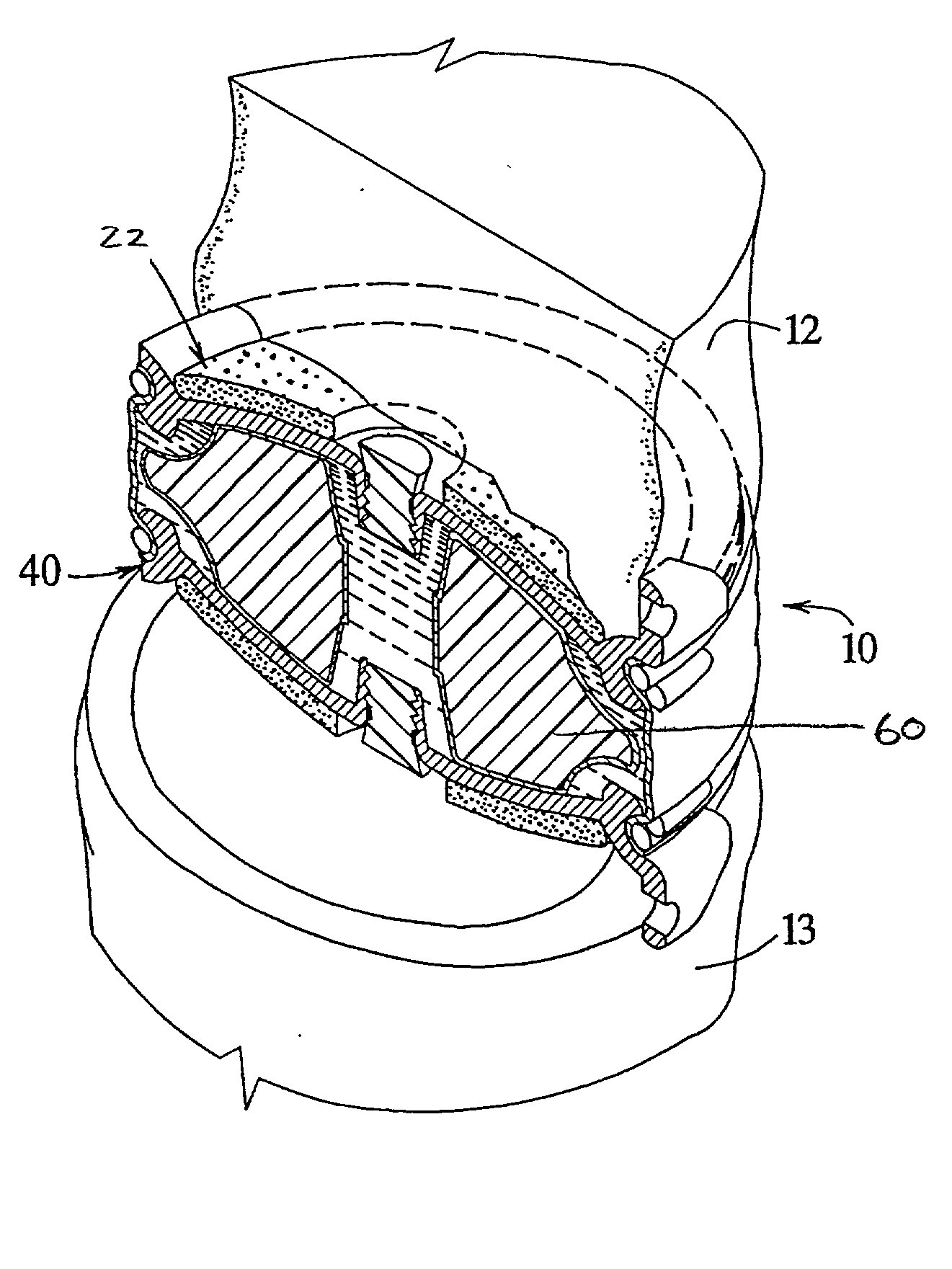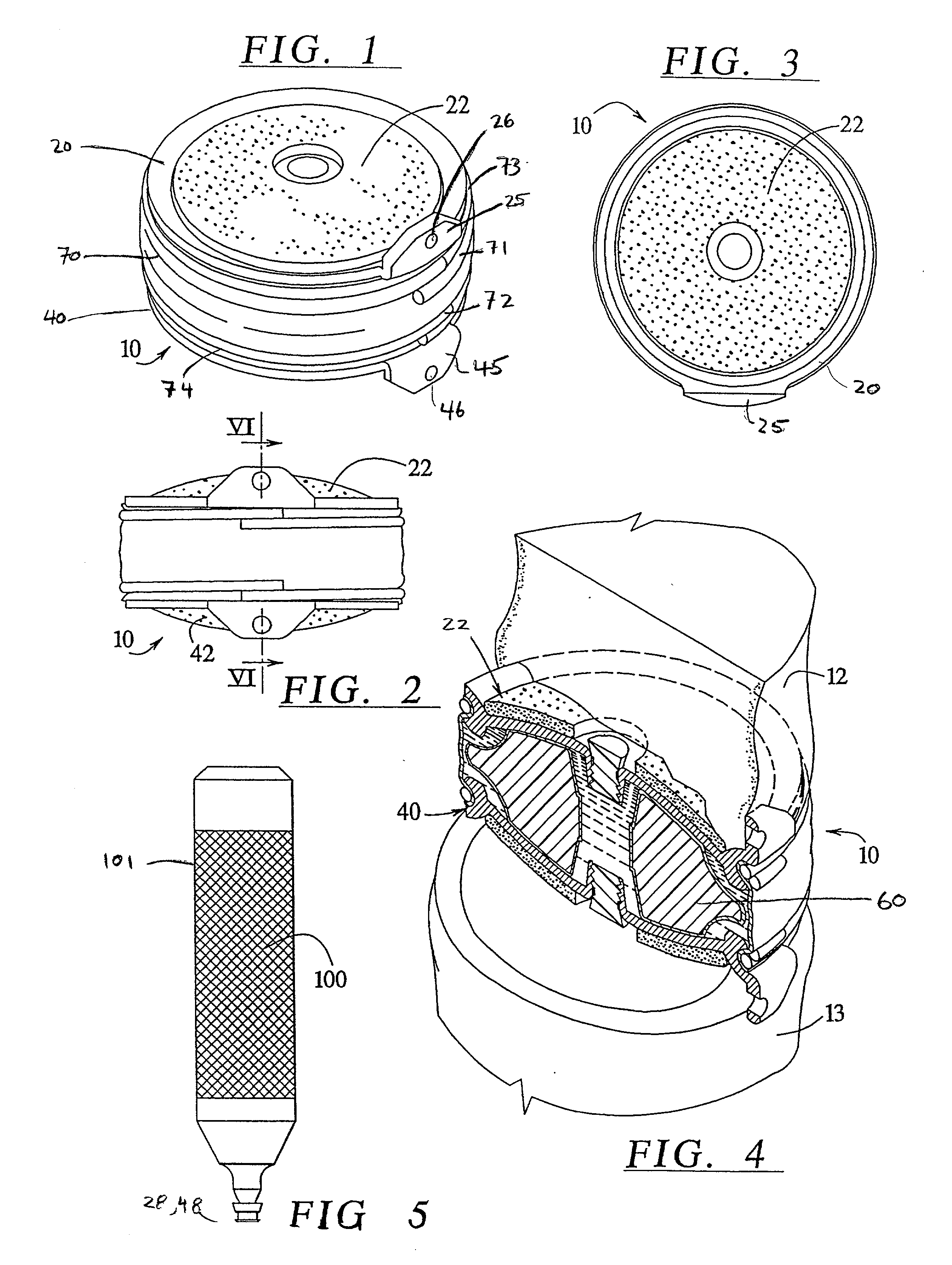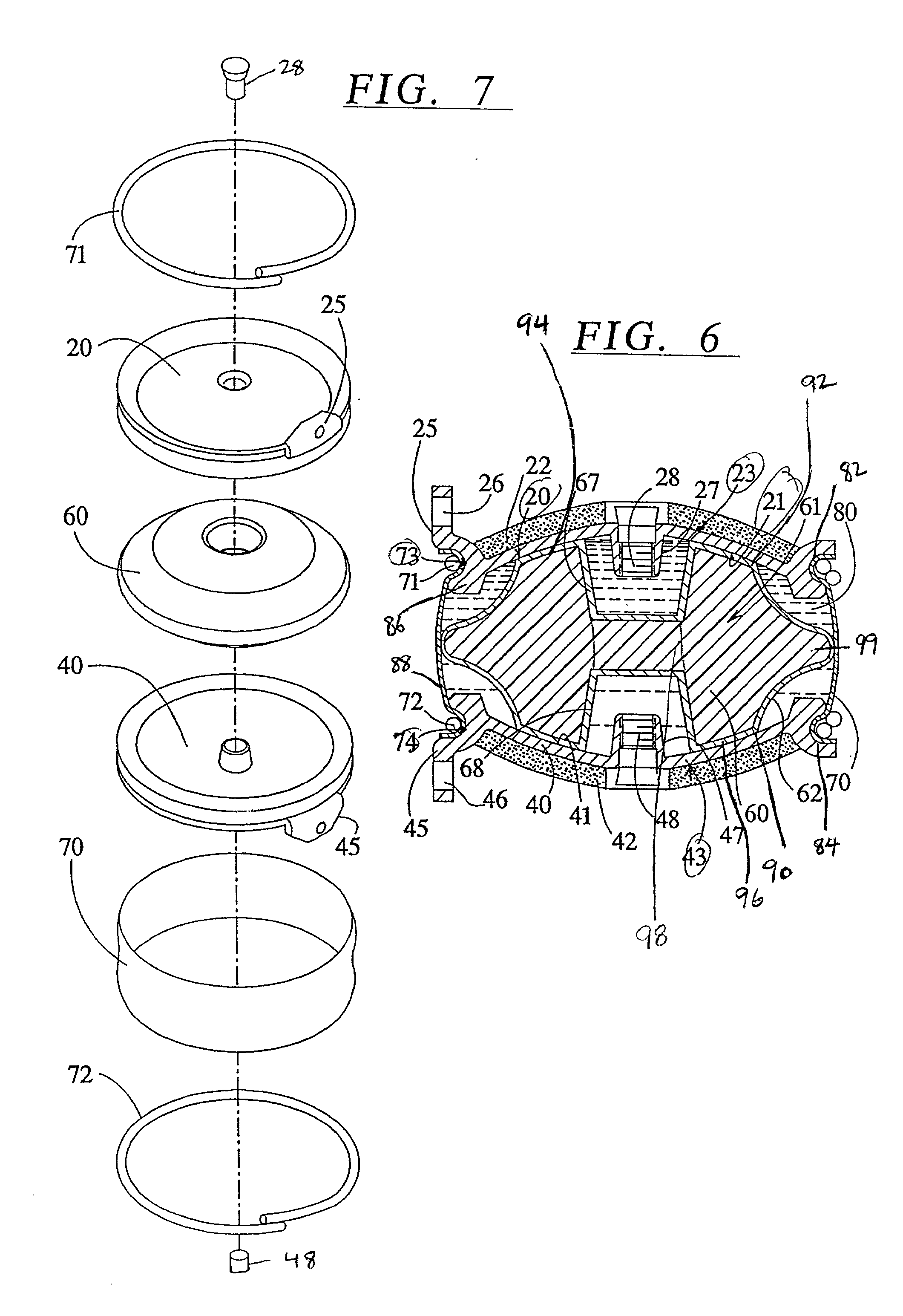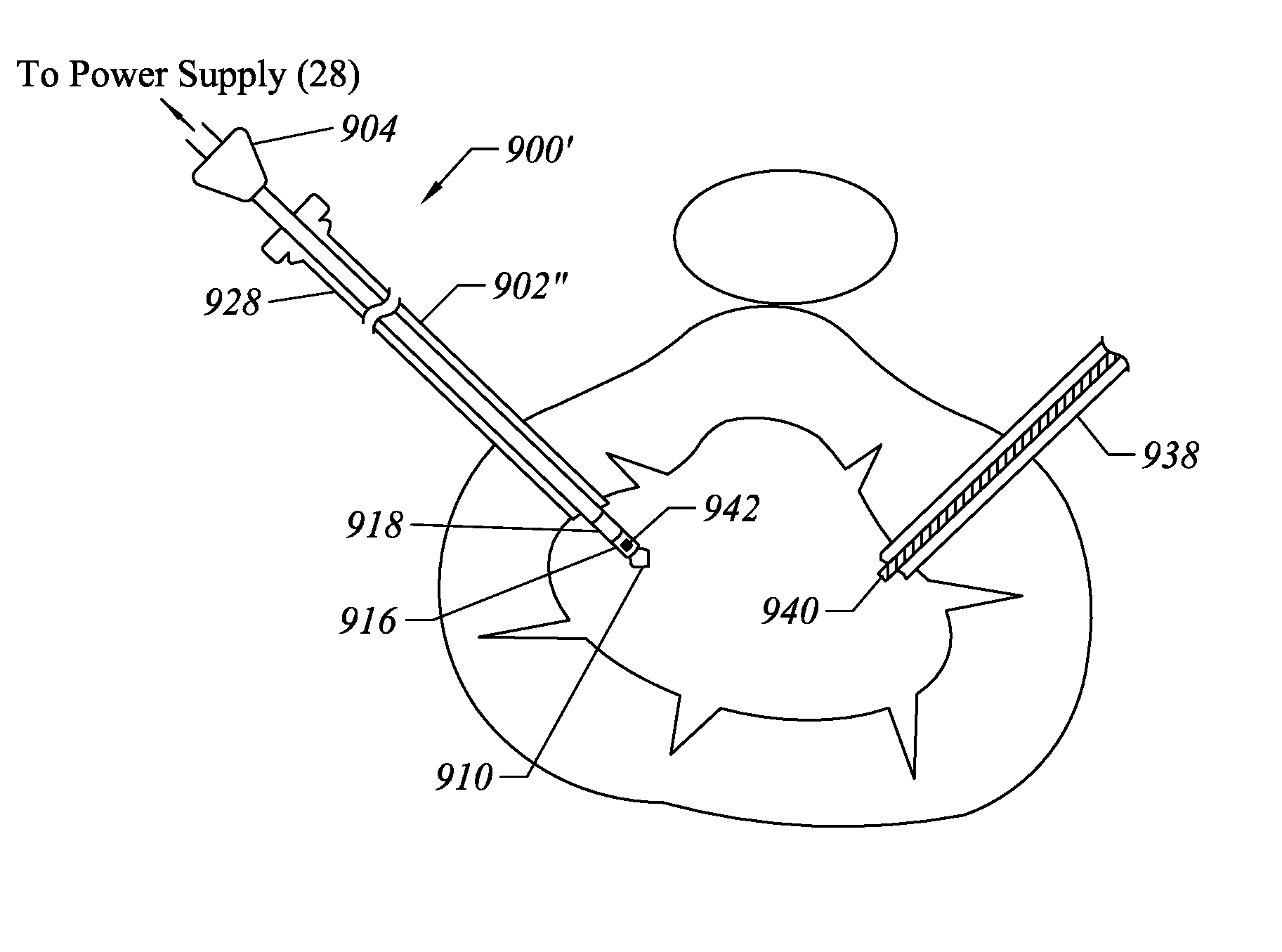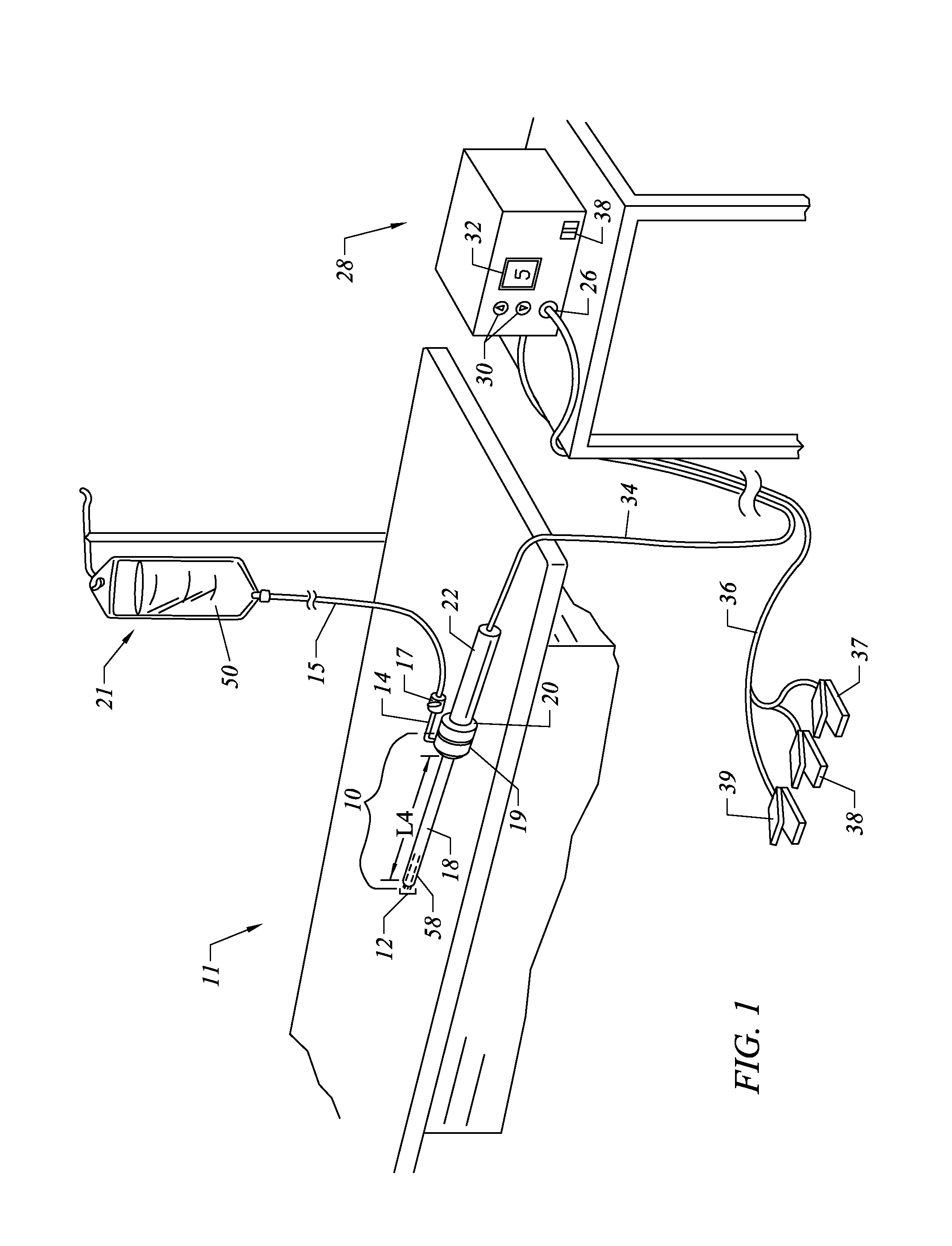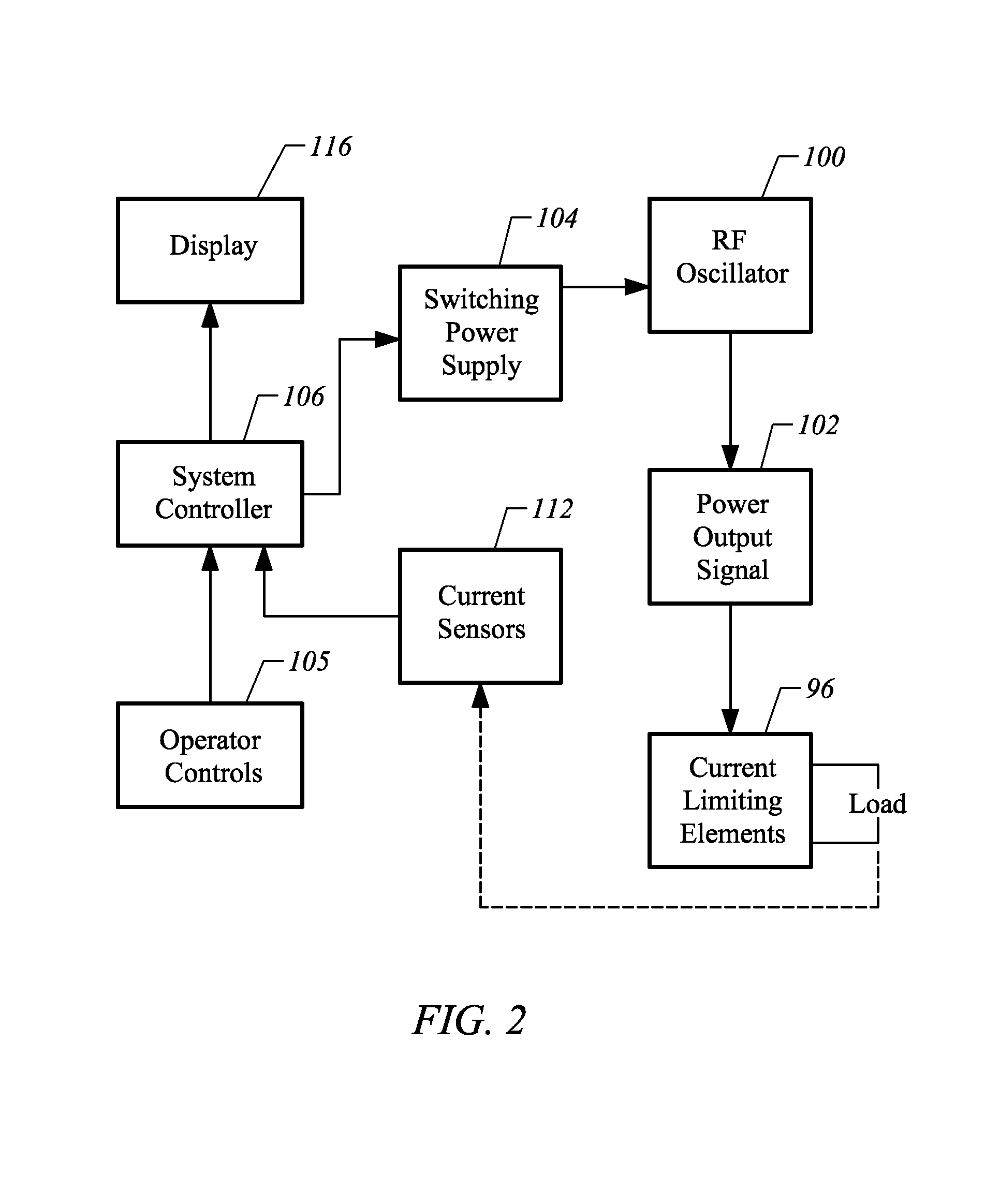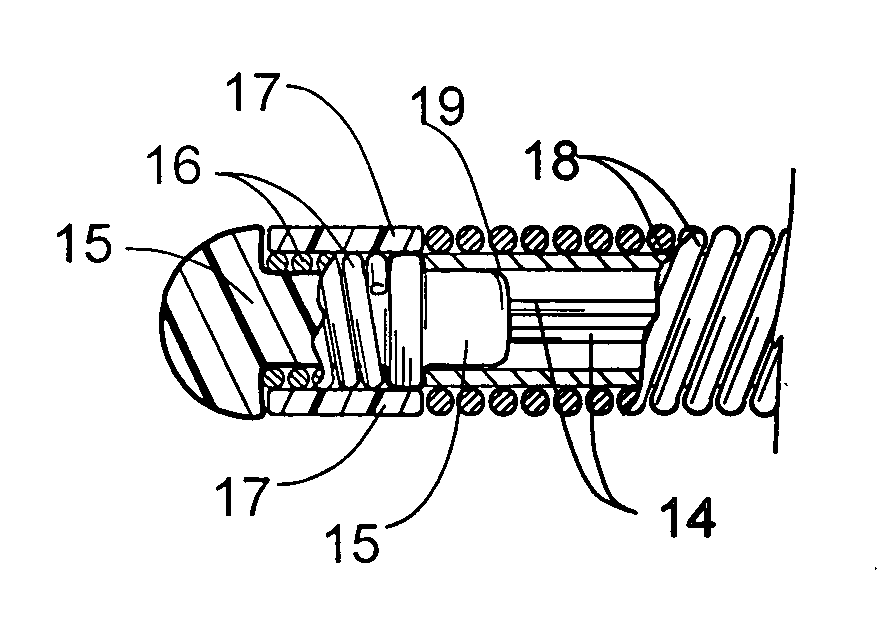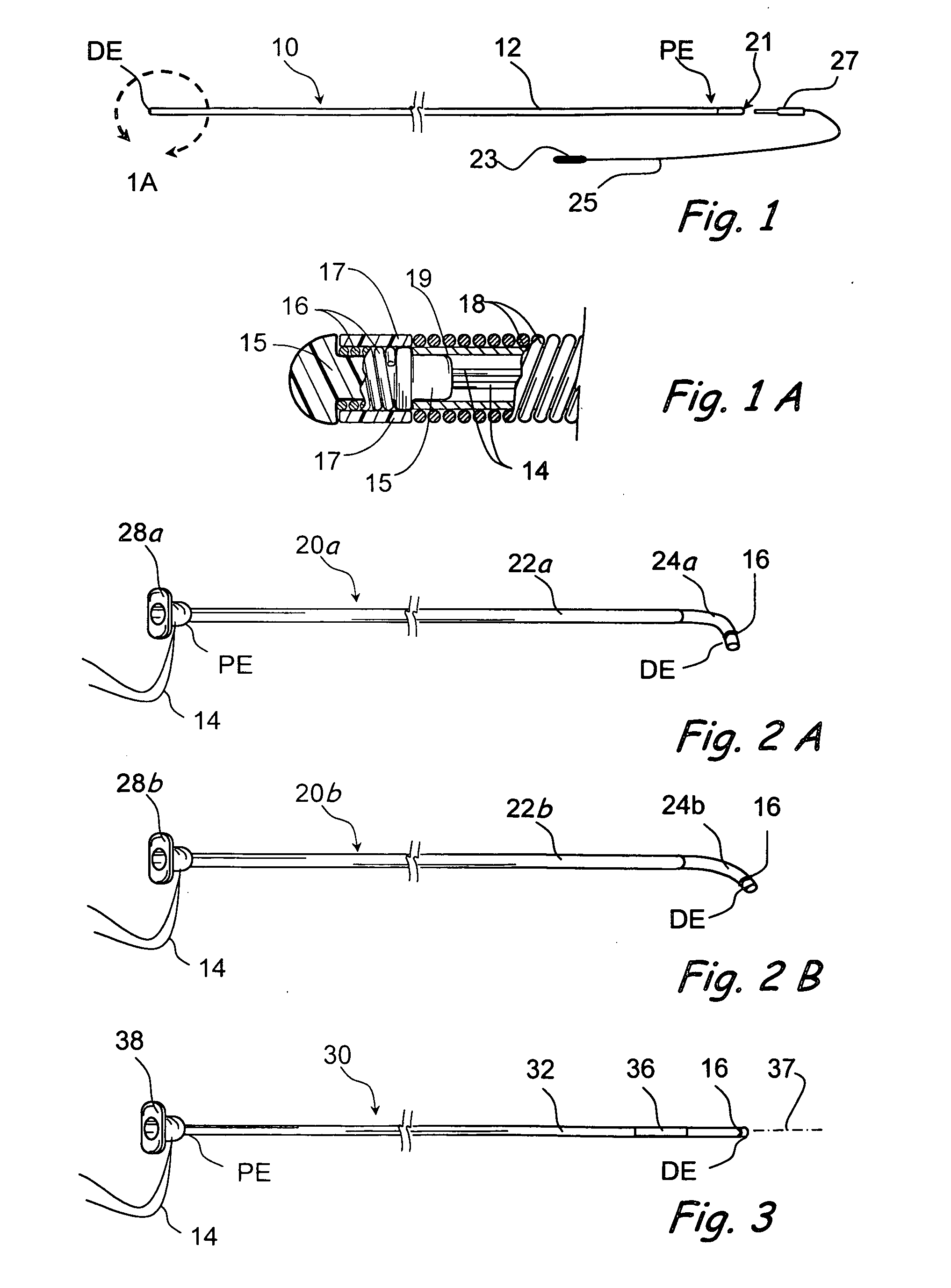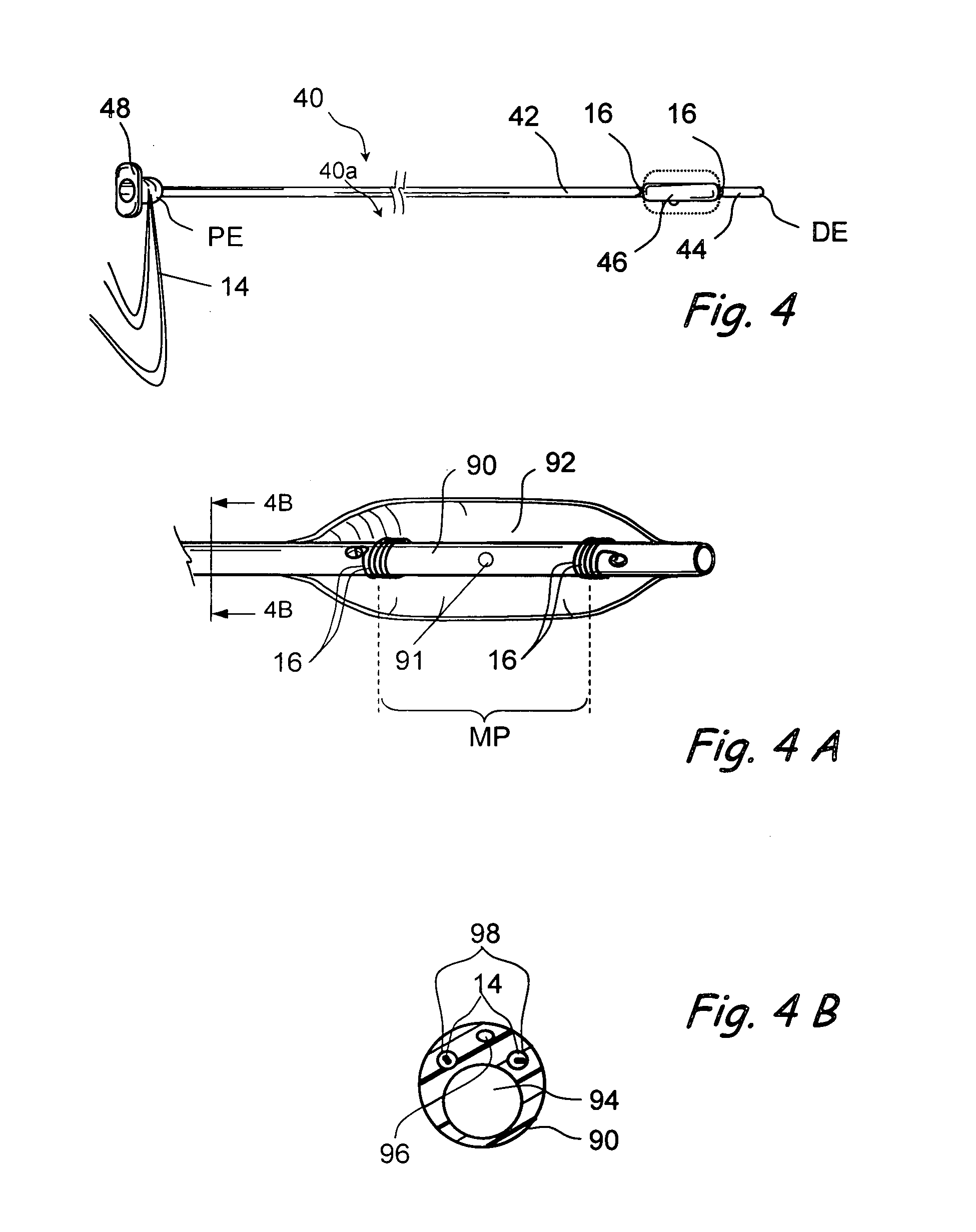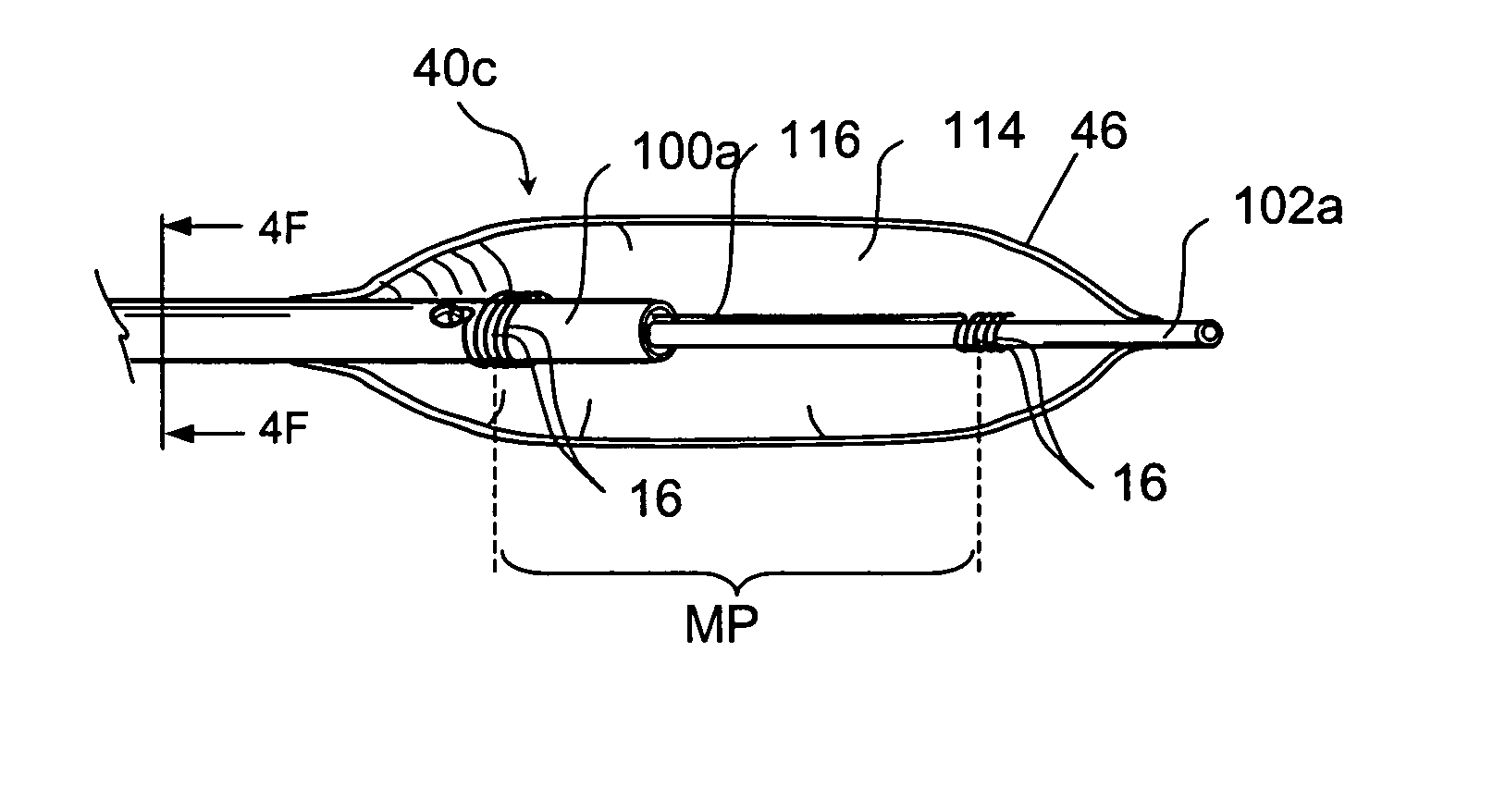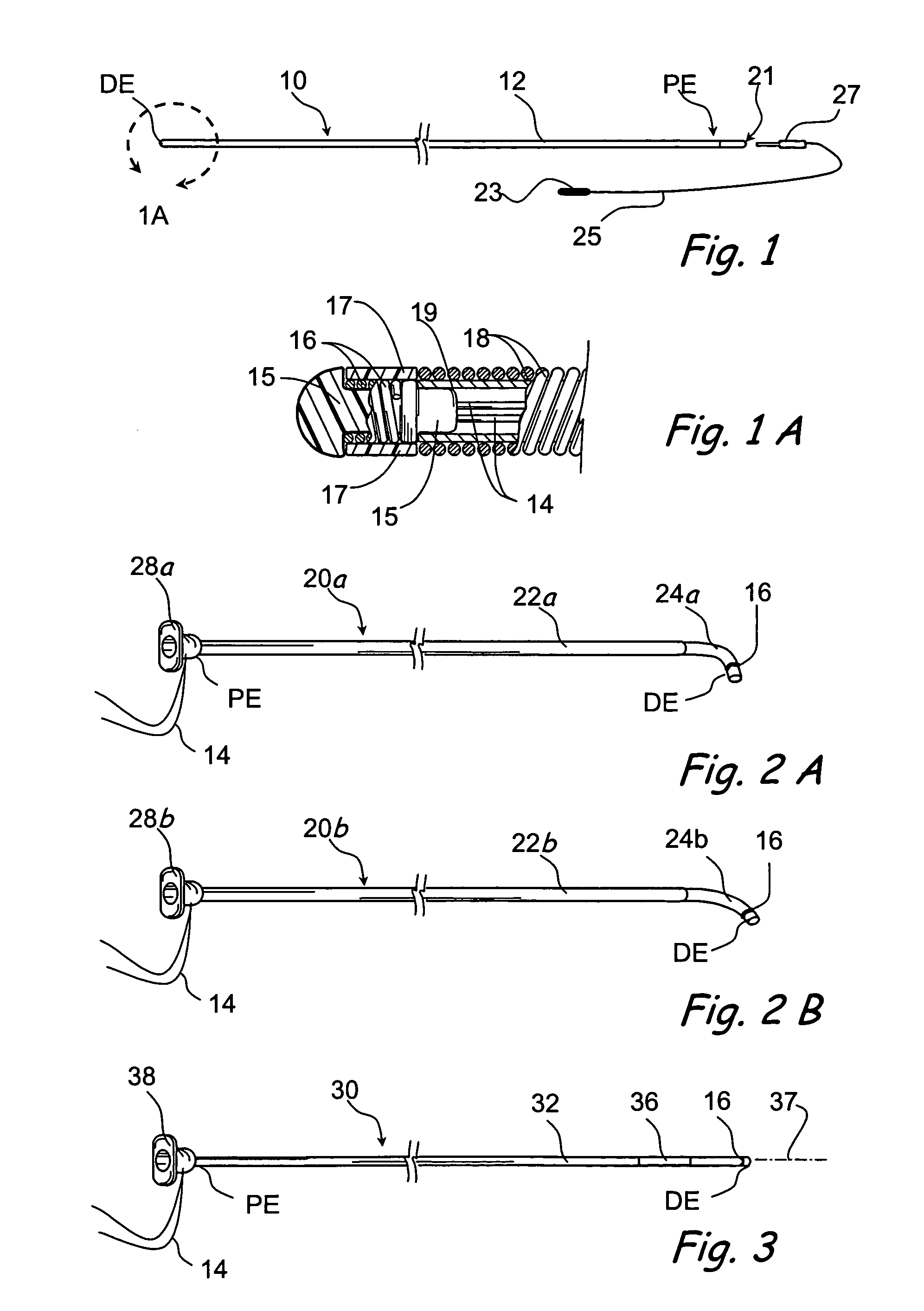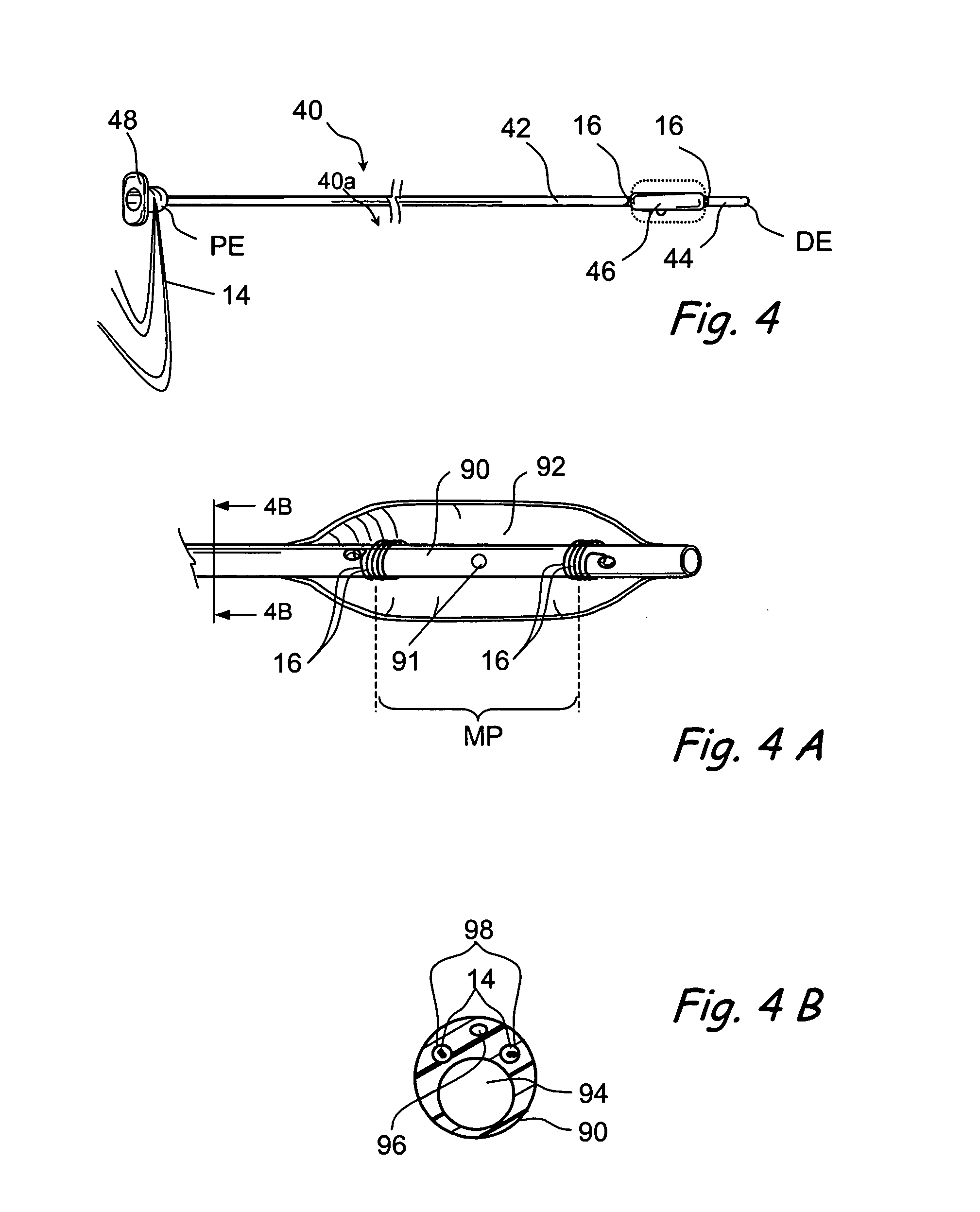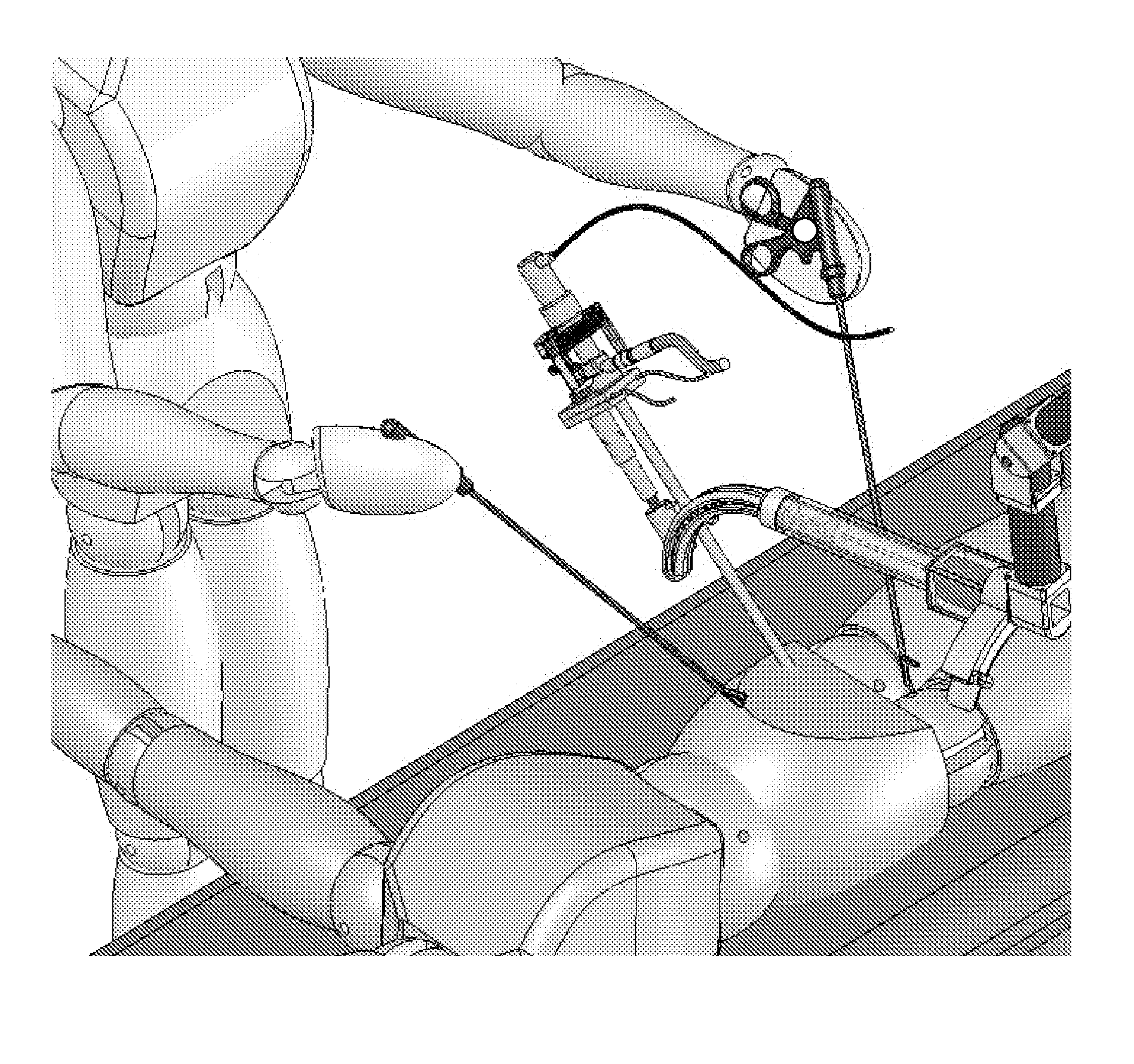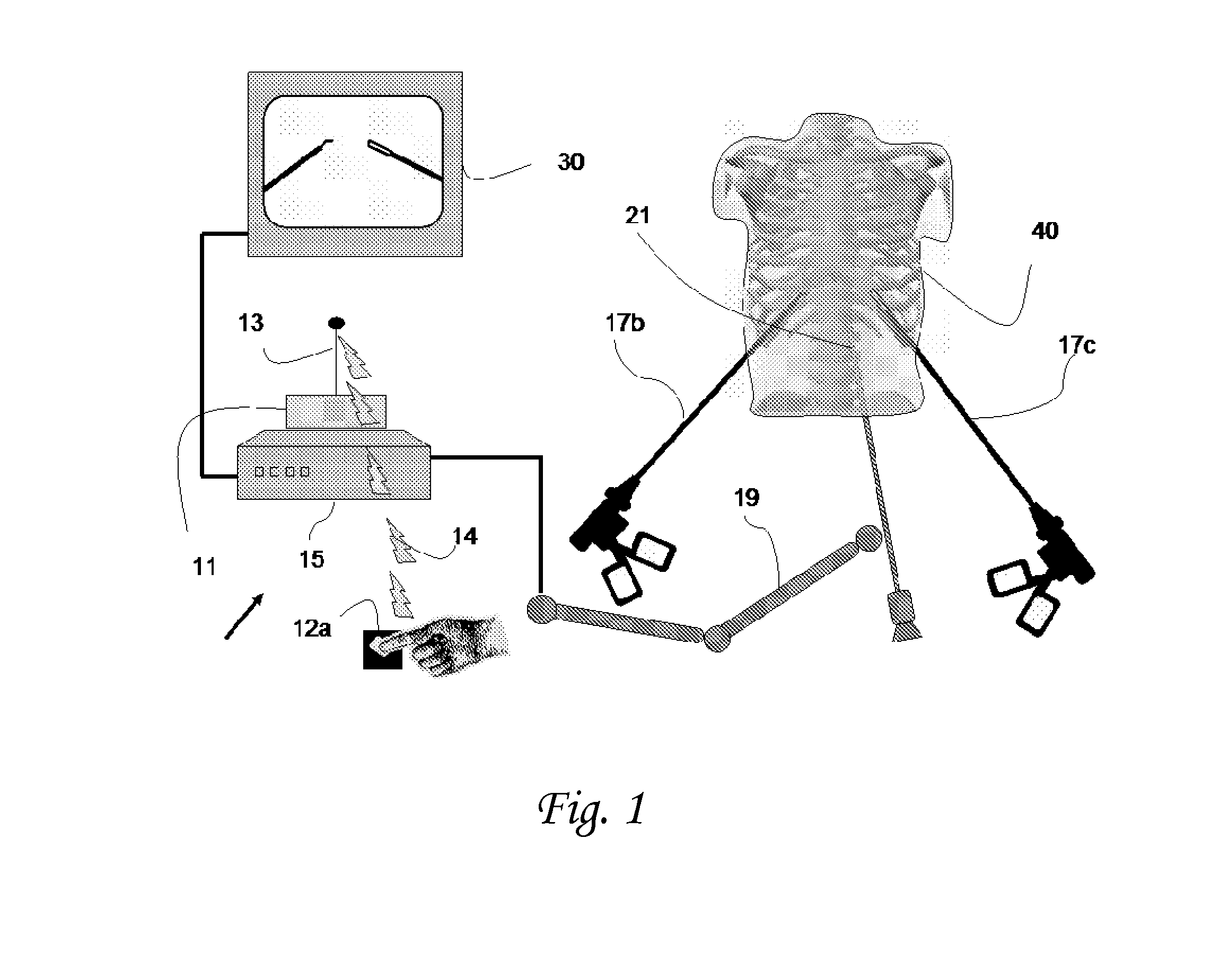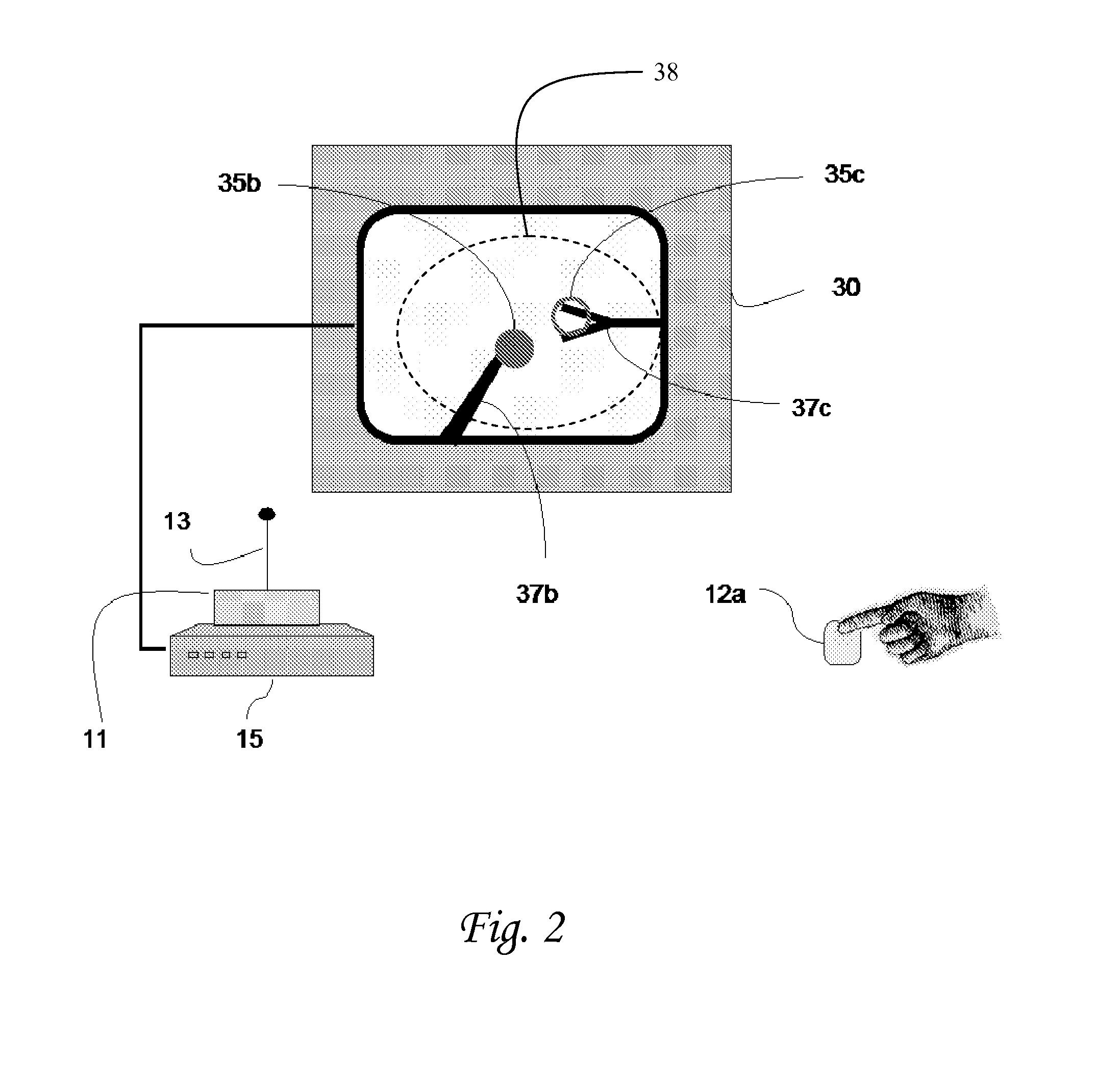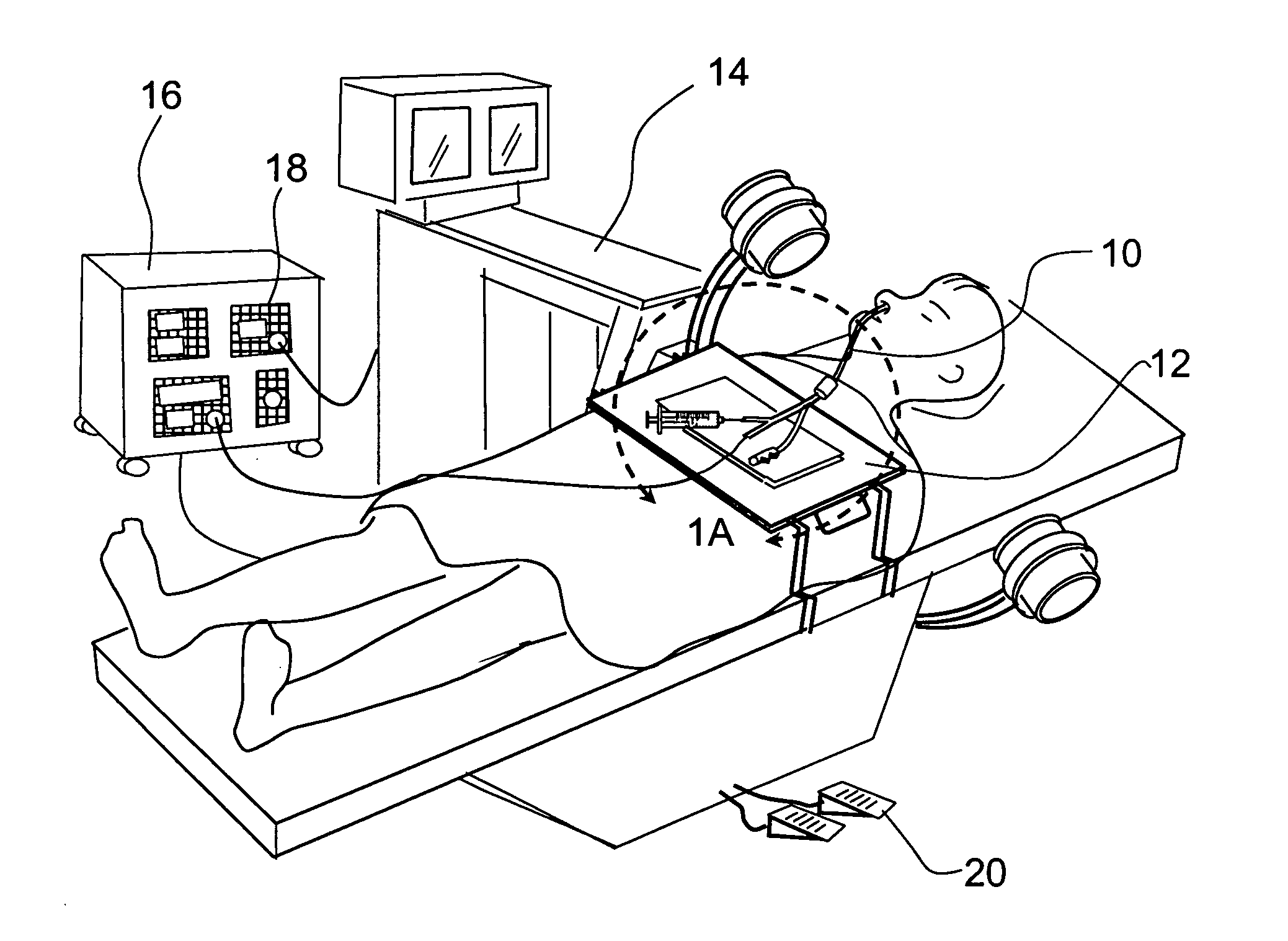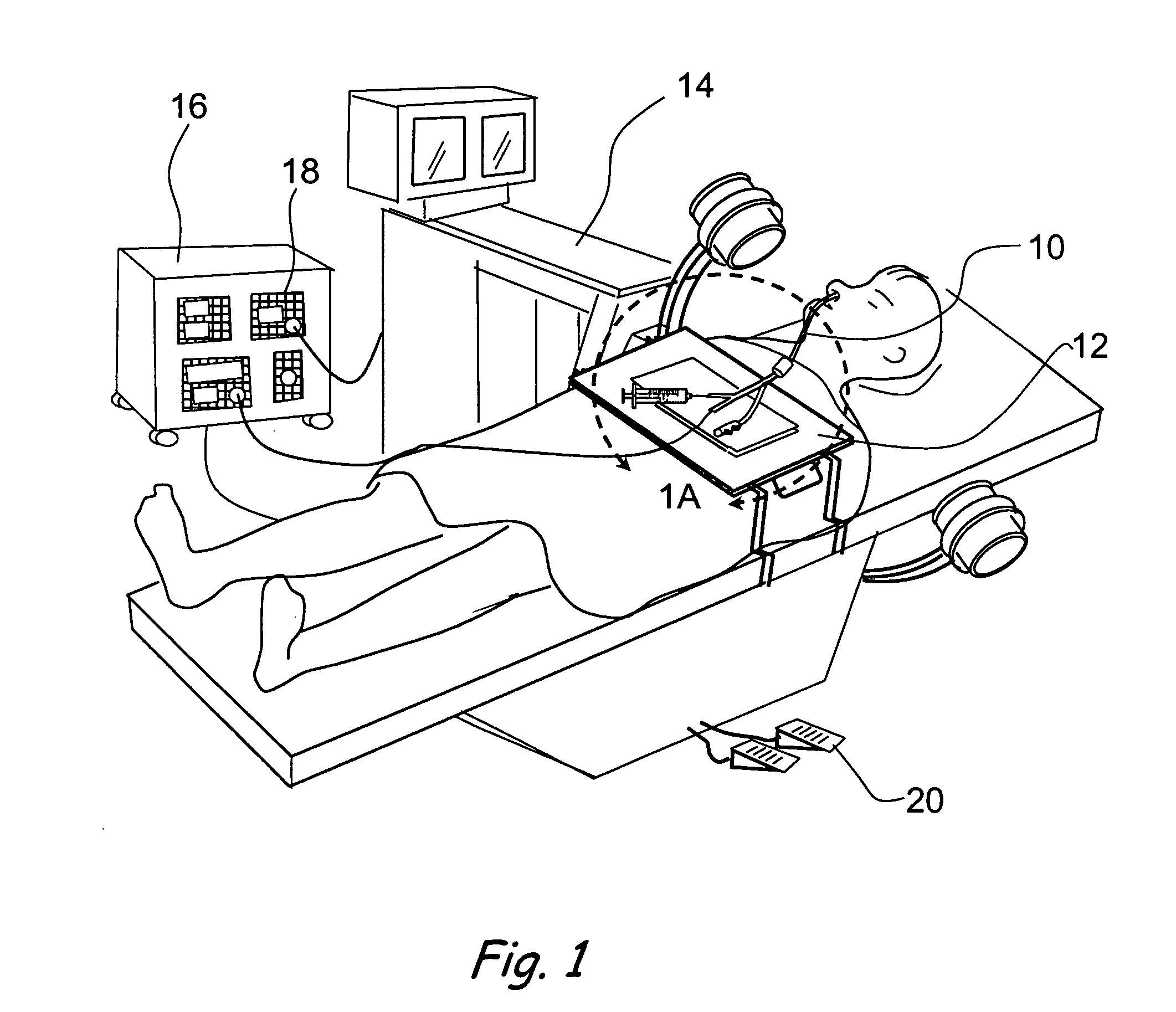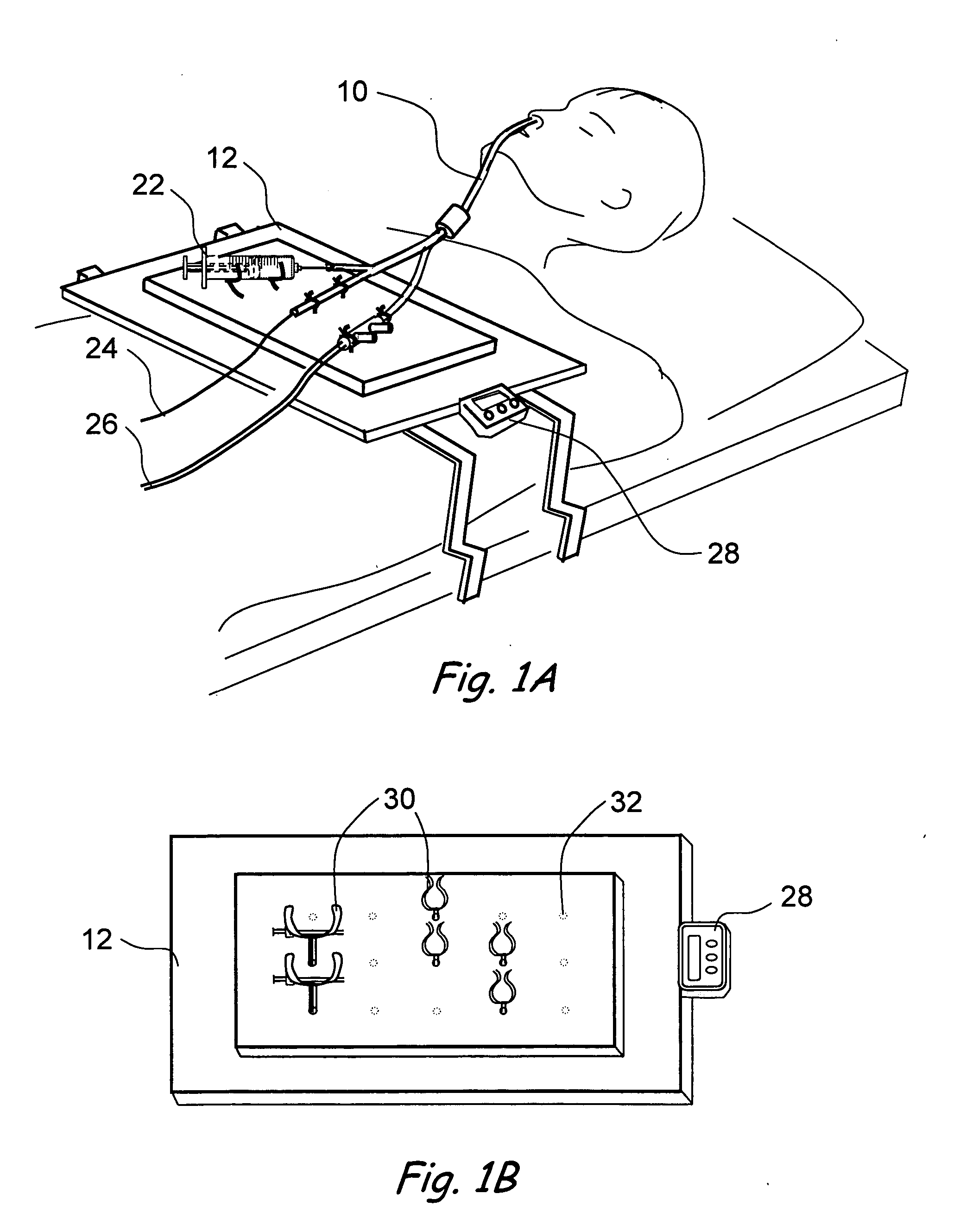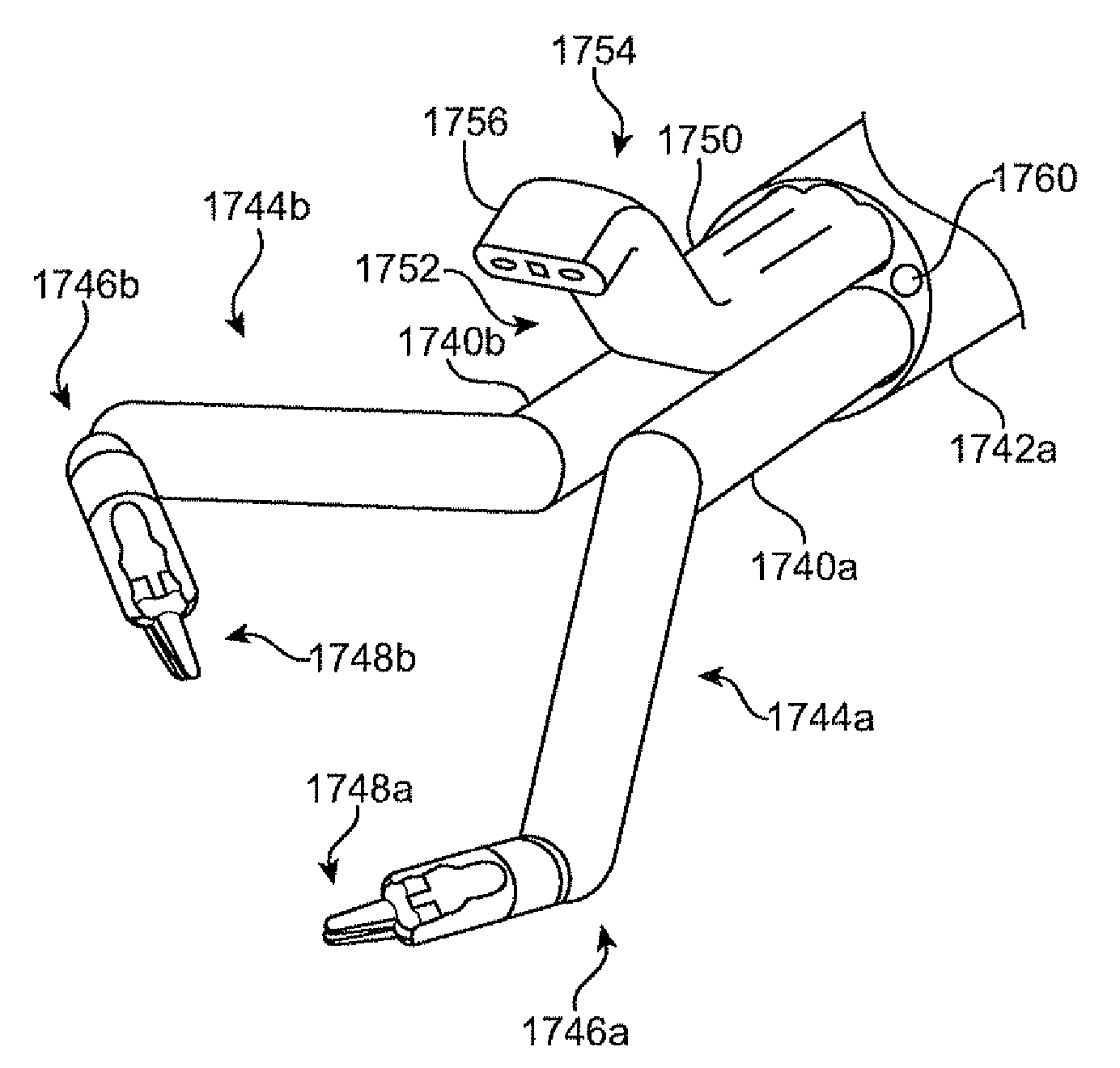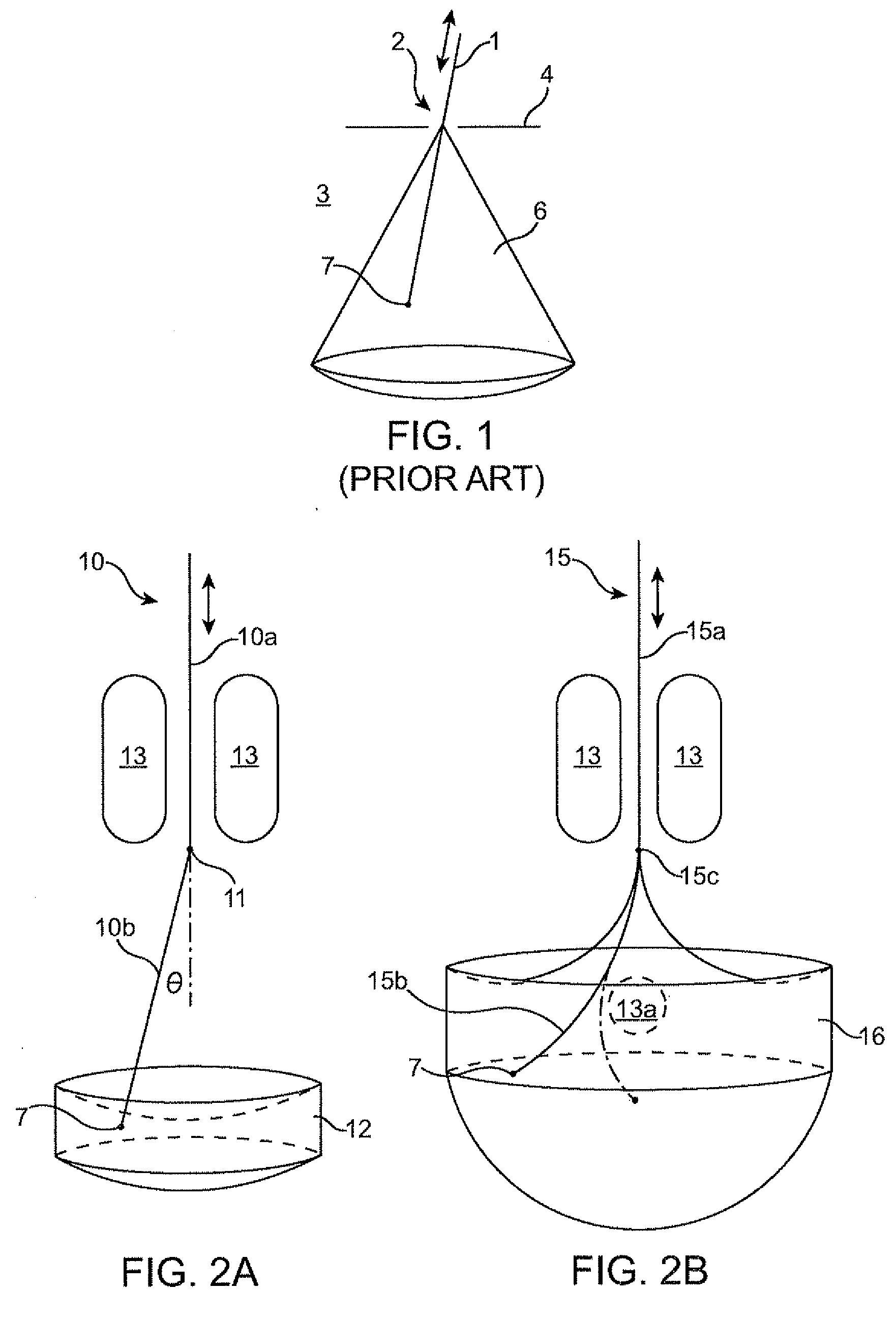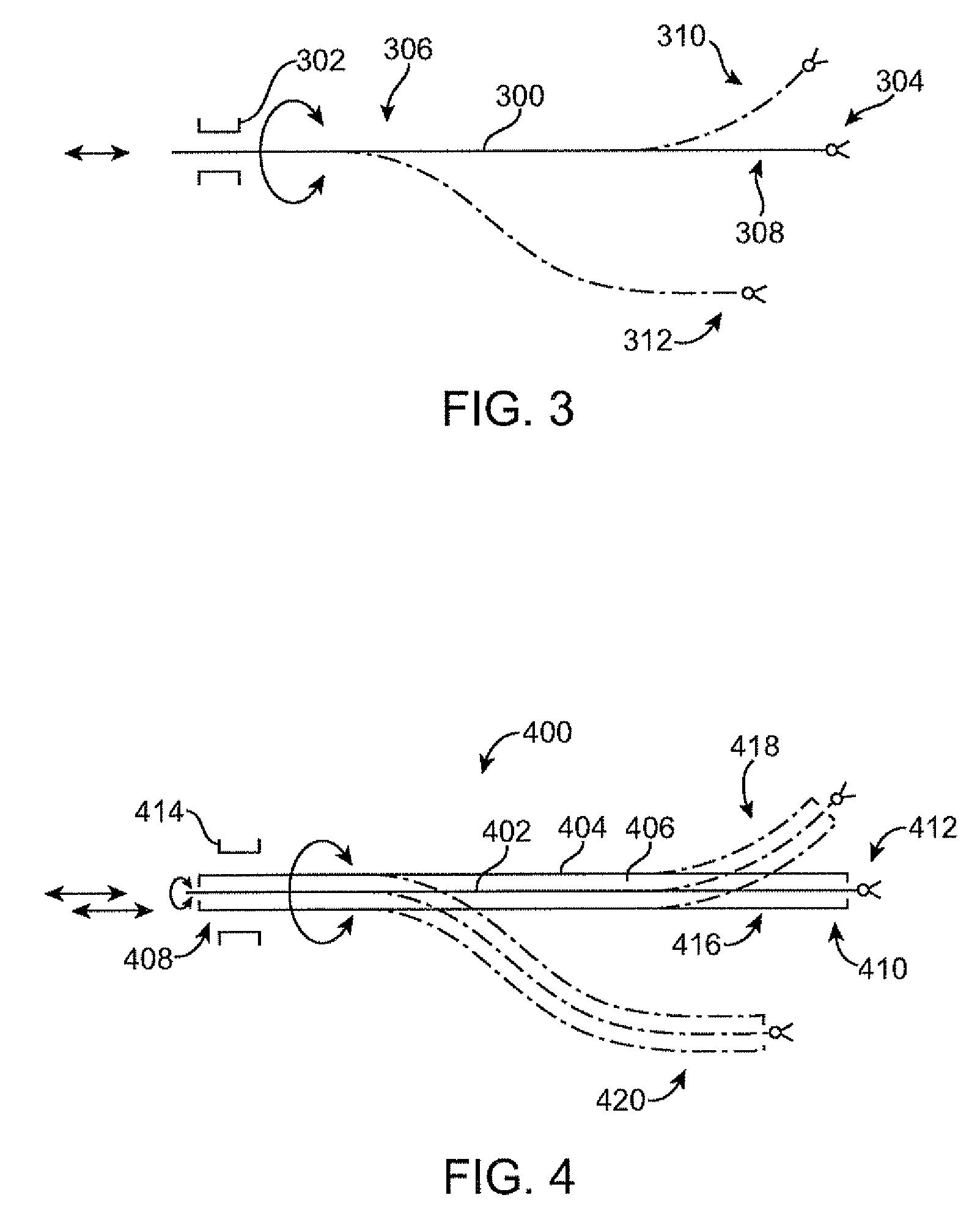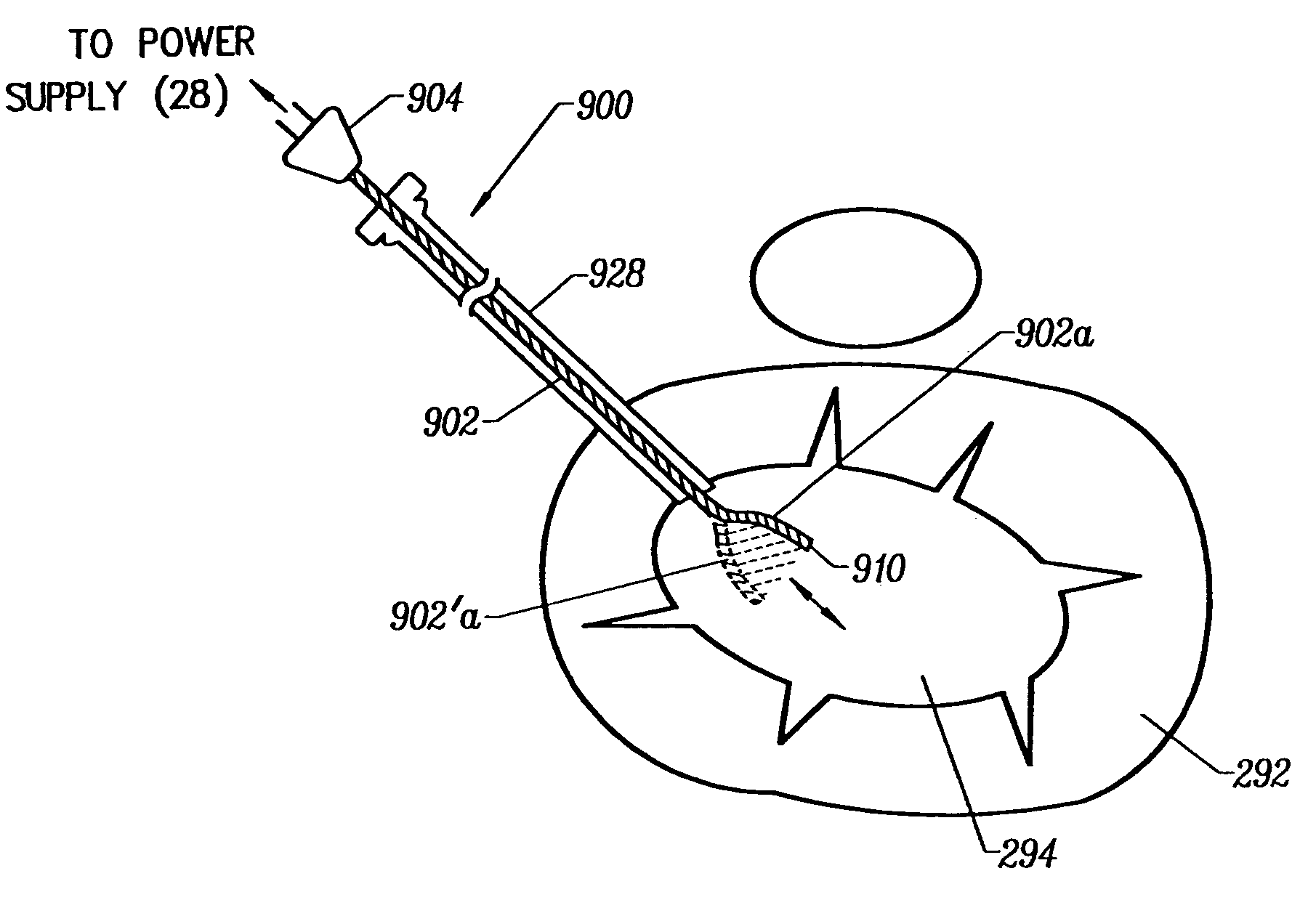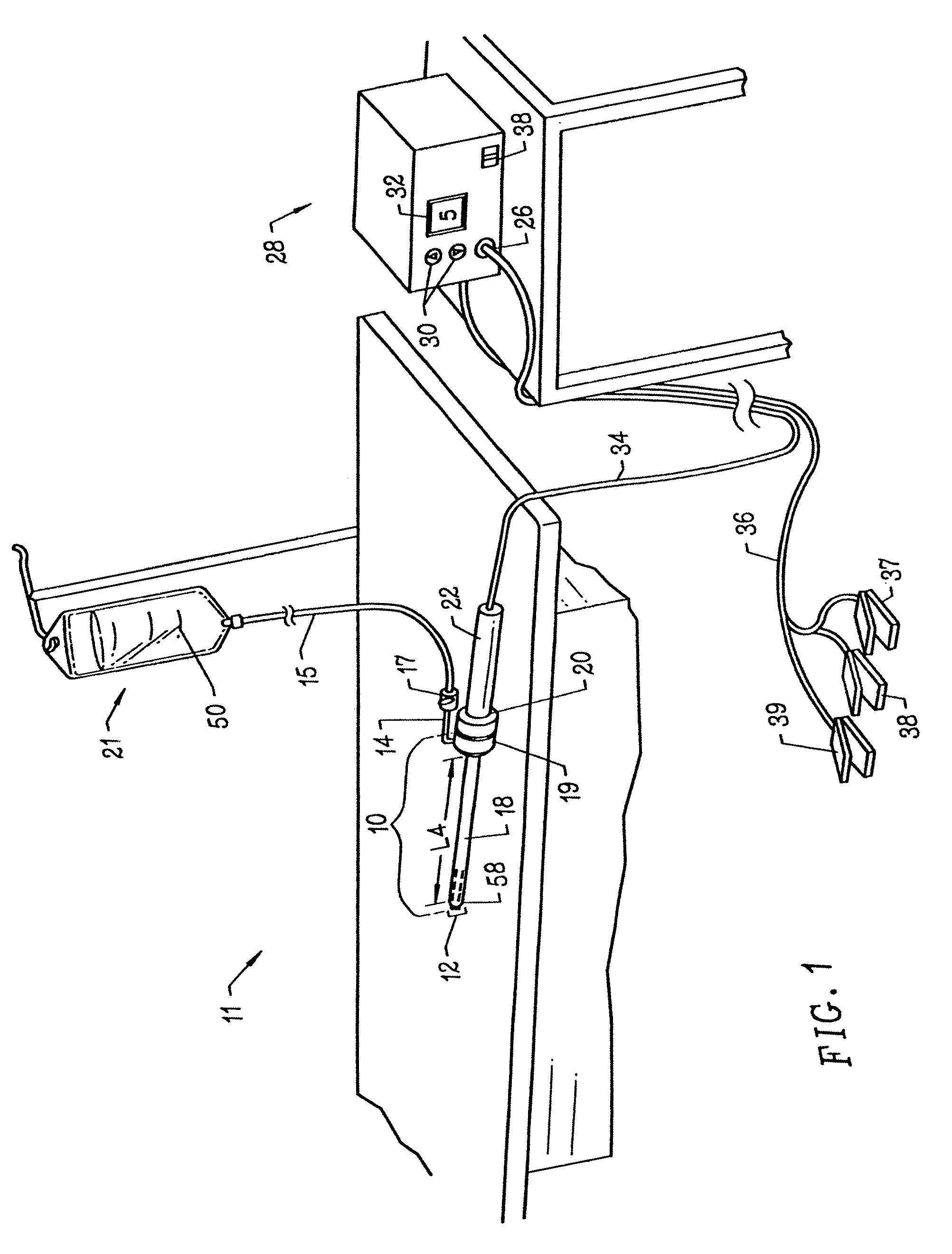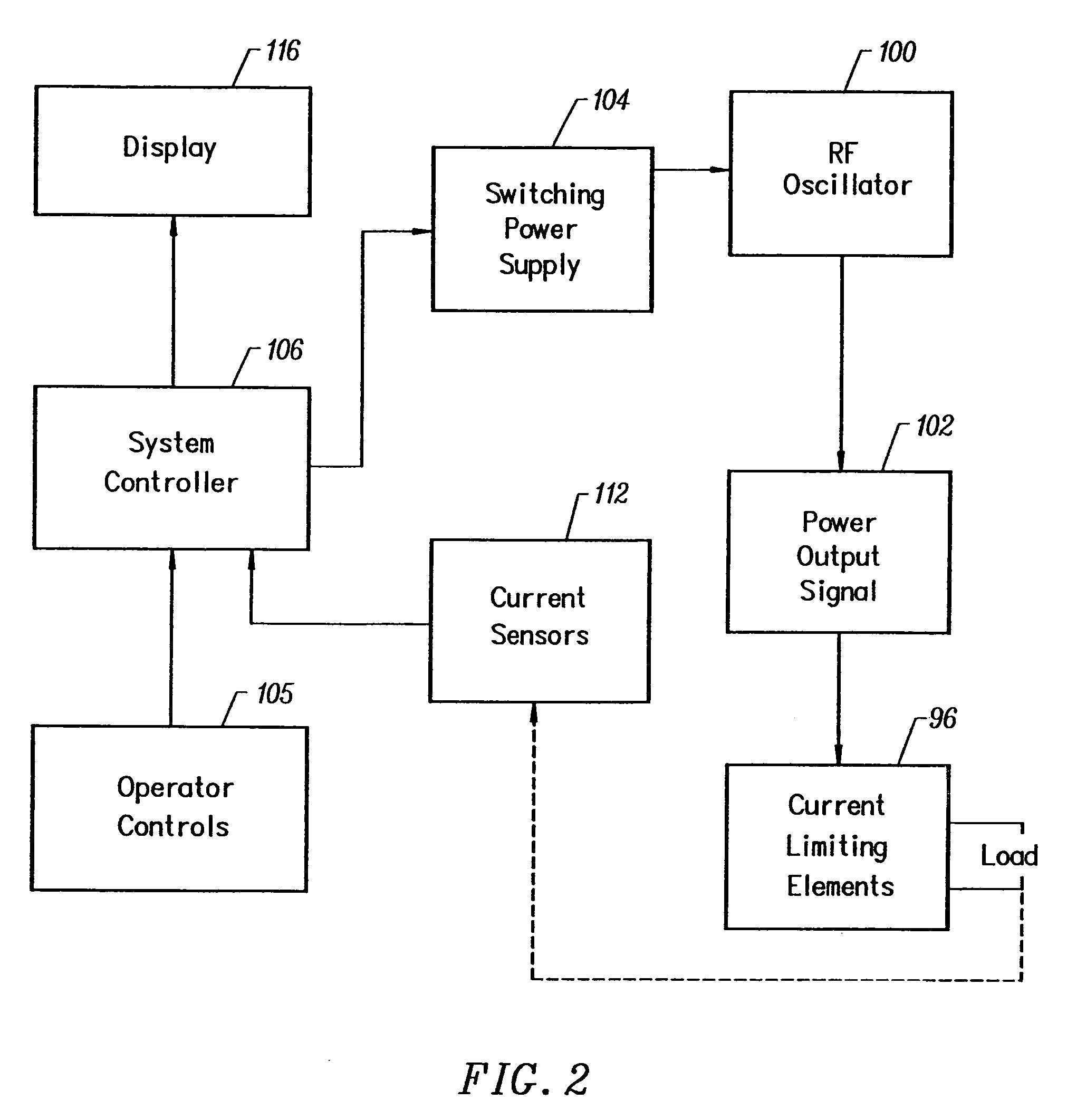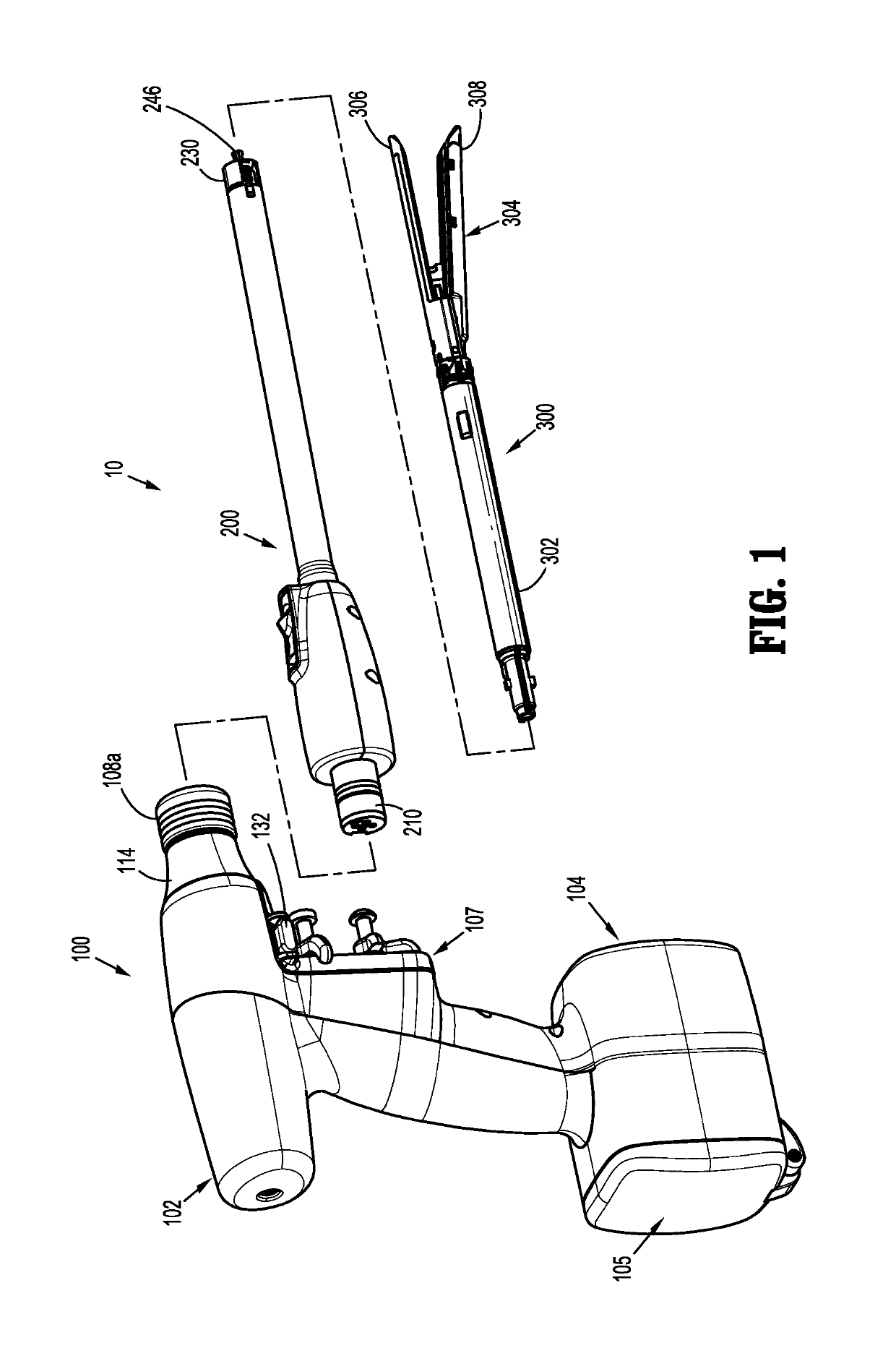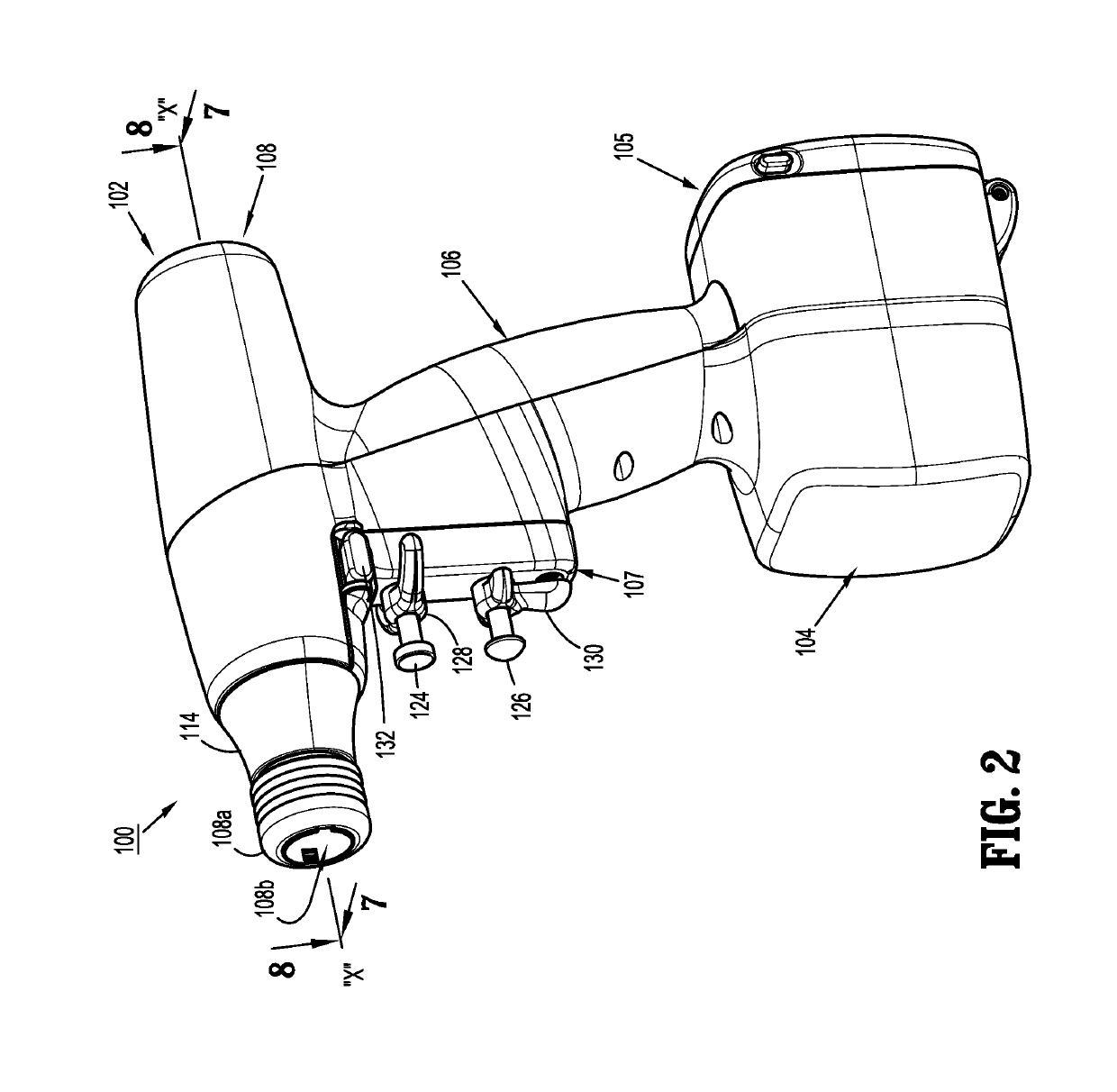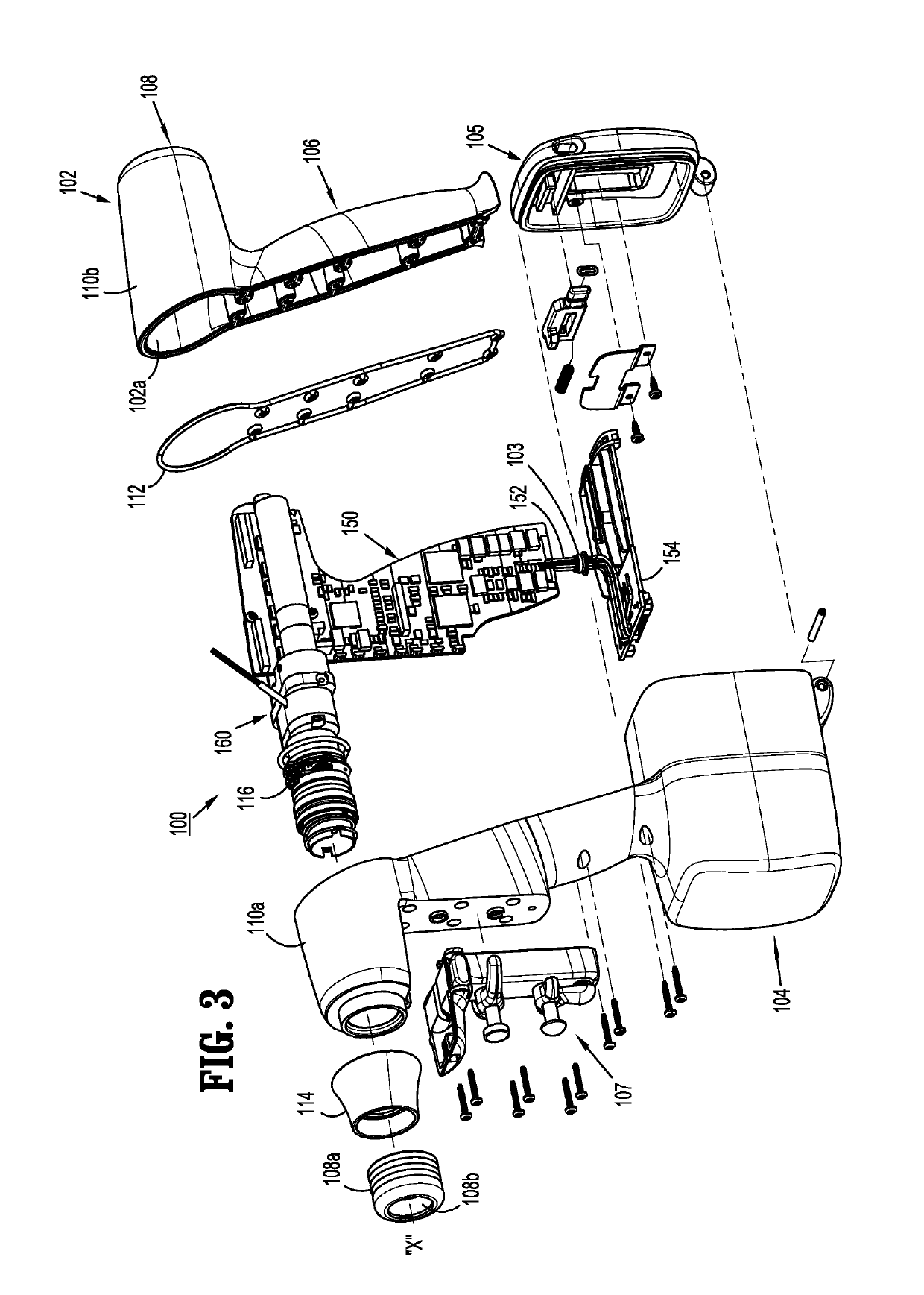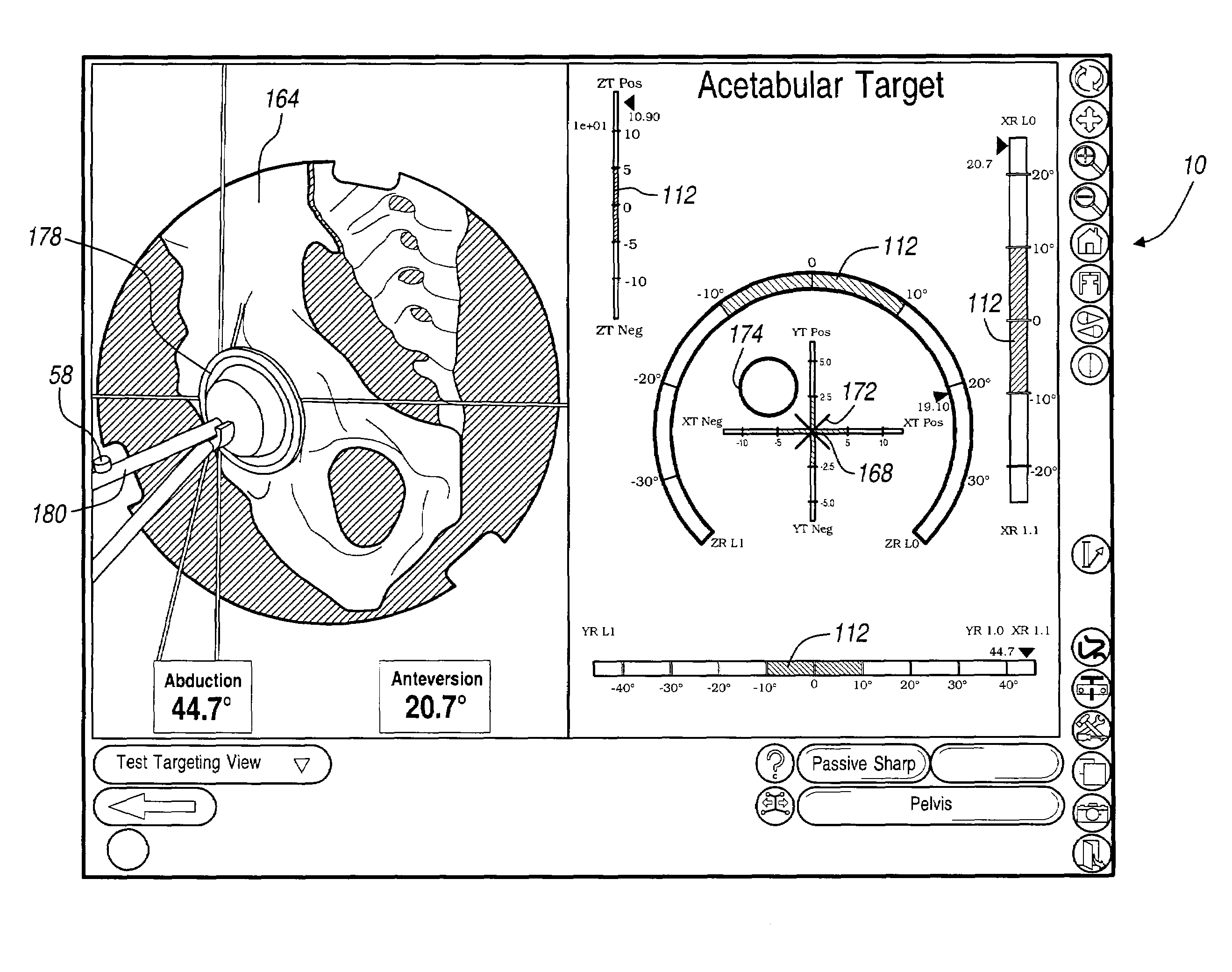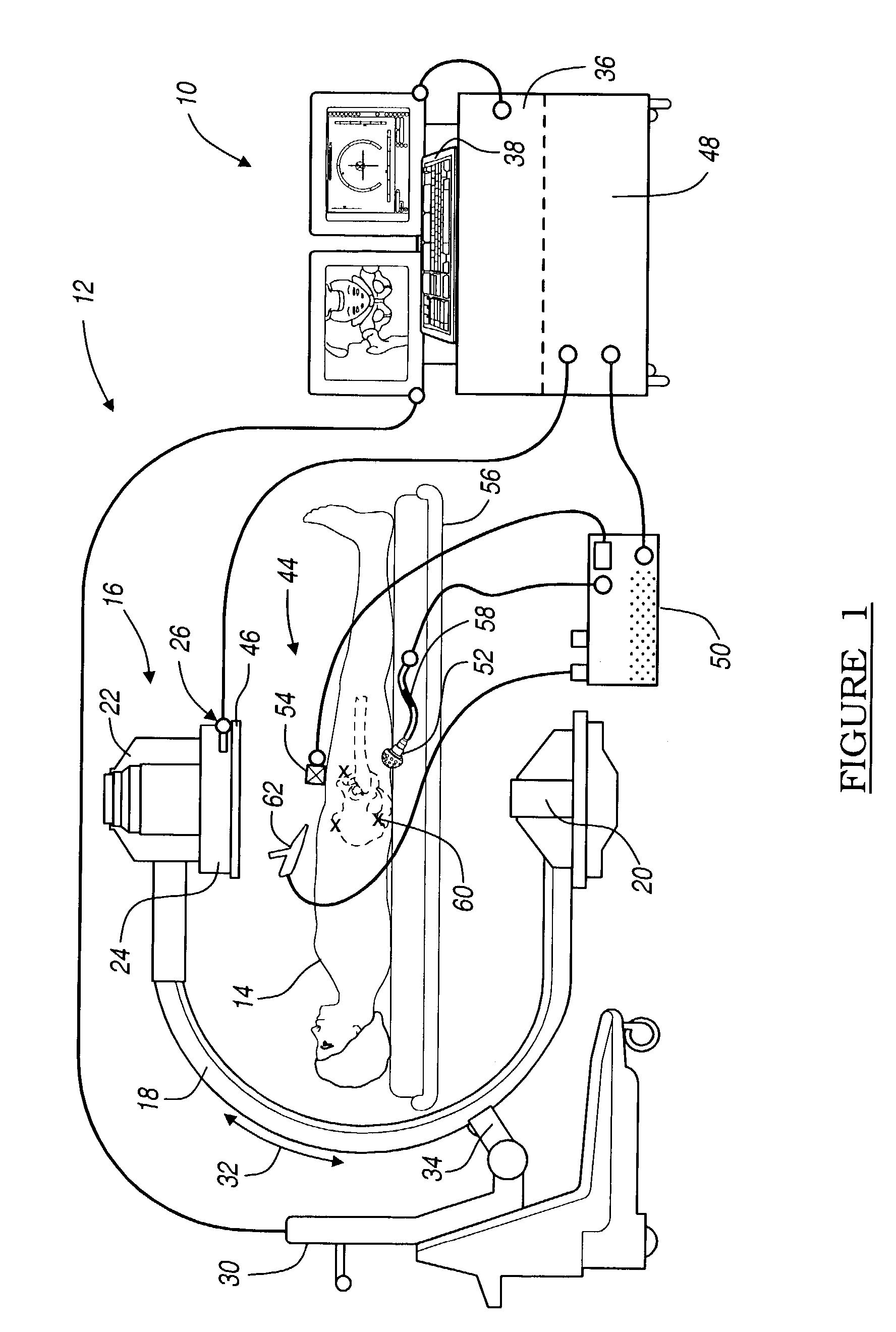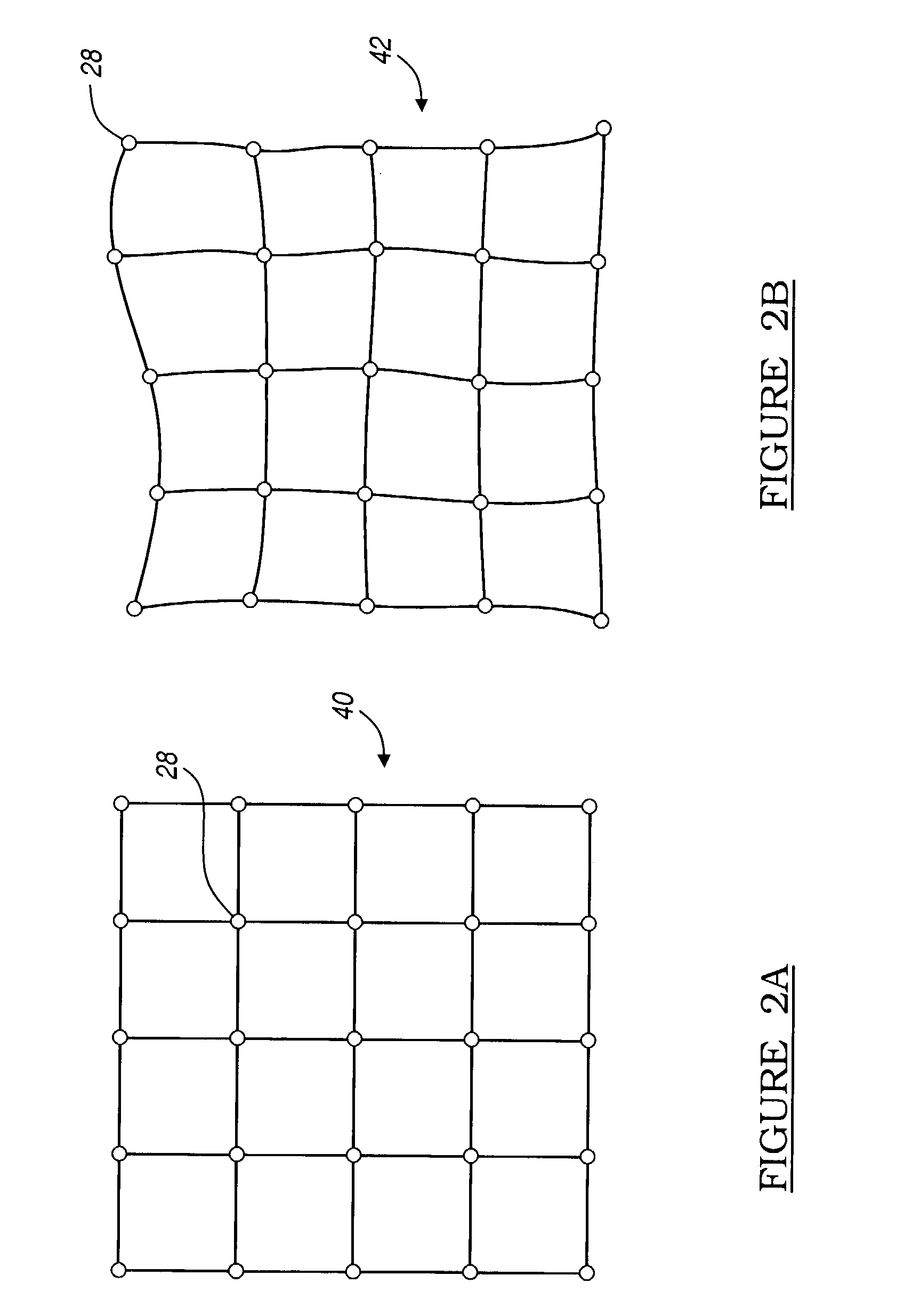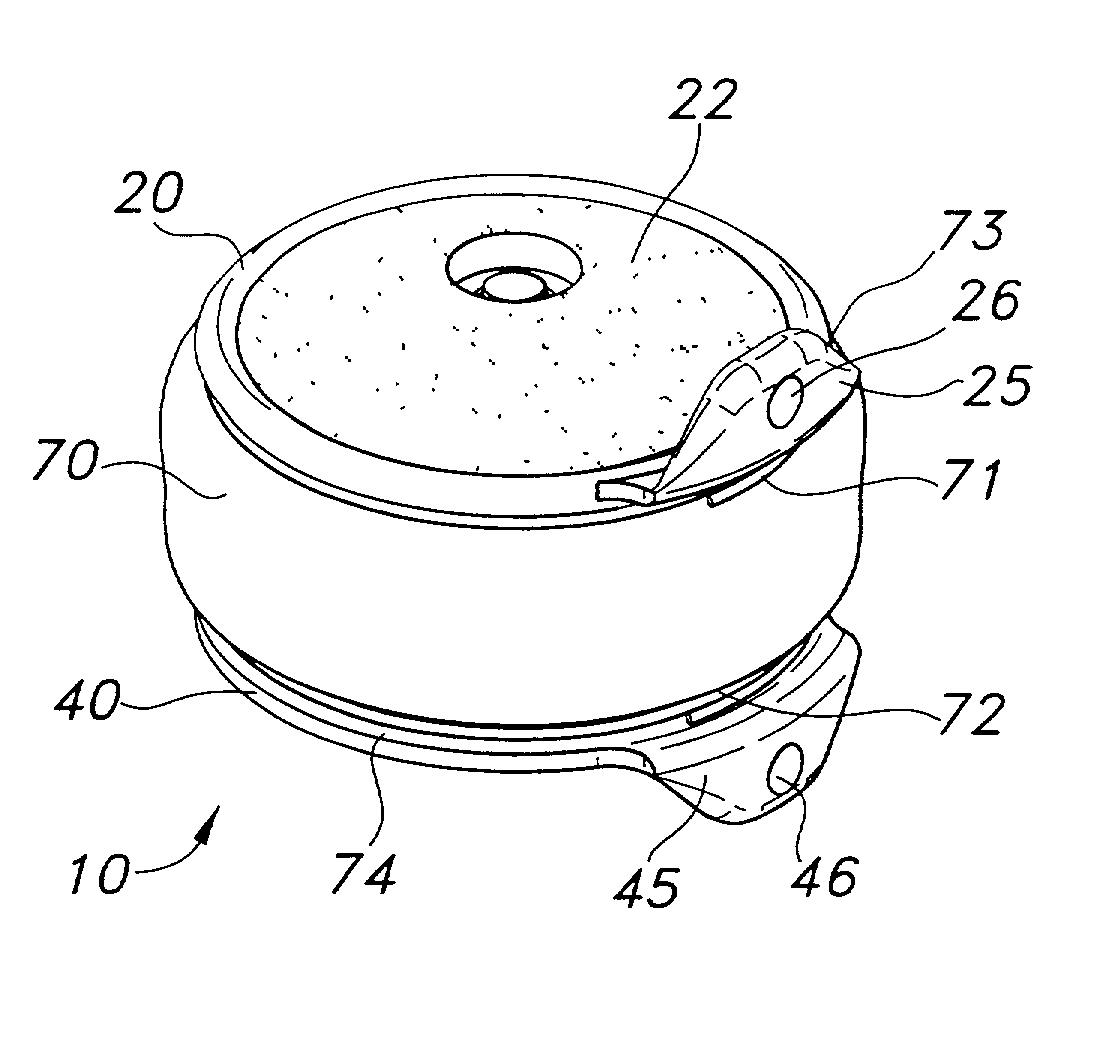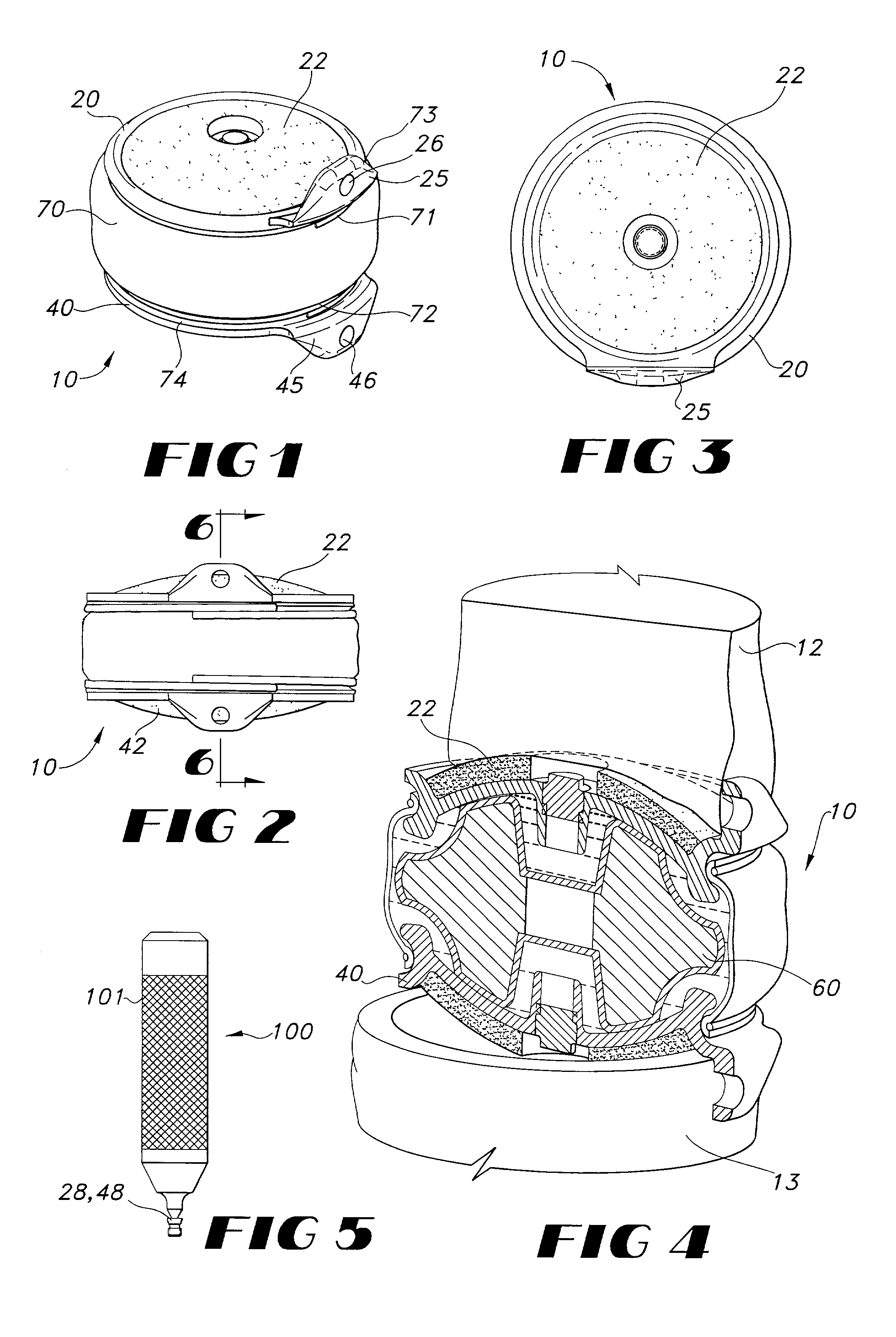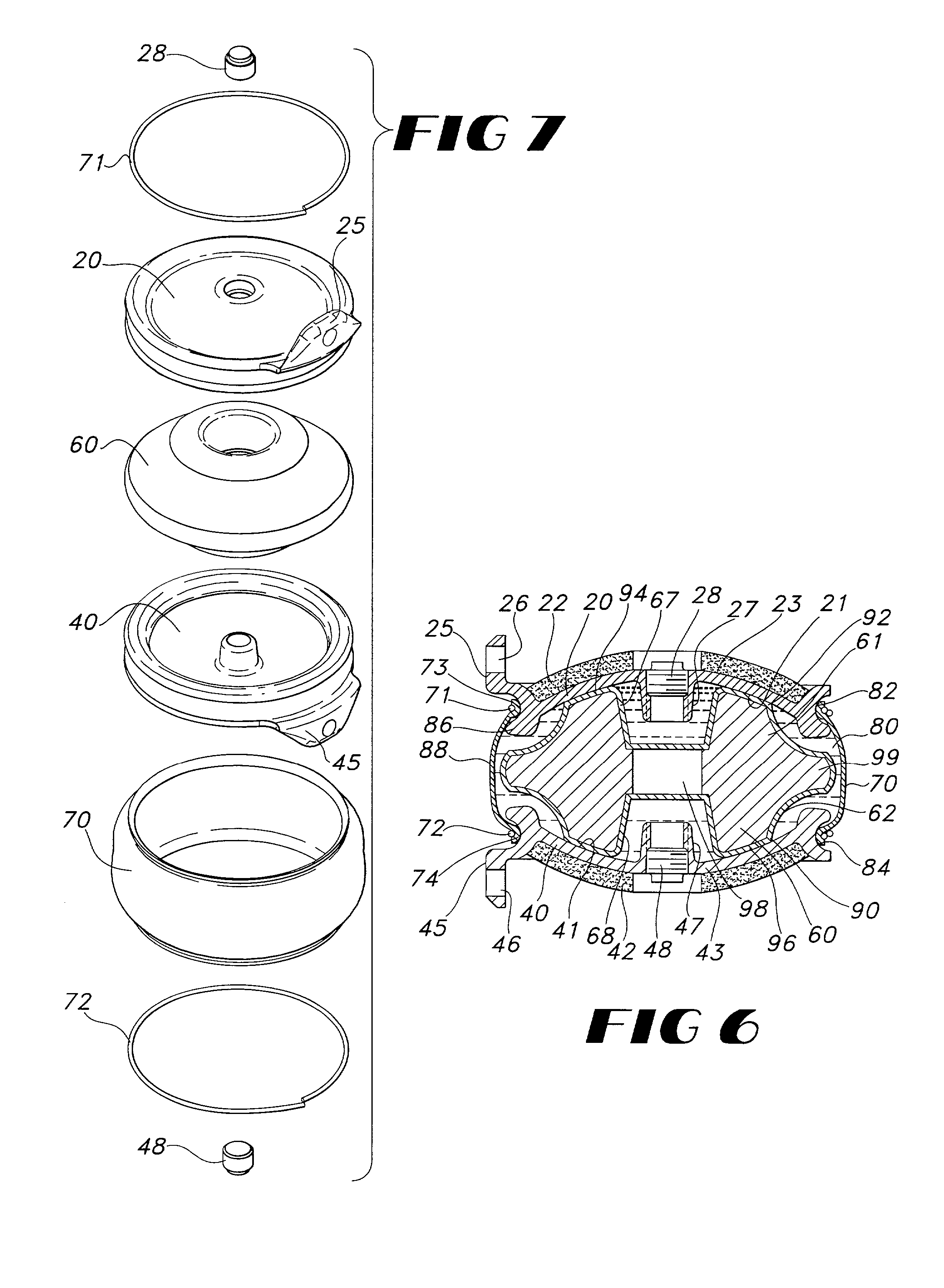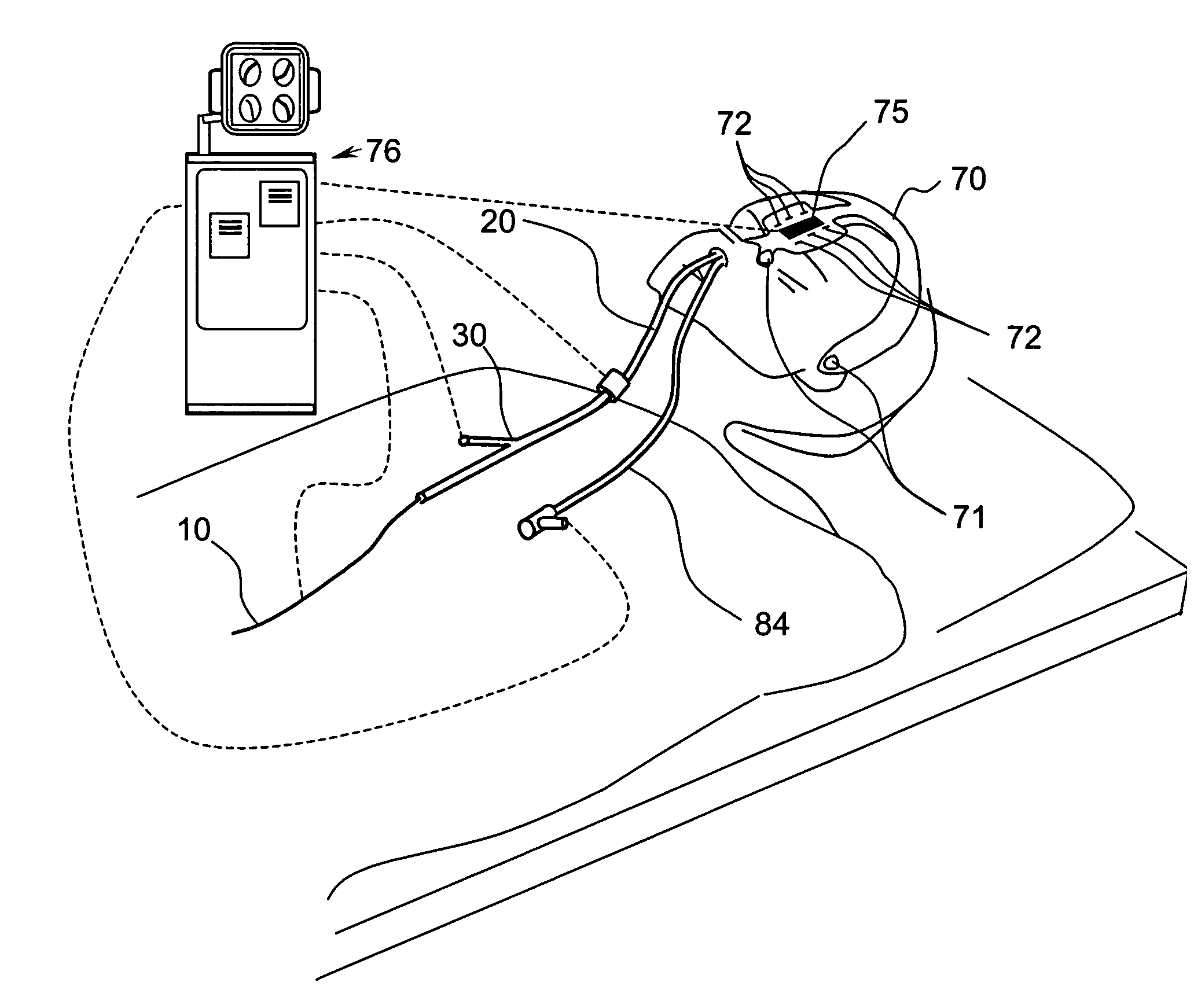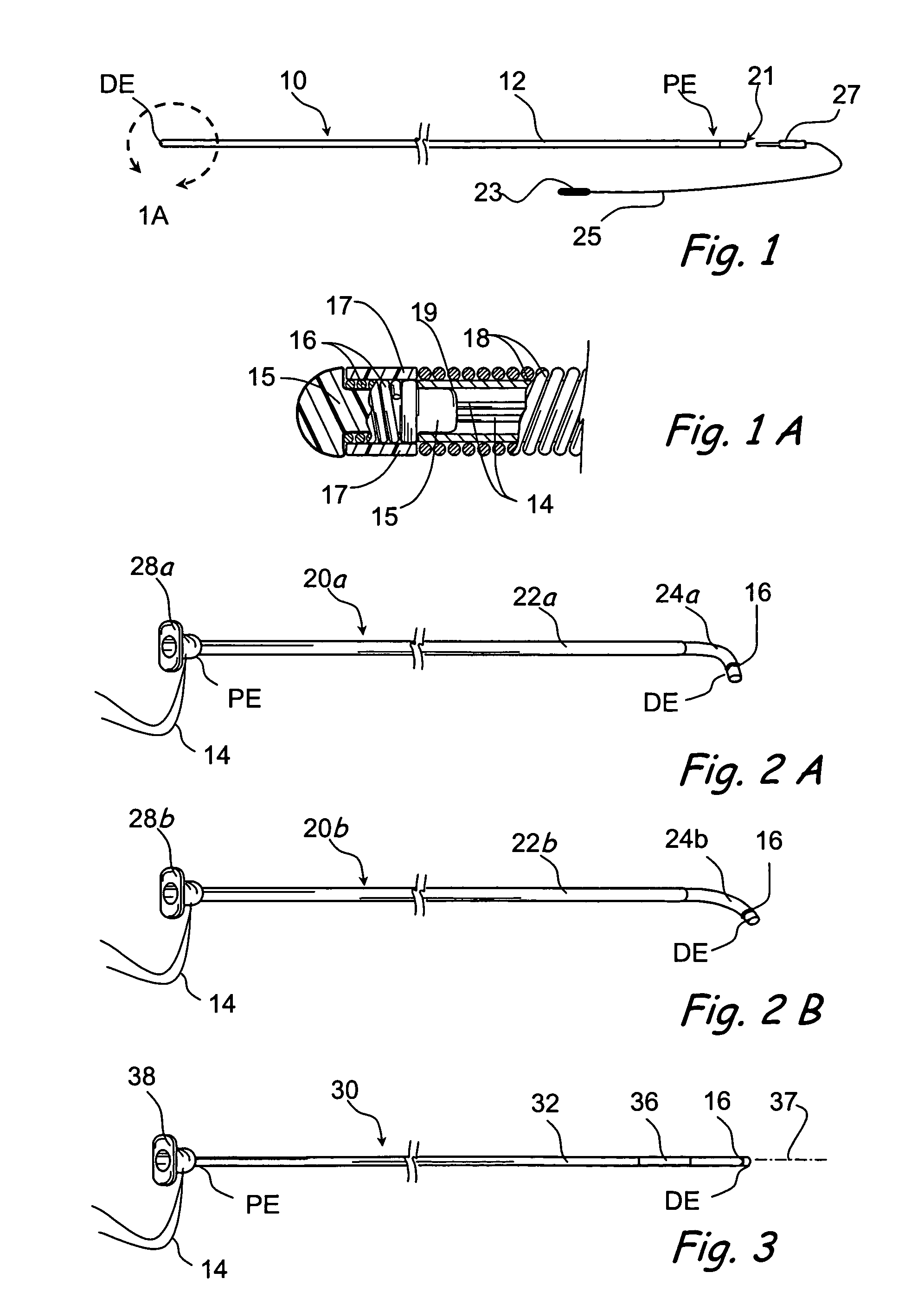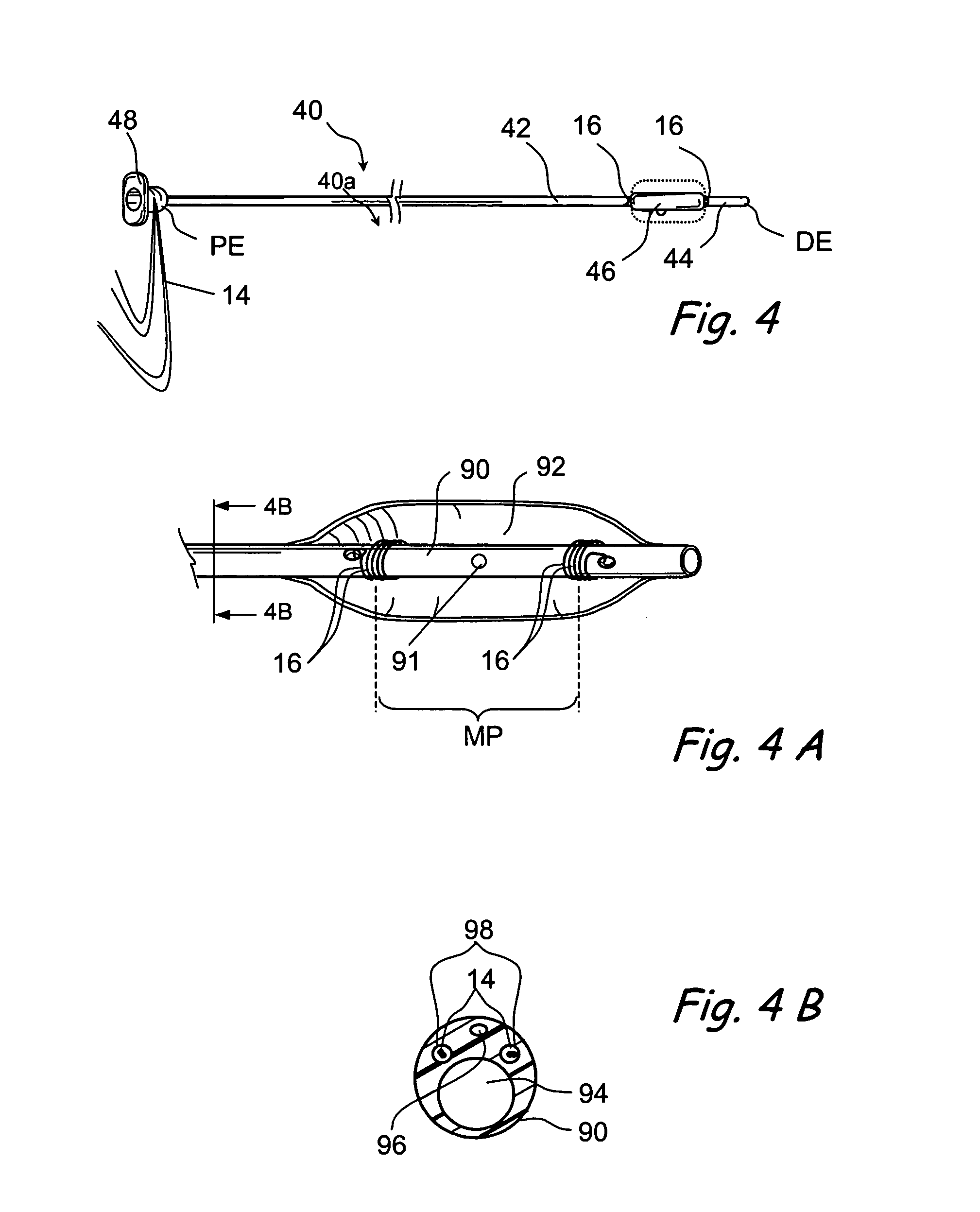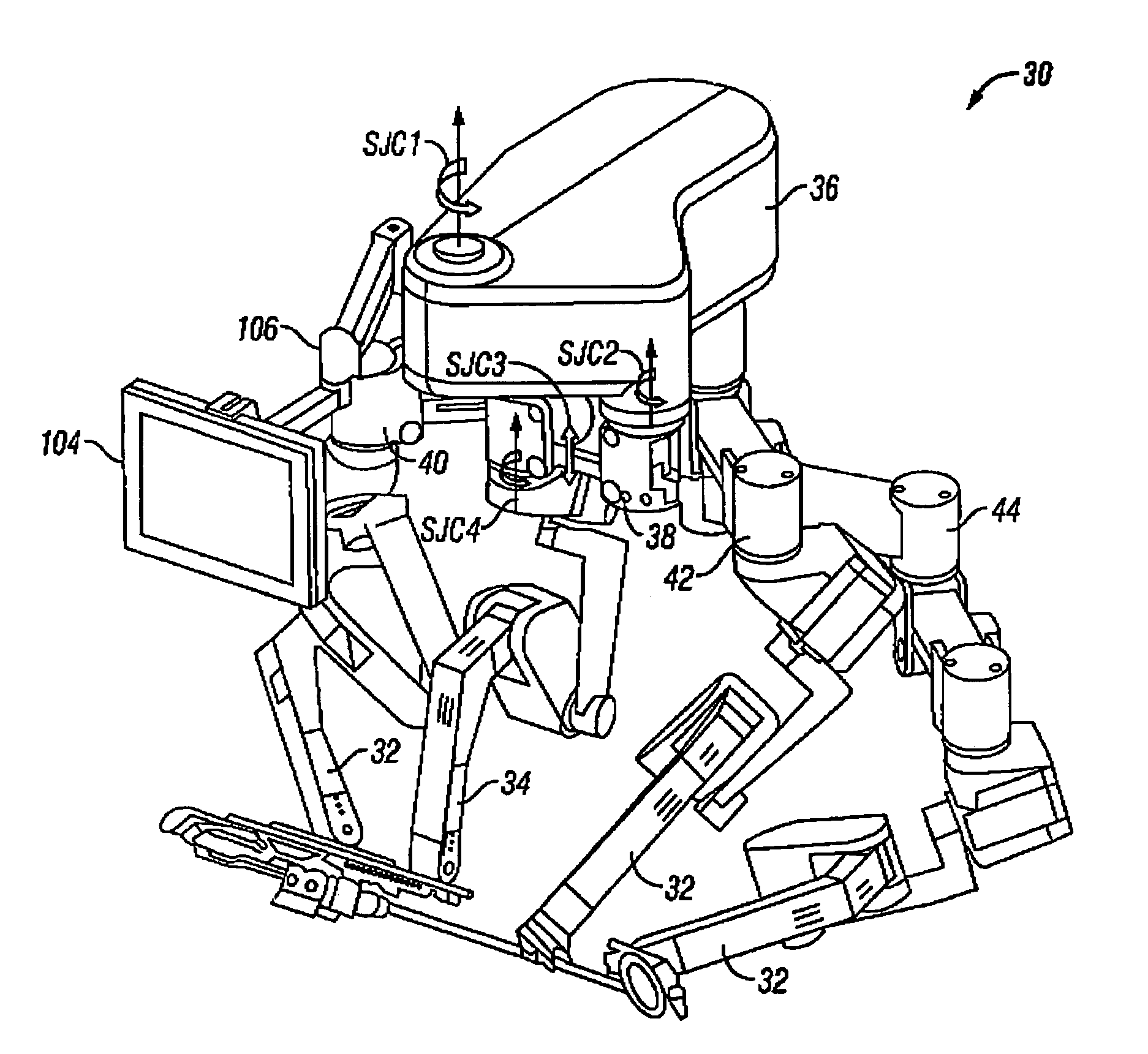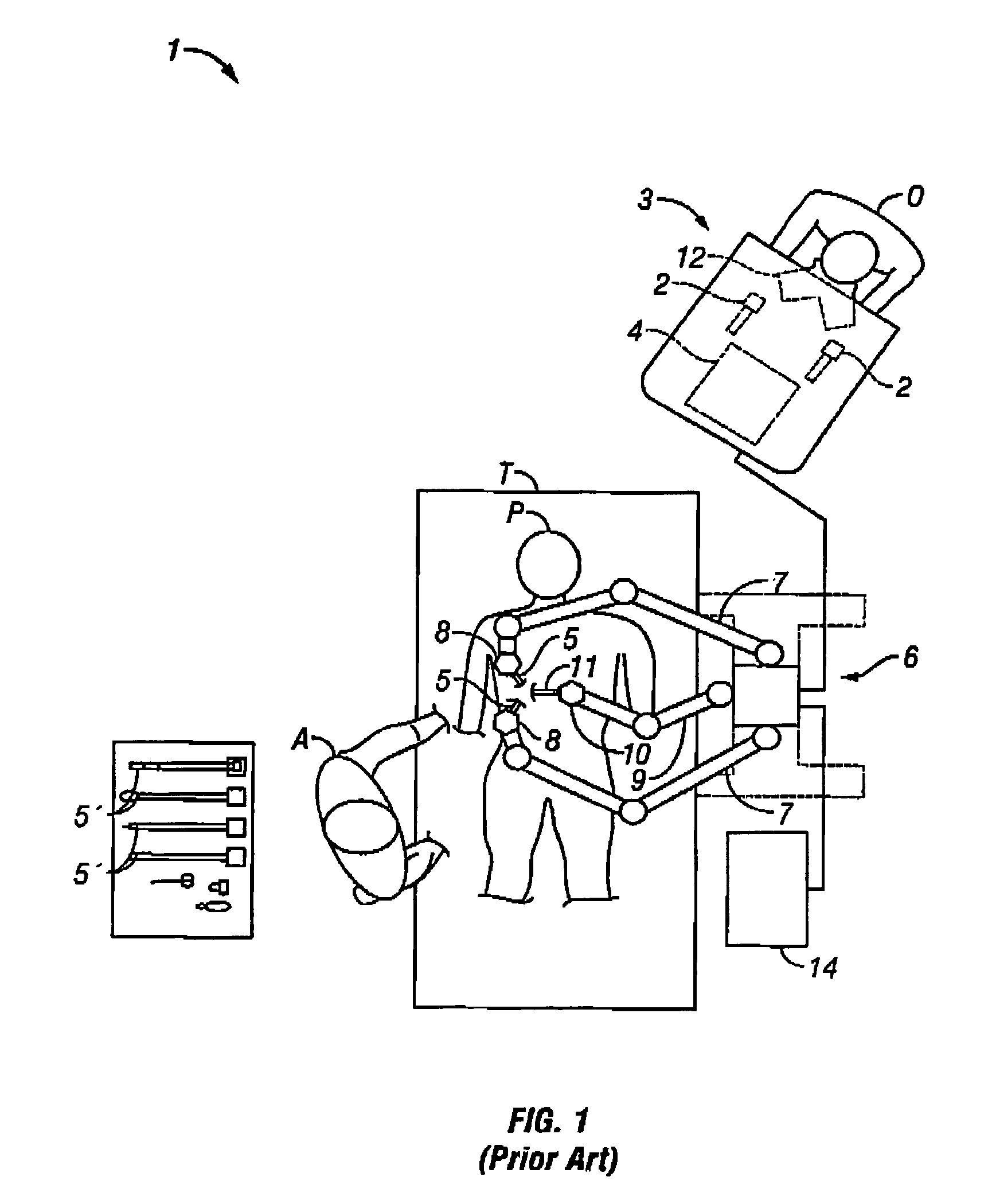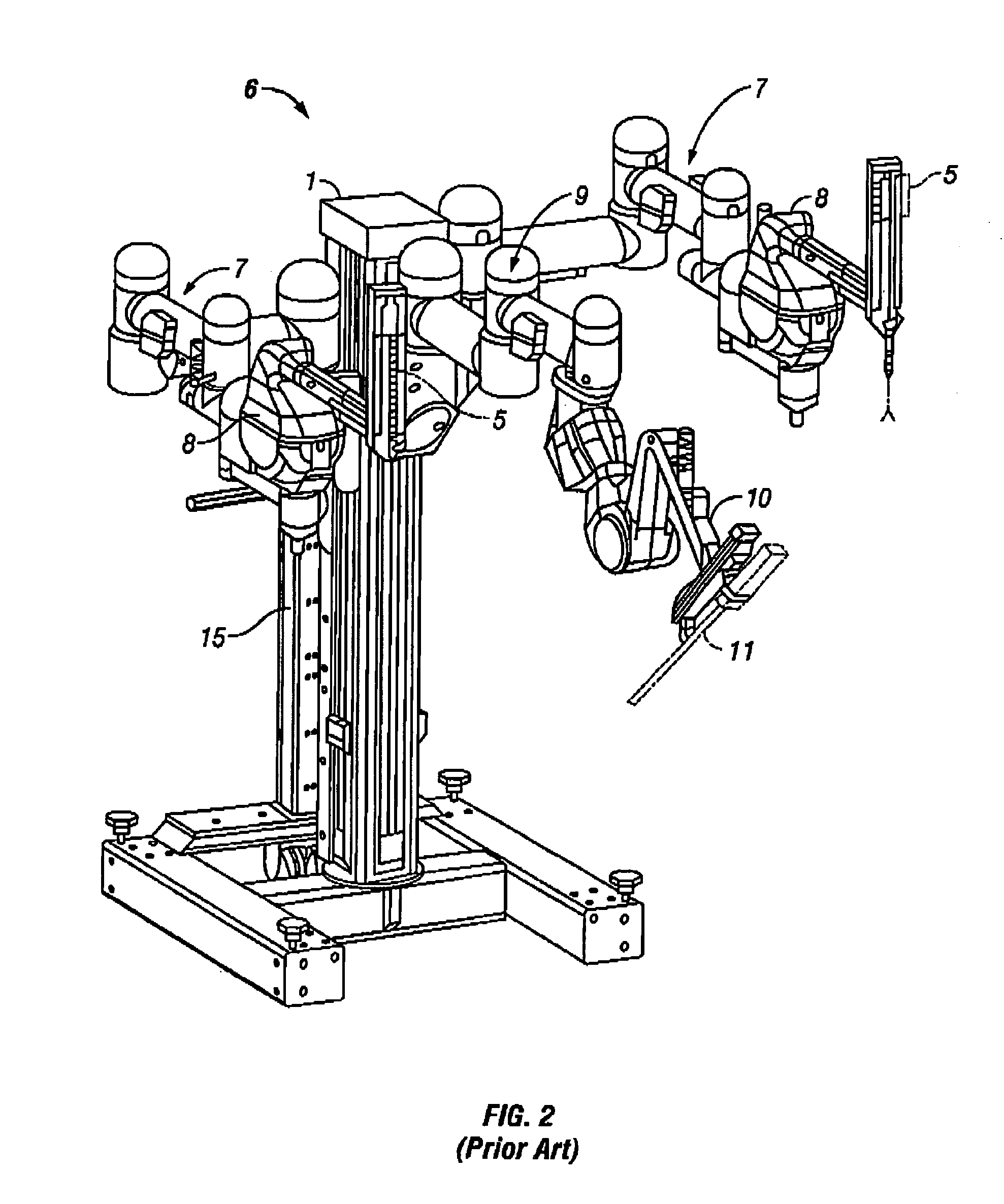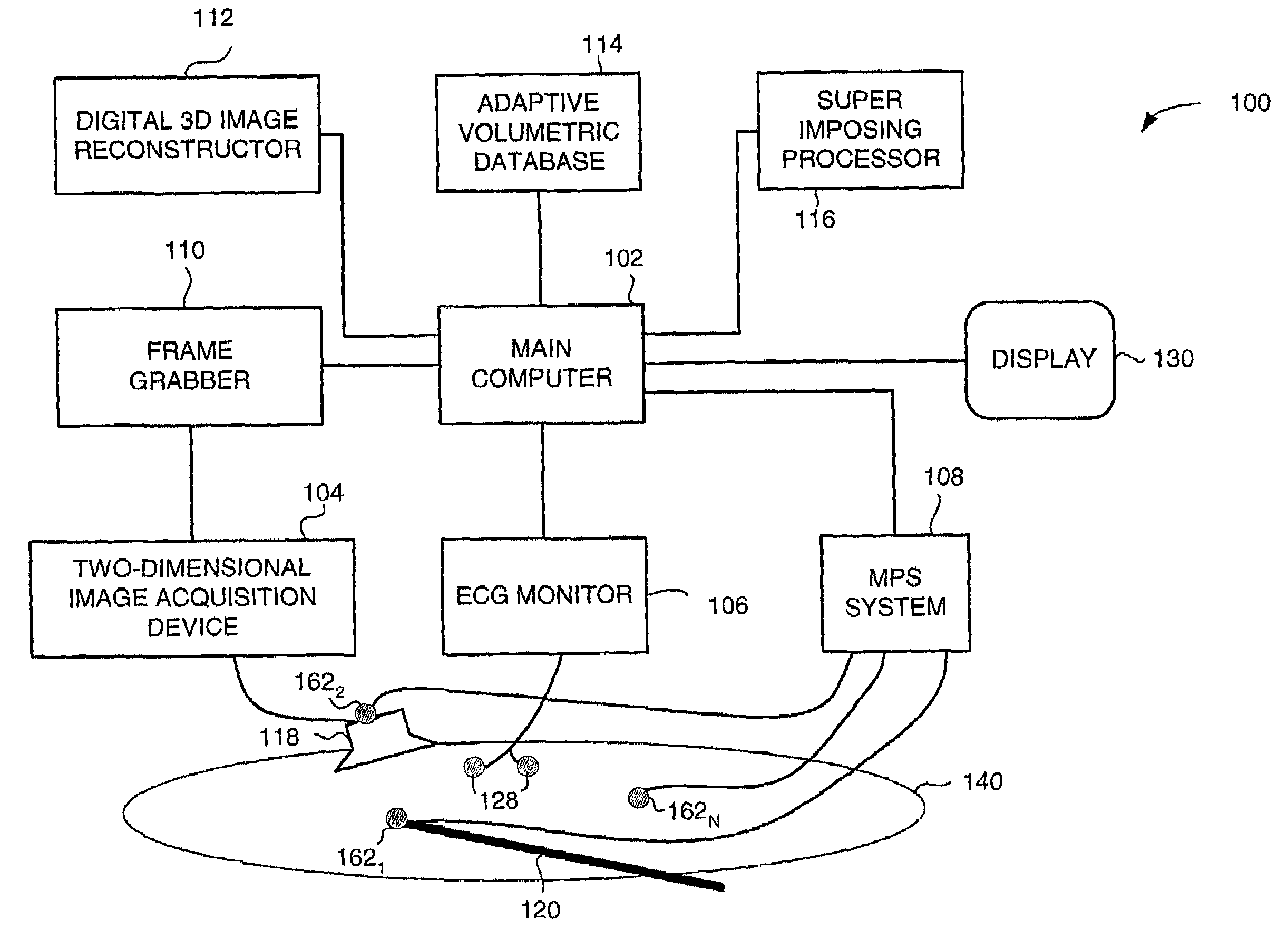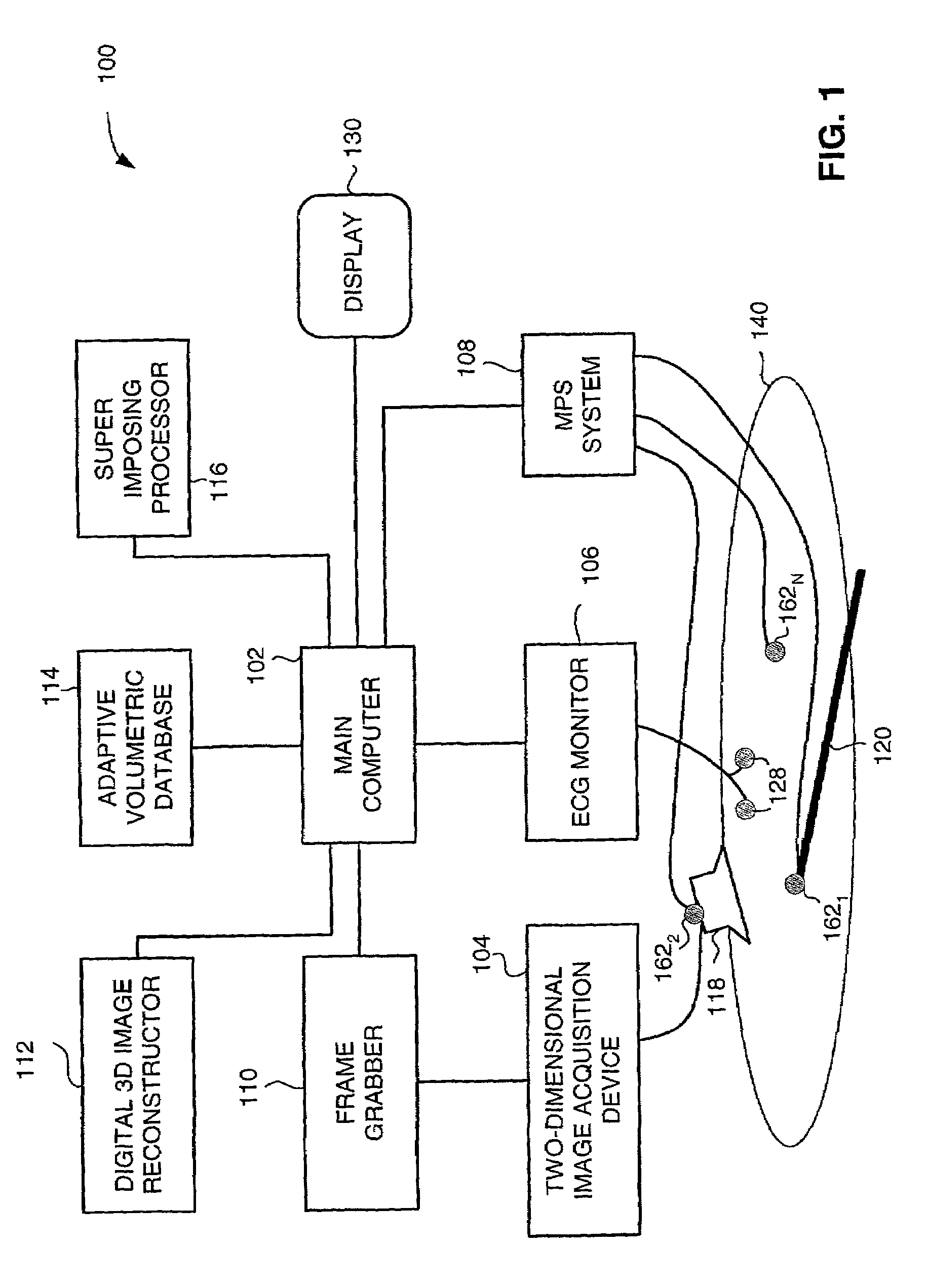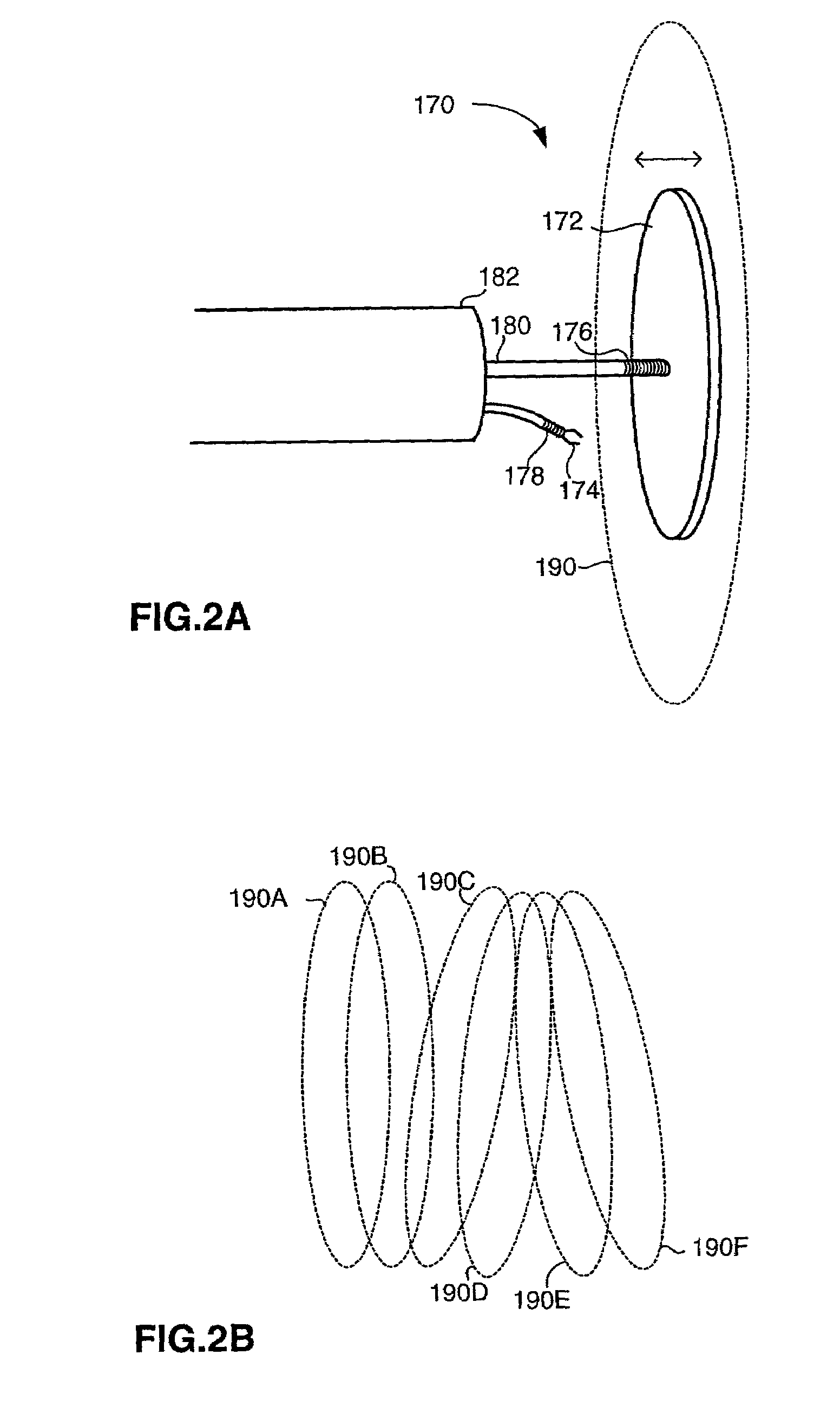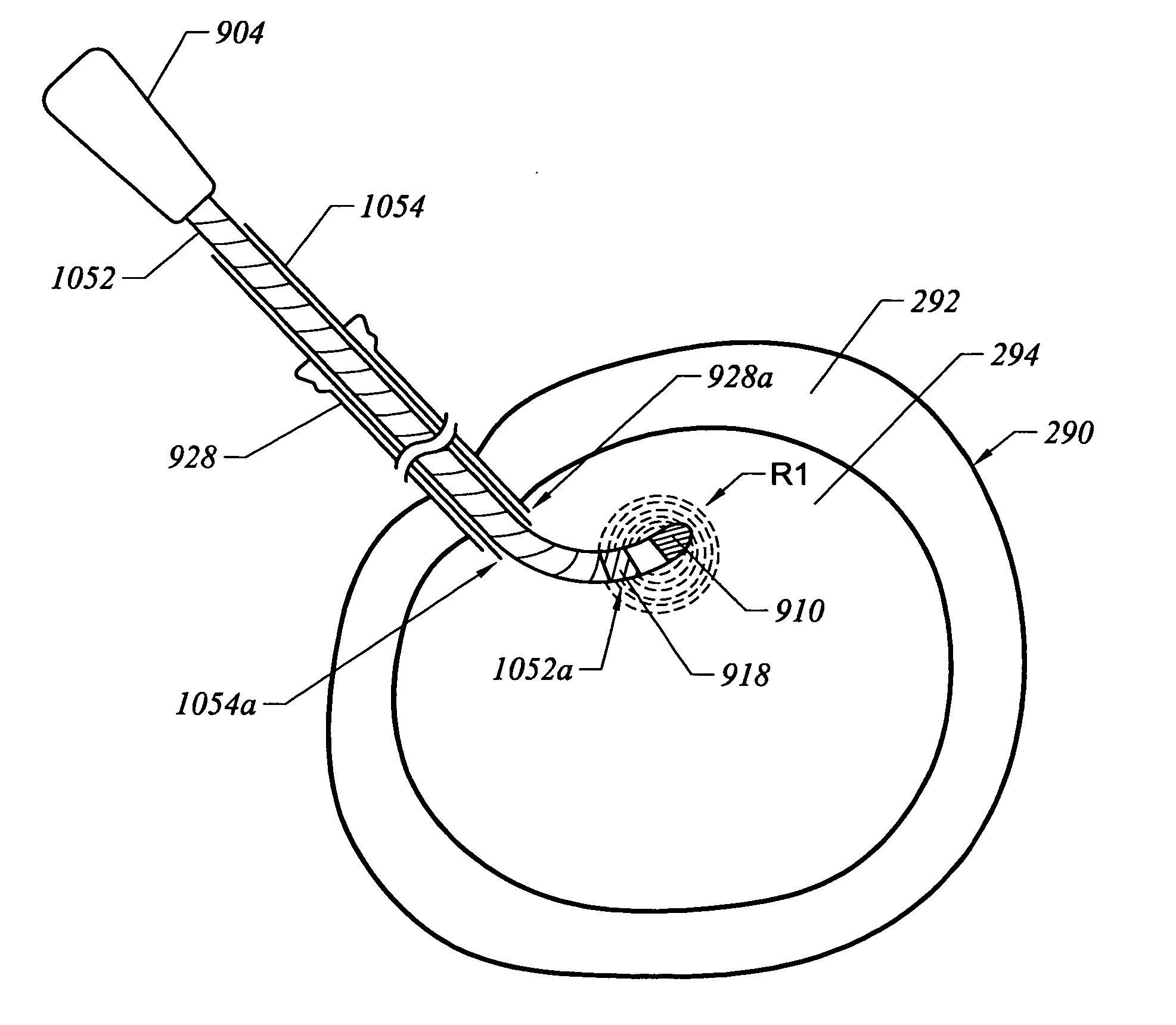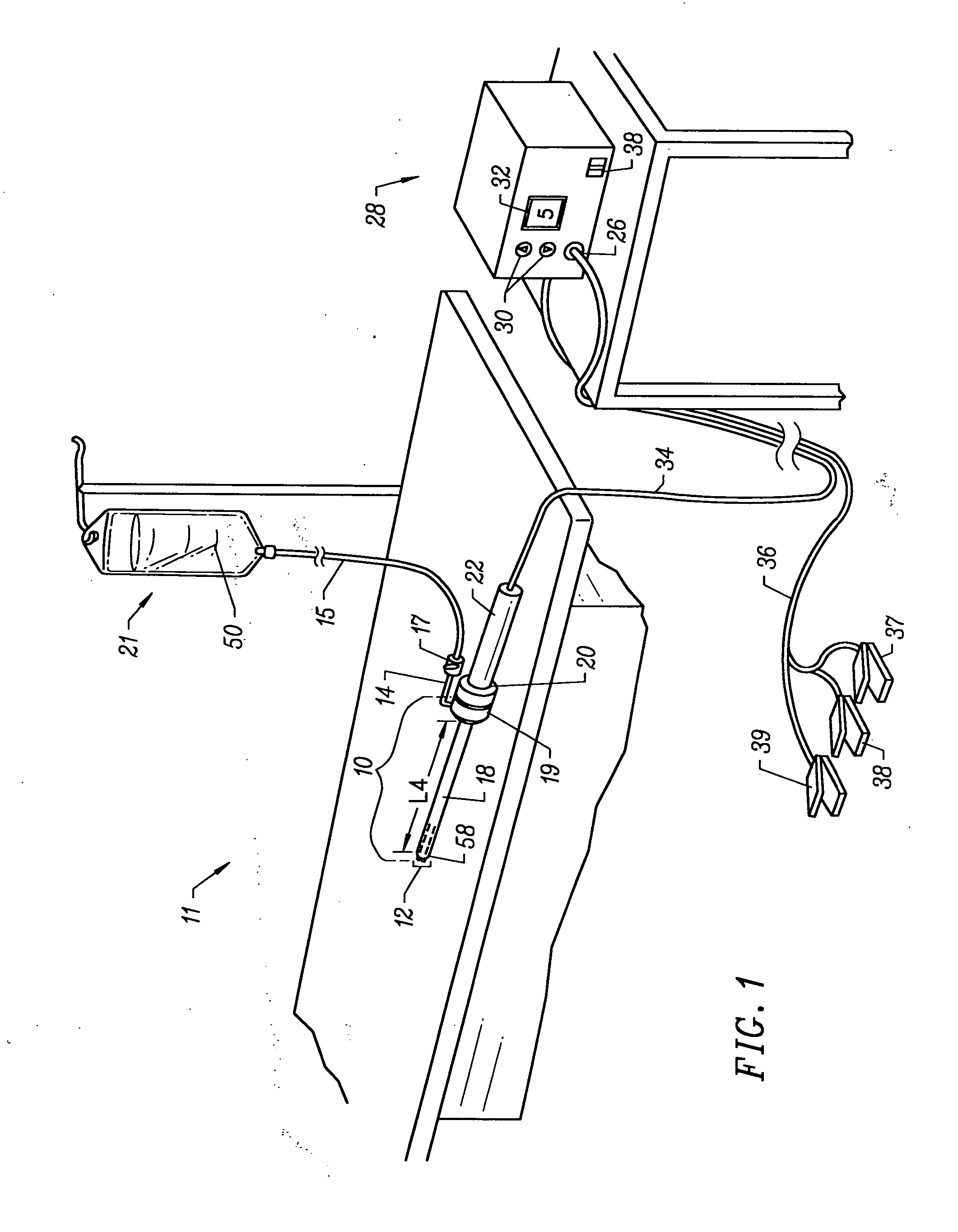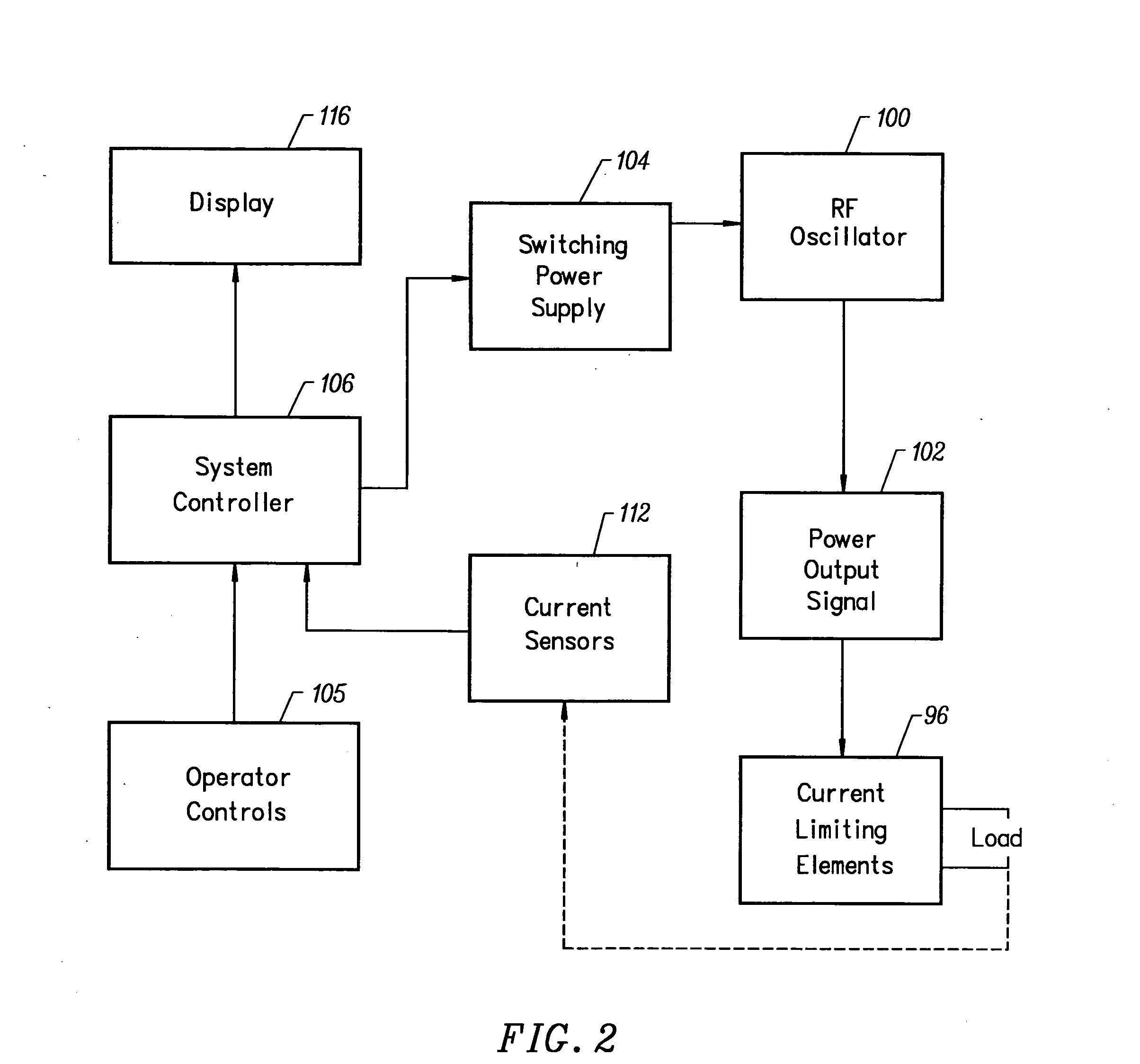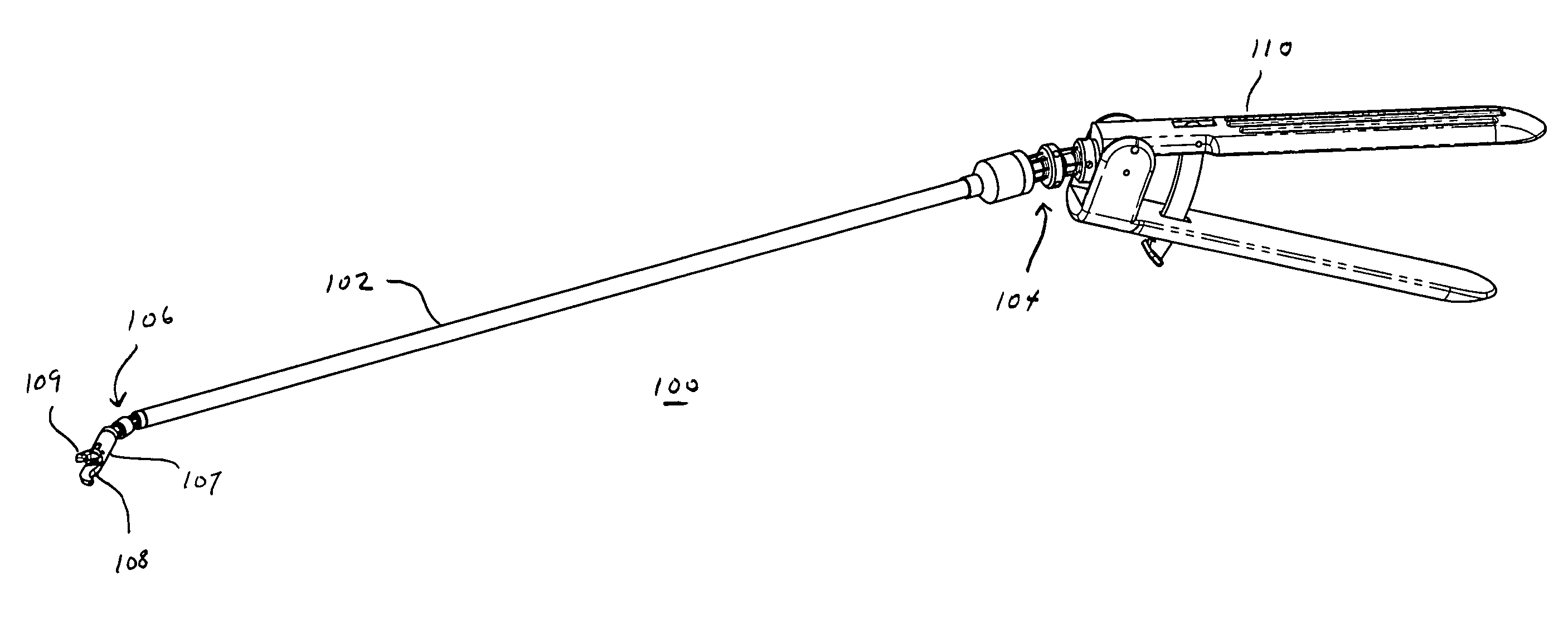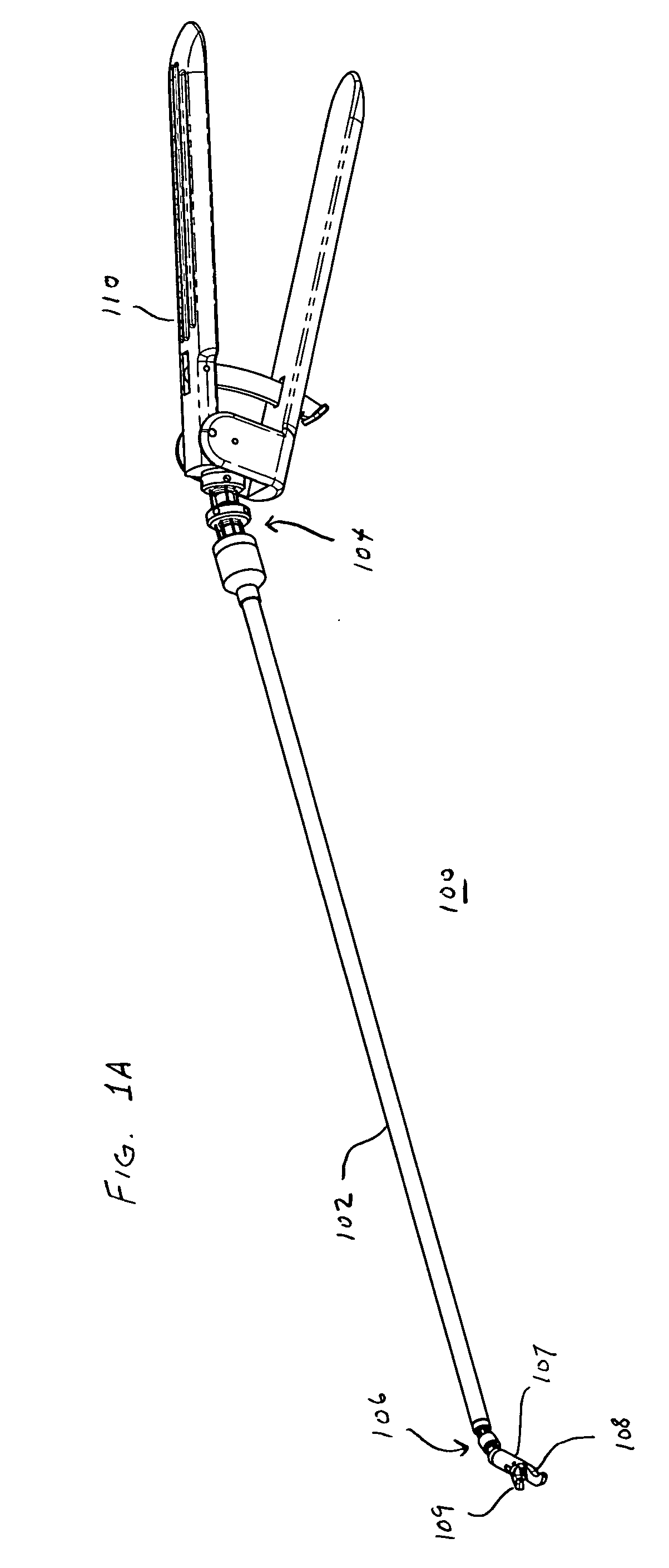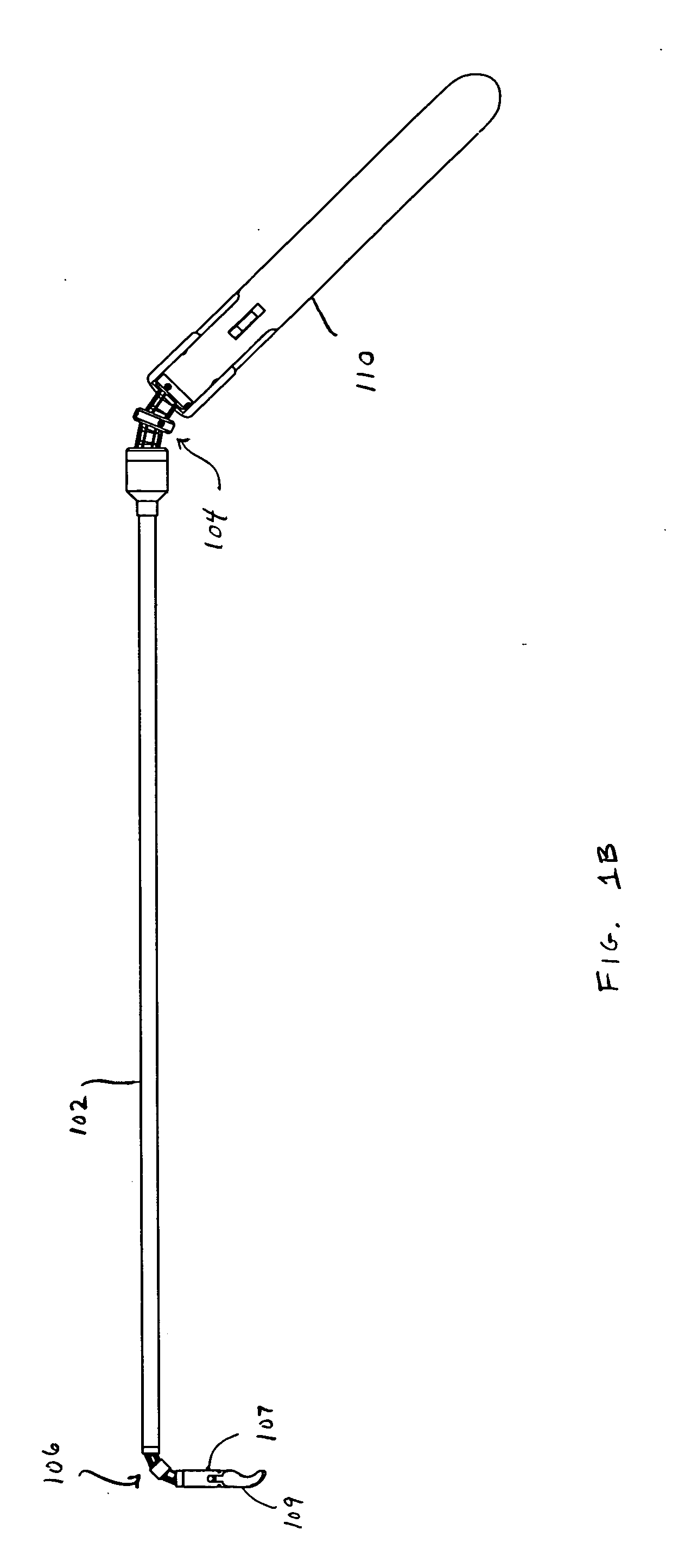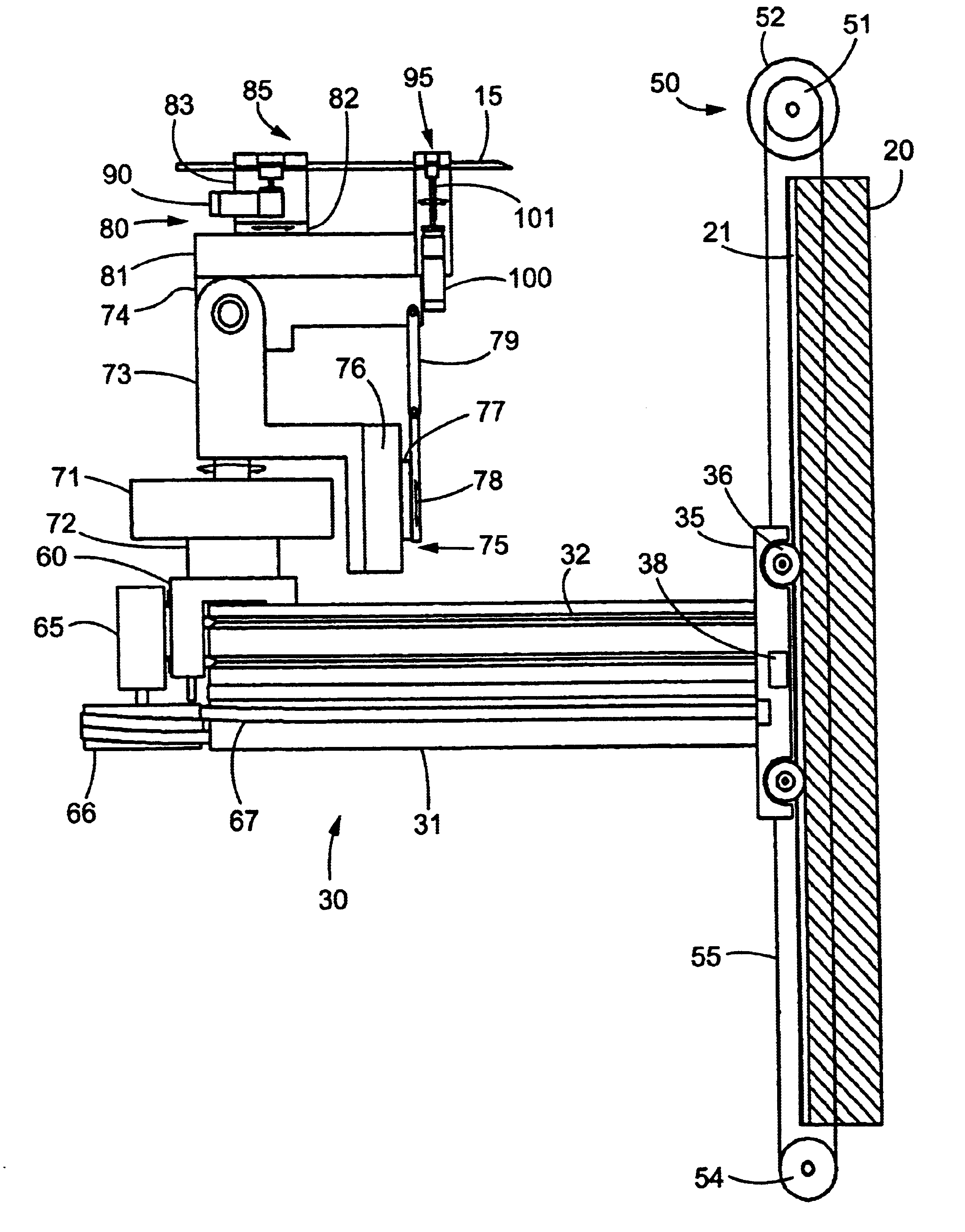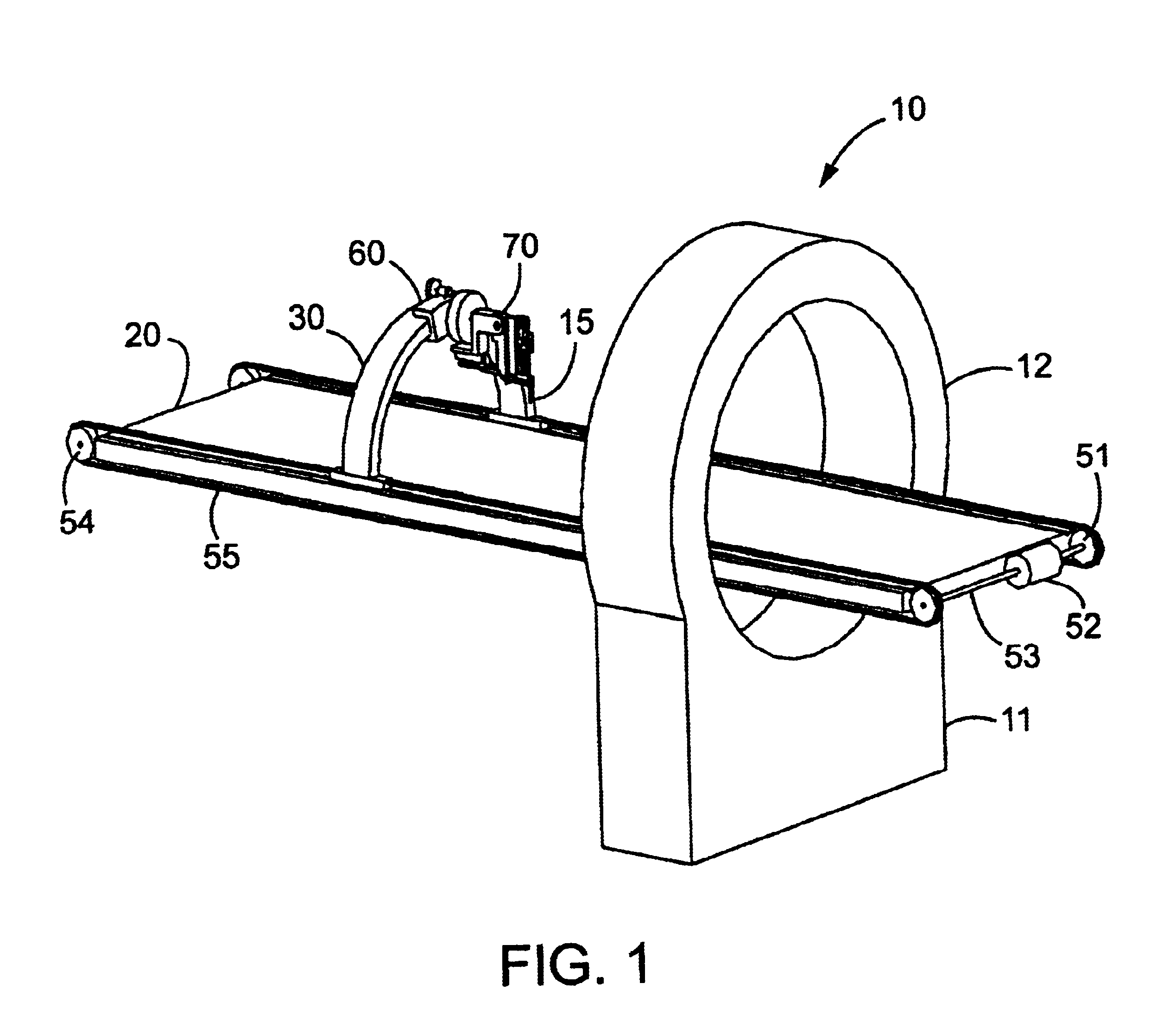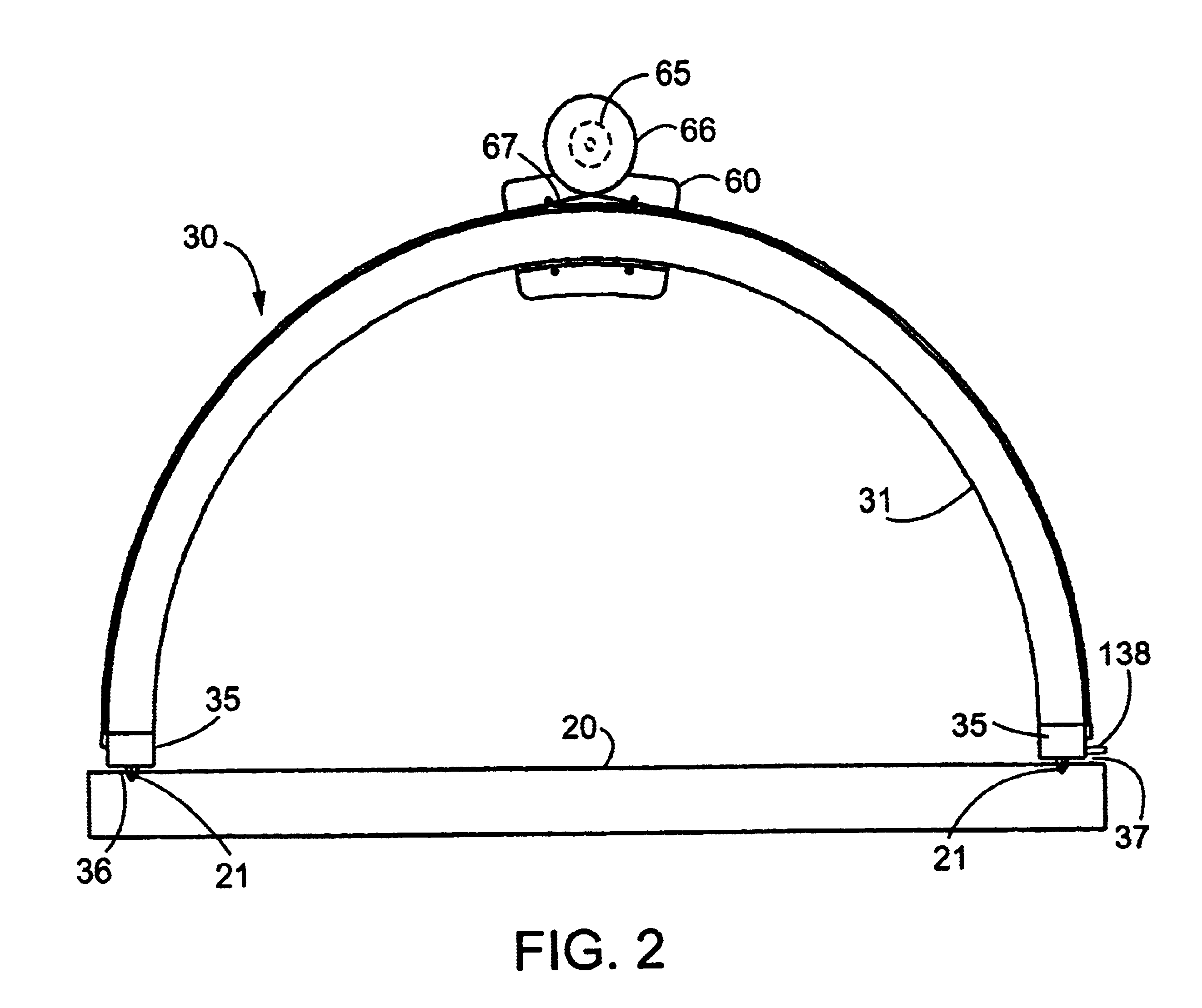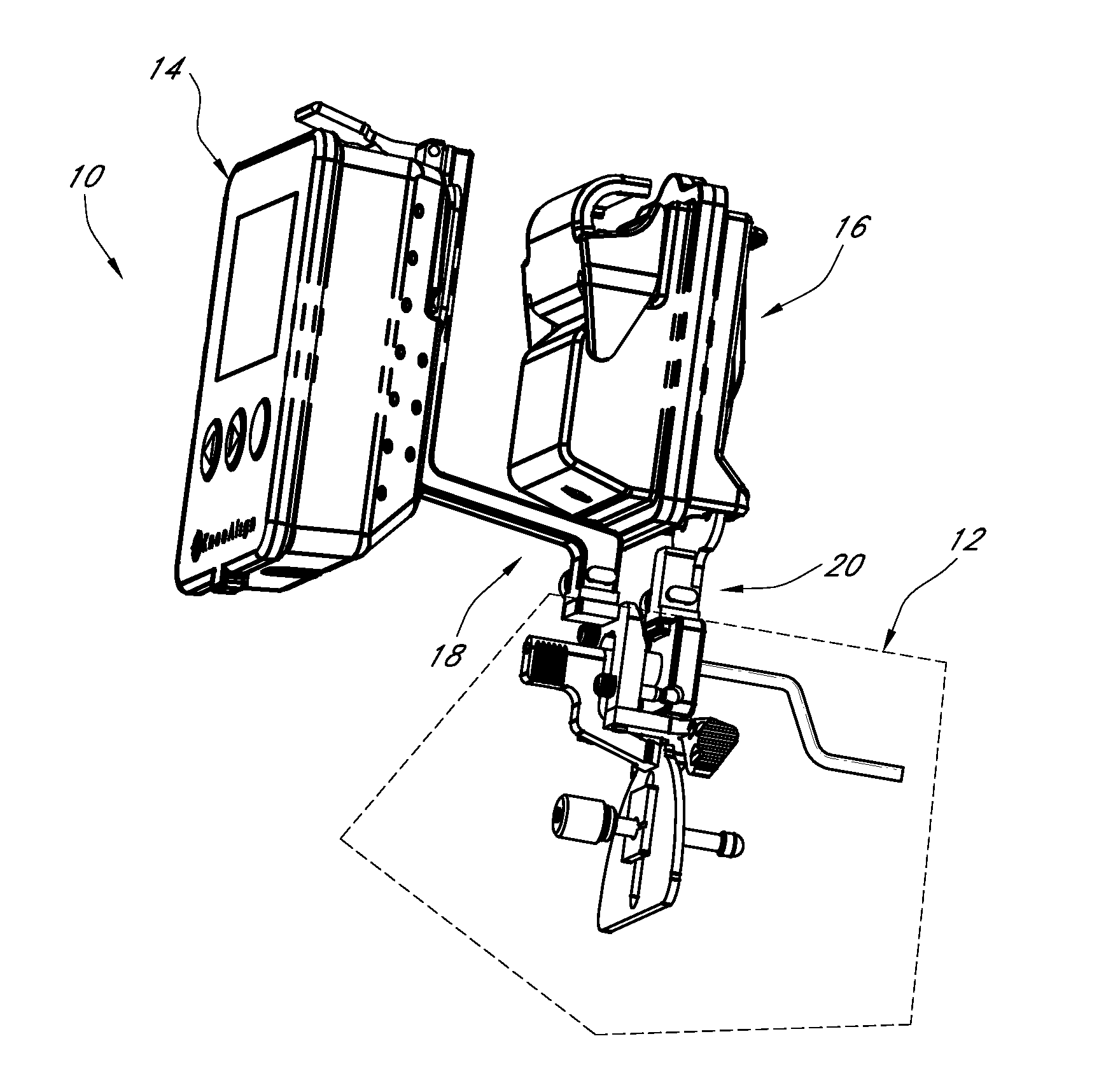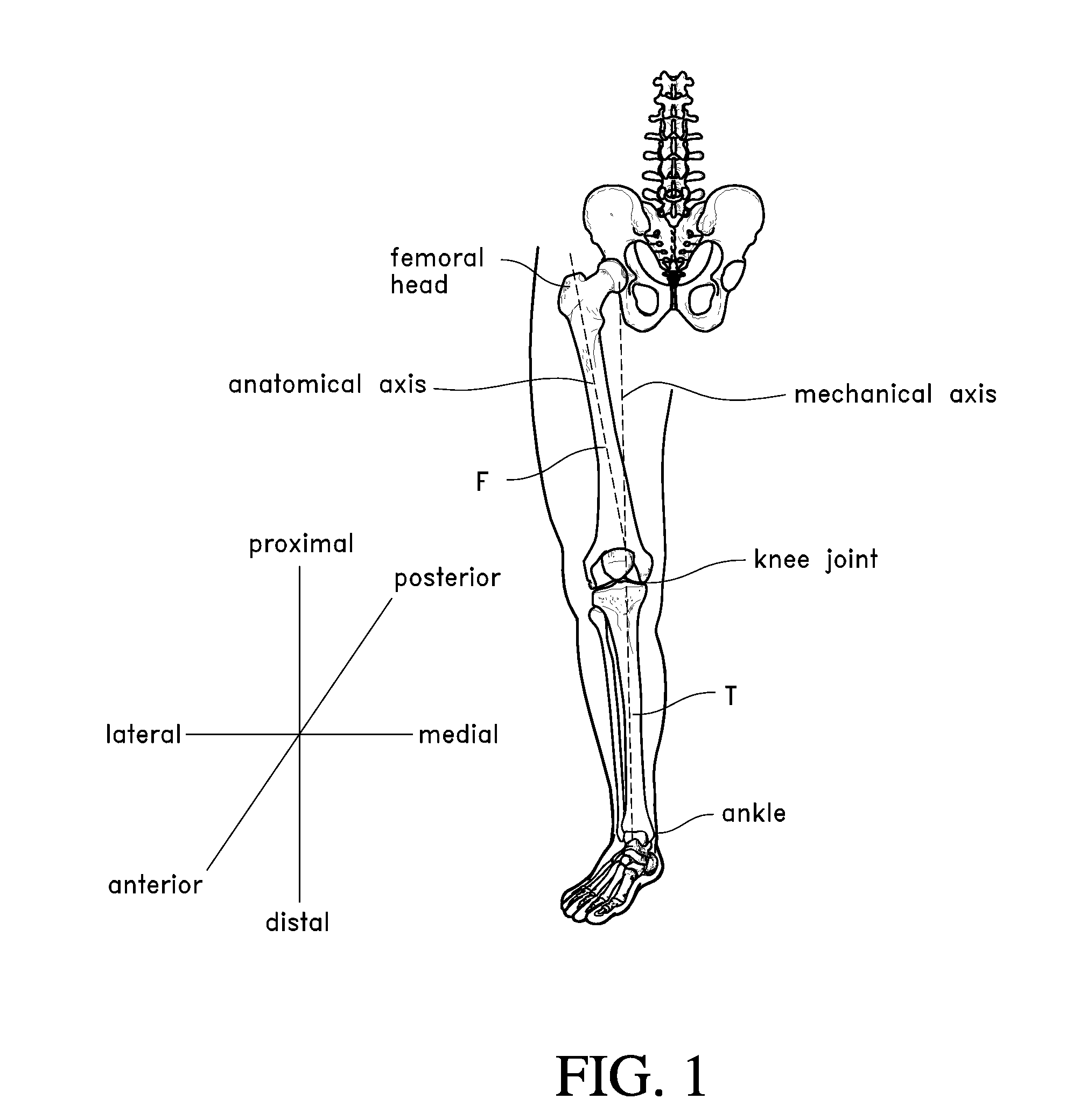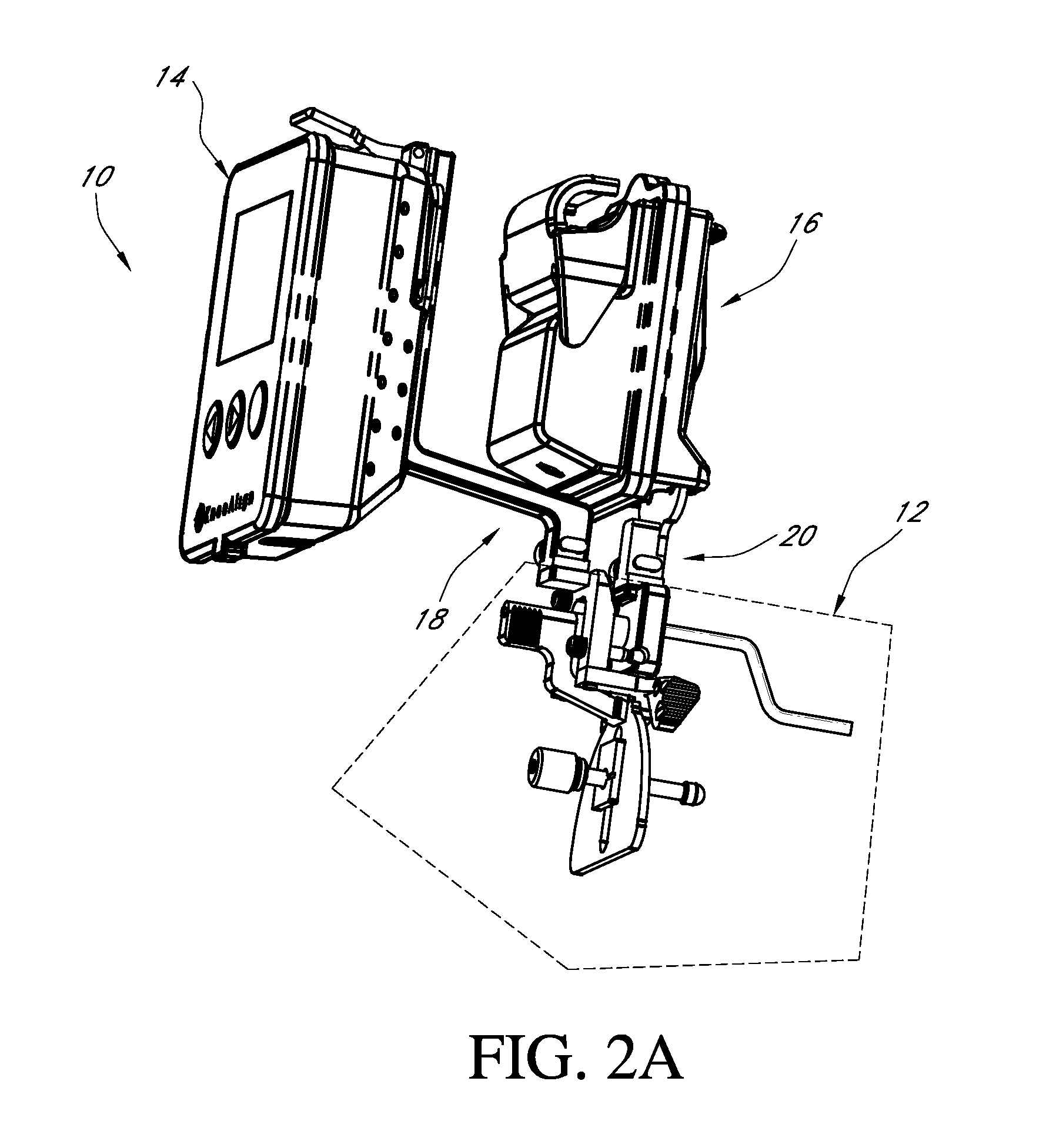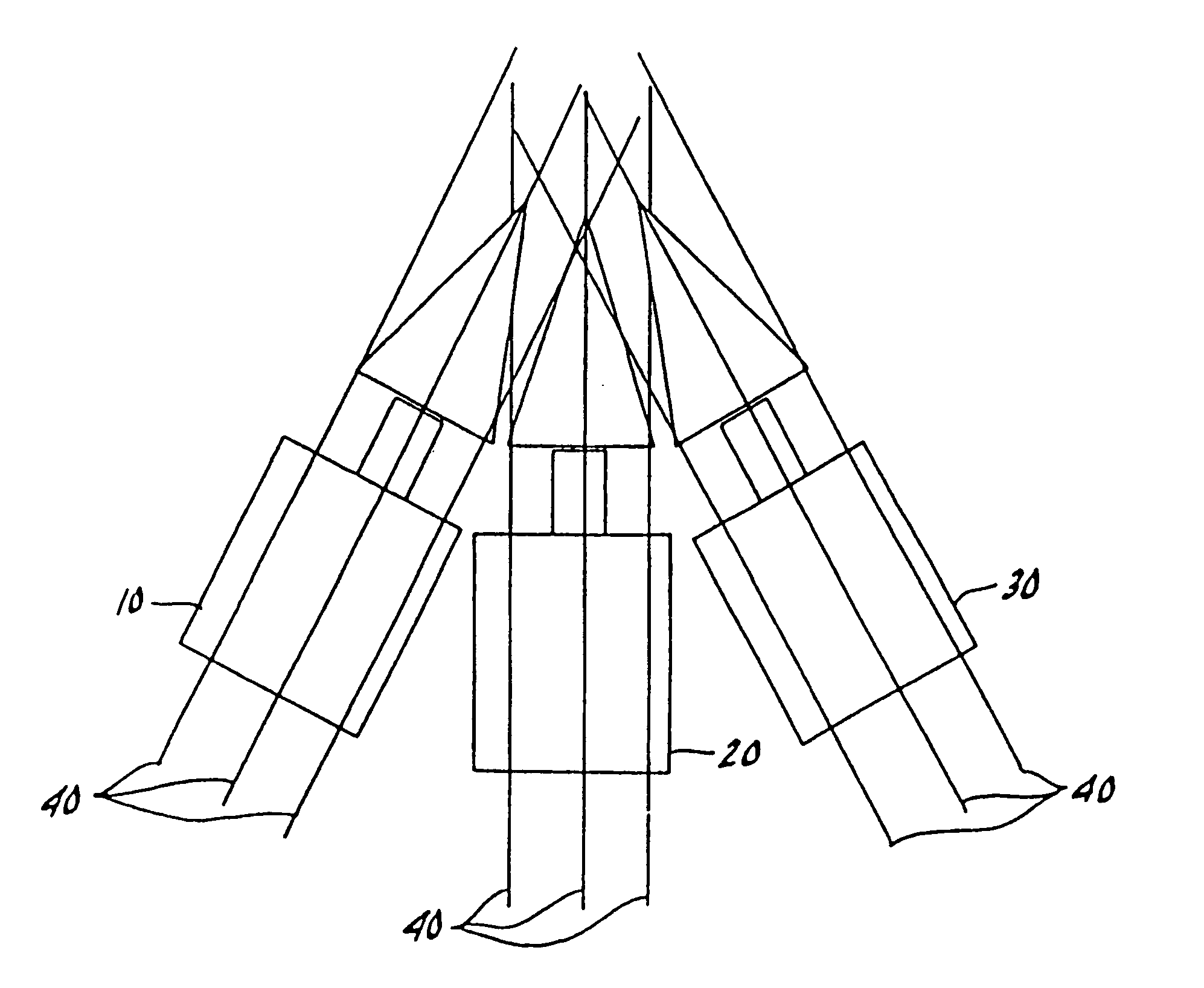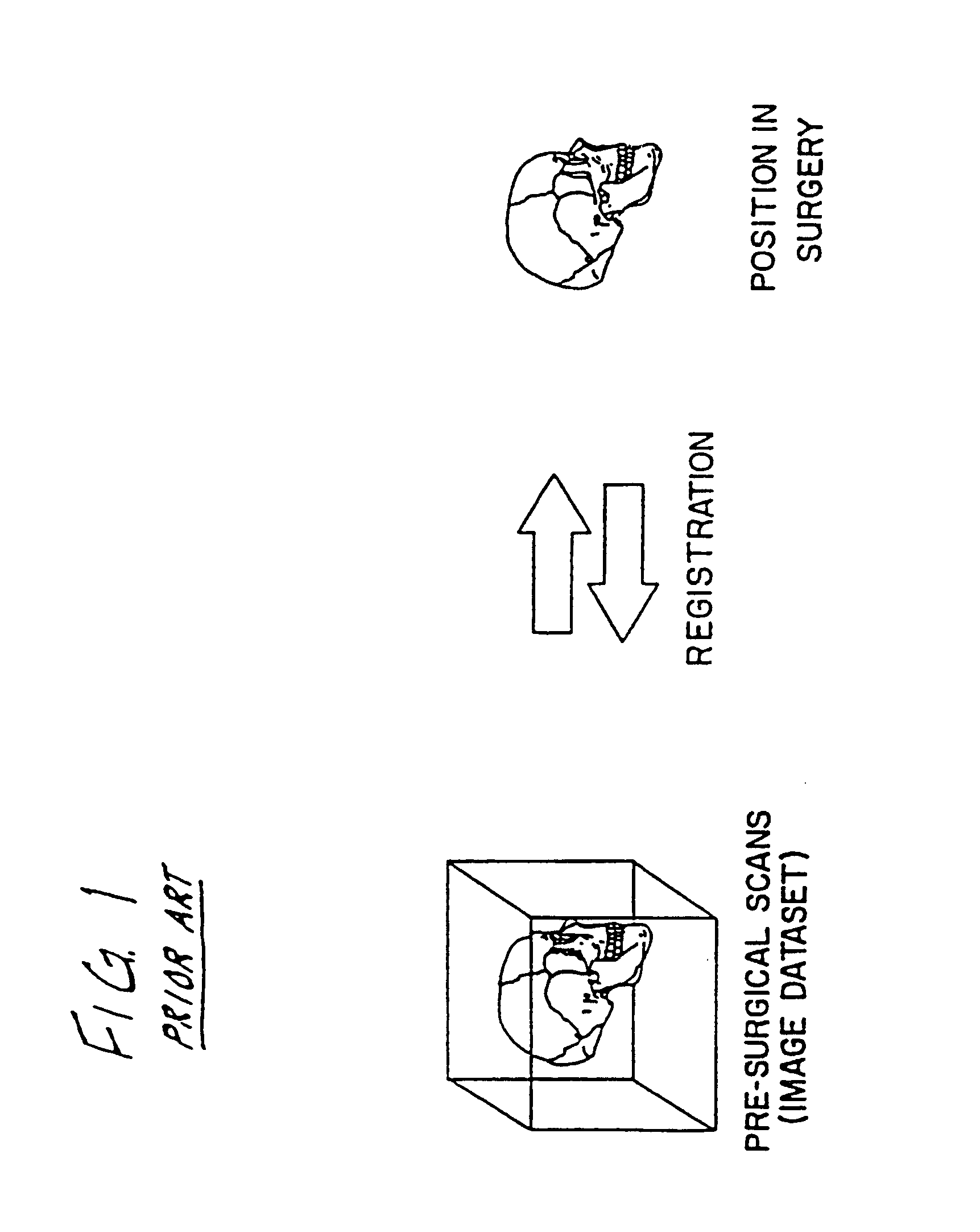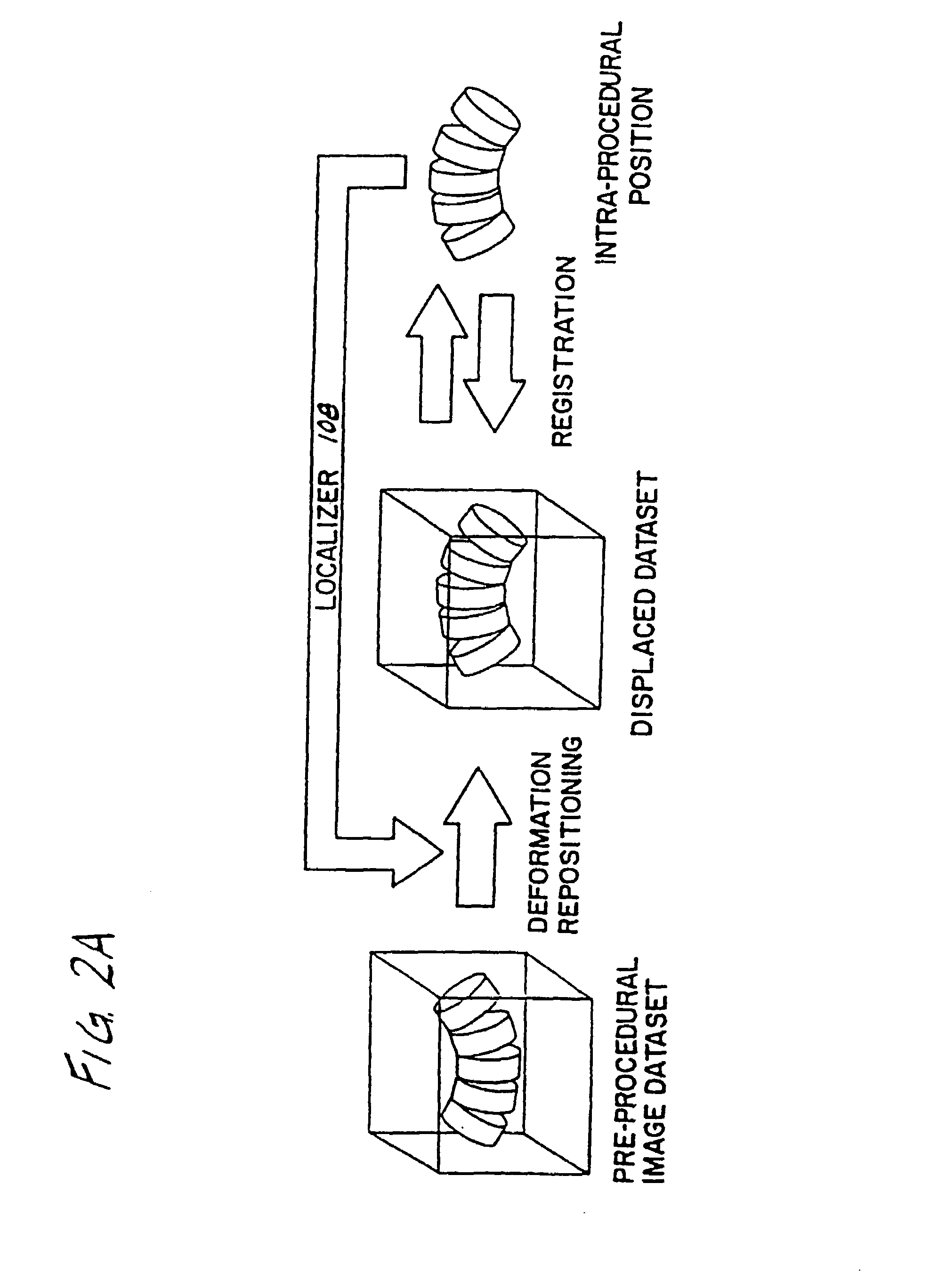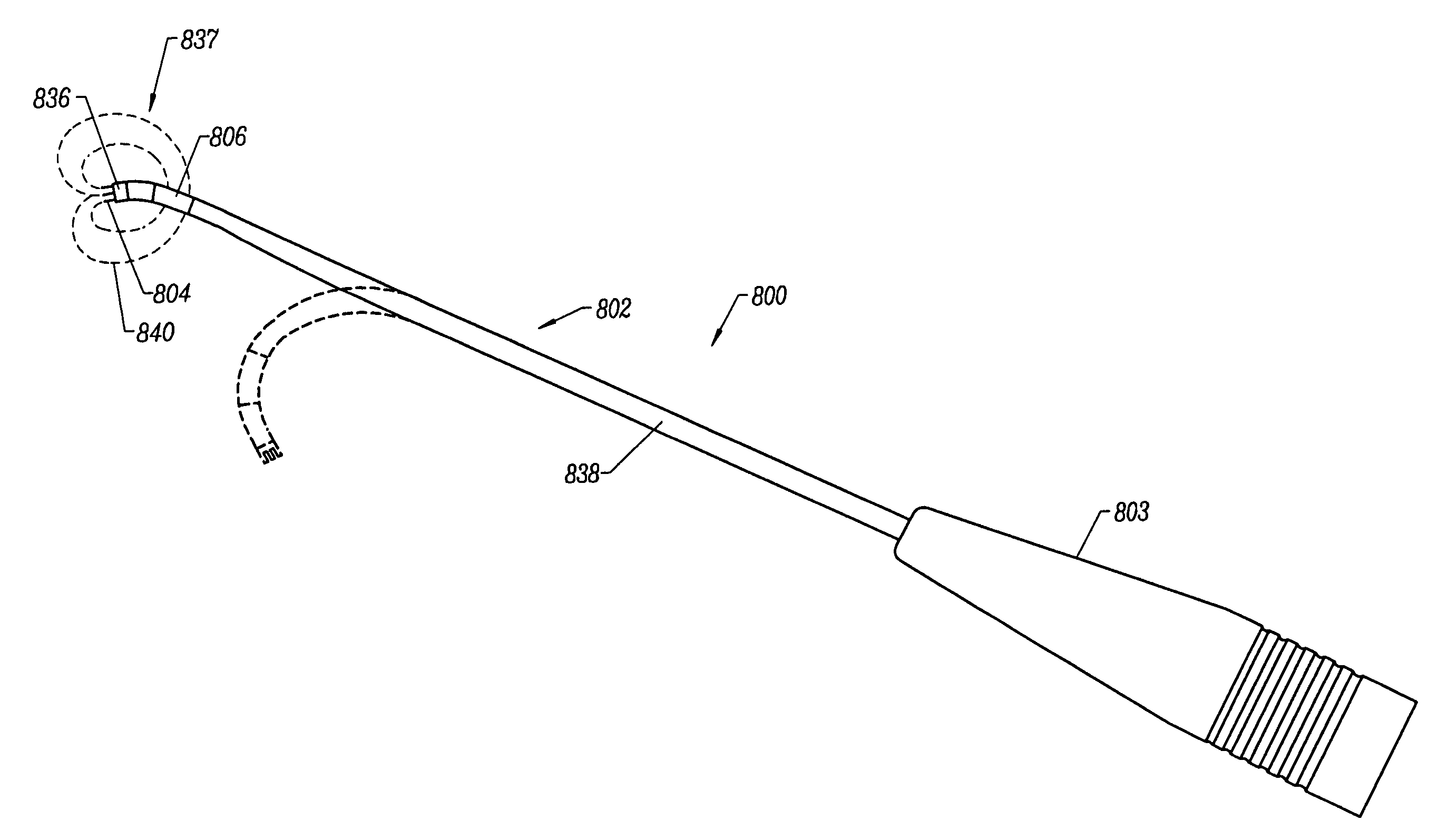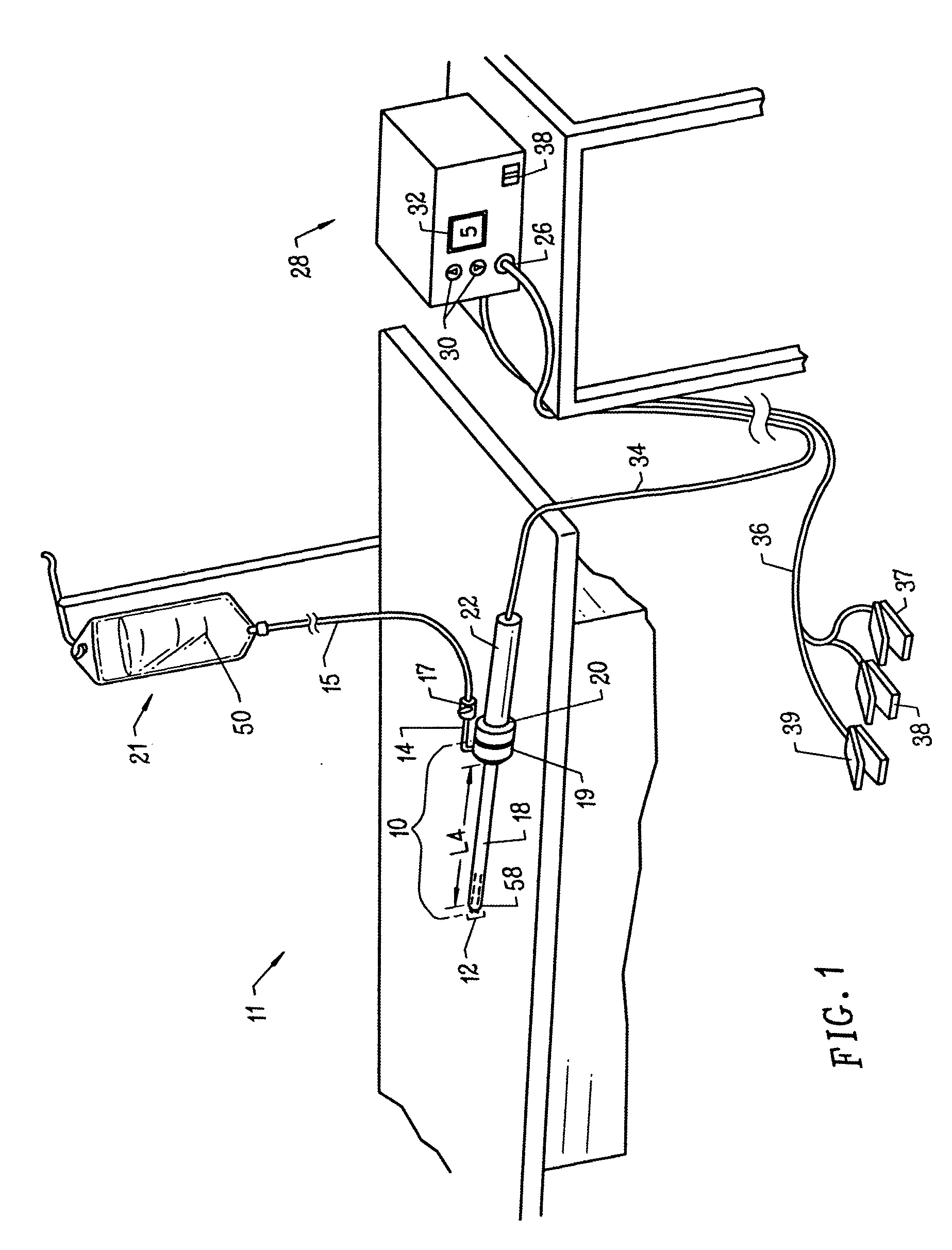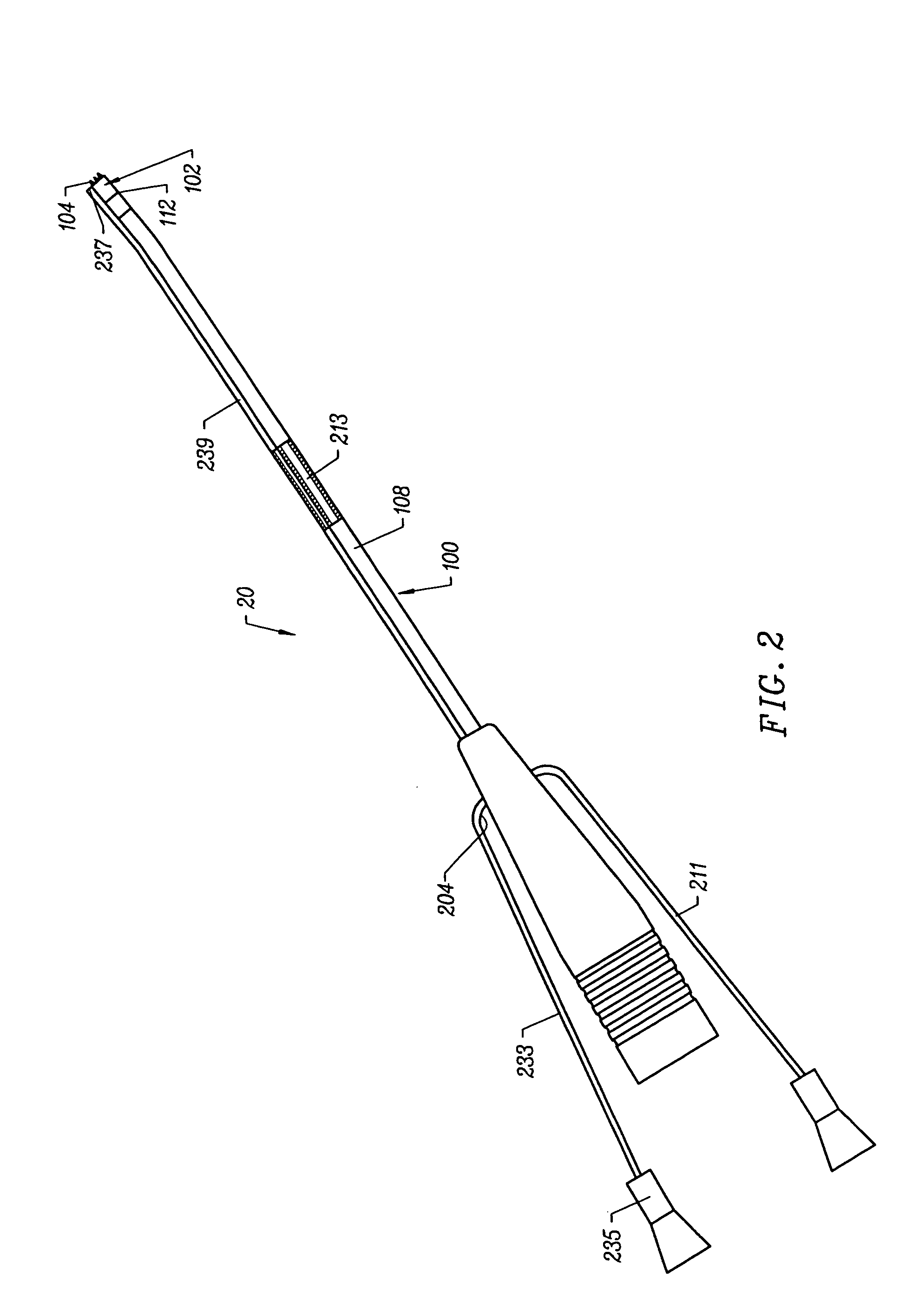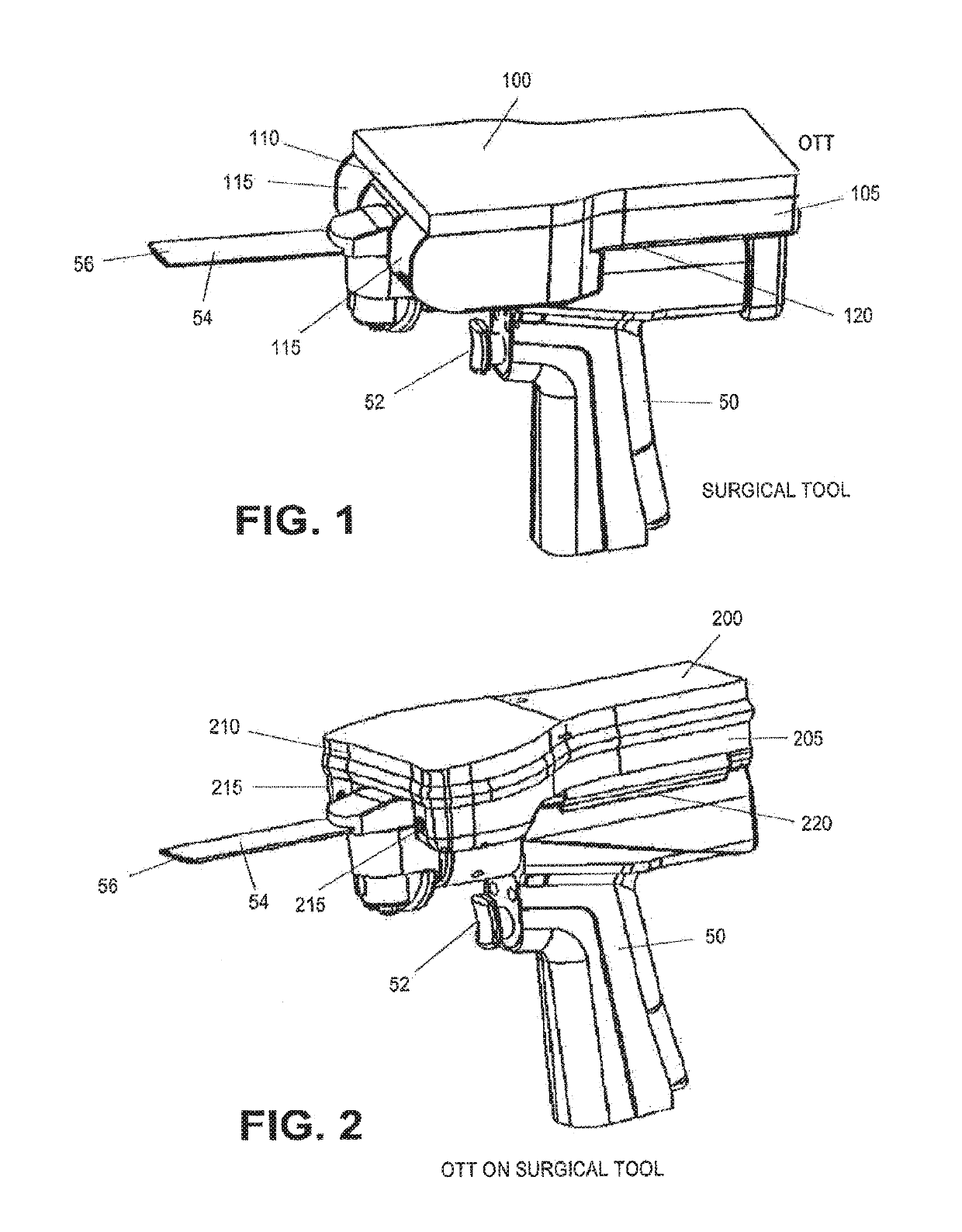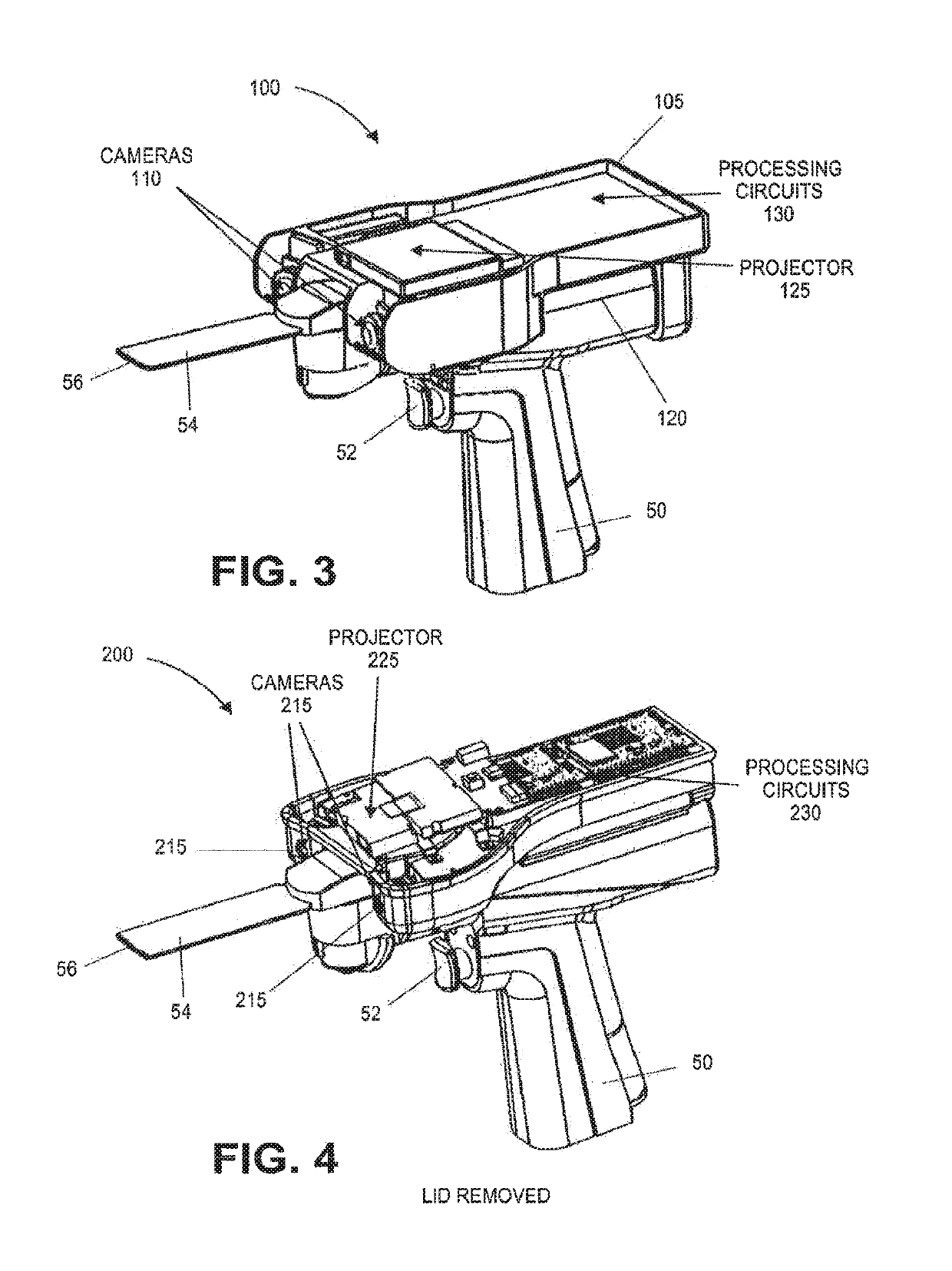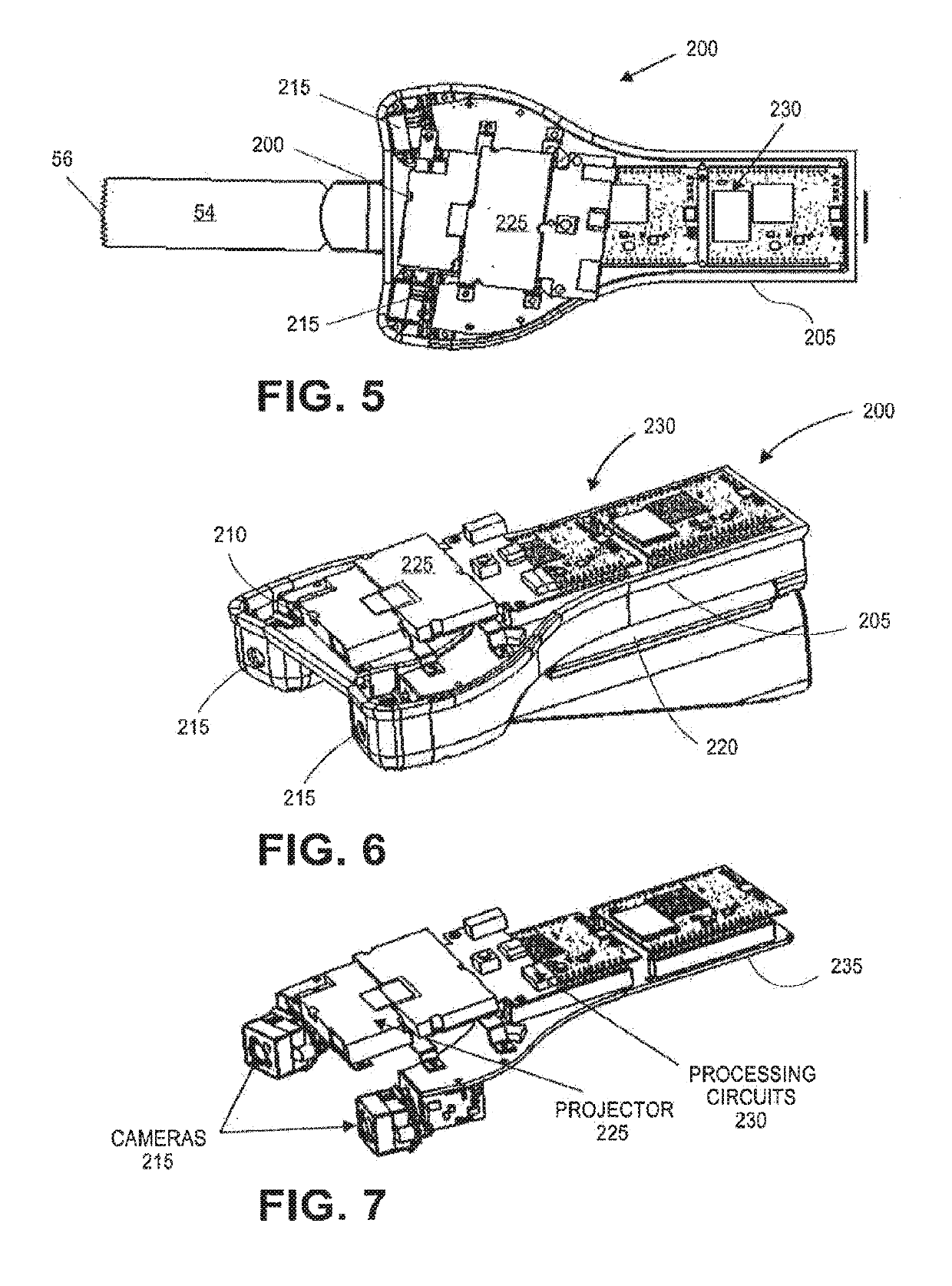Patents
Literature
5529results about "Instruments for stereotaxic surgery" patented technology
Efficacy Topic
Property
Owner
Technical Advancement
Application Domain
Technology Topic
Technology Field Word
Patent Country/Region
Patent Type
Patent Status
Application Year
Inventor
Method and apparatus for performing stereotactic surgery
A stereotactic navigation system for navigating an instrument to a target within a patient may include a stereotactic head frame, an imaging device, a tracking device, a controller and a display. The stereotactic head frame is coupled to the patient and is used to assist in guiding the instrument to the target. The imaging device captures image data of the patient and of the stereotactic head frame. The tracking device is used to track the position of the instrument relative to the stereotactic head frame. The controller receives the image data from the imaging device and identifies the stereotactic head frame in the image data and automatically registers the image data with navigable patient space upon identifying the stereotactic head frame, while the display displays the image data.
Owner:SURGICAL NAVIGATION TECH
Surgical instrument
A medical instrument that includes an instrument shaft having proximal and distal ends; a tool for performing a medical procedure; a control handle; a distal motion member for coupling the distal end of the instrument shaft to the tool; a proximal motion member for coupling the proximal end of the instrument shaft to the control handle; actuation means extending between the distal and proximal motion members for coupling motion of the proximal motion member to the distal motion member for controlling the positioning of the tool; a control tube through which the instrument shaft and tool extend; the control tube including, along the length thereof, a curved section; the curved section of the control tube, upon rotation thereof, providing an additional degree of freedom by displacing the tool out of a plane defined by the curved section of the control tube.
Owner:CAMBRIDGE ENDOSCOPIC DEVICES
Apparatus for positioning a medical instrument
InactiveUS7674270B2Reduce in quantityLess cumbersomeCannulasSurgical needlesEngineeringPositioning system
The present device provides an apparatus for securely positioning a medical instrument relative to a patient. The apparatus comprises a drive assembly for moving the medical instrument along a first axis that is substantially parallel to the length of the instrument; an adapter comprising an elongated member and a pair of cooperating hubs for connecting the drive assembly to a positioning system. The cooperating hubs serving to allow separation of sterile from non sterile components. The positioning system comprises two motors each for moving the instrument about a different axis than the drive assembly. The apparatus moving the instrument about a point which is external to the patient. The device further comprises a sterile bag which encloses the positioning system, the bag having at least one opening for receiving an axel from a sterile adapter assembly, thereby rendering the entire apparatus sterile.
Owner:LAPAROCISION
System and methods for advancing a catheter
InactiveUS7276044B2Reduce repeated x-ray exposureReduce X-ray exposureEar treatmentSurgical needlesControl systemEngineering
An advancer system is described for moving an elongate medical device within a body. The system includes a drive unit having a motor. The drive unit is configured to translate movement of the motor to the device so as to alternately advance and retract the device relative to the body. The advancer system also includes a user-operable control system configured to control the drive unit. The control system can interface with a magnetic navigation system. The above-described system allows an operating physician to control catheter advancement and retraction while remaining outside an x-ray imaging field. Thus the physician is freed from repeated x-ray exposure.
Owner:STEREOTAXIS
Guide tube control of minimally invasive surgical instruments
A telemanipulatively controlled guide tube acts as a wrist mechanism for a surgical instrument that extends through the guide tube. The instrument may be removed and replaced with another instrument. In some aspects the instruments are commercial, off the shelf minimally invasive surgical instruments.
Owner:INTUITIVE SURGICAL OPERATIONS INC
Method and Apparatus for Computer Aided Surgery
InactiveUS20080077158A1Shorten speedReduce and eliminate useMechanical/radiation/invasive therapiesDiagnosticsAutomatic controlComputer science
A number of improvements are provided relating to computer aided surgery. The improvement relates to both the methods used during computer aided surgery and the devices used during such procedures. Some of the improvement relate to controlling the selection of which data to display during a procedure and / or how the data is displayed to aid the surgeon. Other improvements relate to the structure of the tools used during a procedure and how the tools can be controlled automatically to improve the efficiency of the procedure. Still other improvements relate to methods of providing feedback during a procedure to improve either the efficiency or quality, or both, for a procedure.
Owner:BOARD OF RGT UNIV OF NEBRASKA
Hyperdexterous surgical system
InactiveUS20150025549A1Overcome deficienciesProvide flexibilityProgramme controlDiagnosticsControl signalElectronic control system
A hyperdexterous surgical system is provided. The system can include one or more surgical arms coupleable to a fixture and configured to support one or more surgical tools. The system can include an electronic control system configured to communicate electronically with the one or more robotic surgical tools. The control system can electronically control the operation of the one or more surgical tools. The system can include one or more portable handheld controllers actuatable by a surgeon to communicate one or more control signals to the one or more surgical tools via the electronic control system to operate the one or more surgical tools. The one or more portable handheld controllers can provide said one or more control signals from a plurality of locations of an operating arena, allowing a surgeon to be mobile during a surgical procedure and to remotely operate the one or more surgical tools from different locations of the operating arena.
Owner:SRI INTERNATIONAL
Systems and methods for joint replacement
Systems and methods for joint replacement are provided. The systems and methods include a surgical orientation device, a reference sensor device, and at least one orthopedic fixture. The surgical orientation device, reference sensor device, and orthopedic fixtures can be used to locate the orientation of an axis in the body, to adjust an orientation of a cutting plane or planes along a bony surface, or otherwise to assist in an orthopedic procedure(s).
Owner:ORTHALIGN
Device for fixing joint structure
Owner:MOVASU
Implantable joint prosthesis
InactiveUS20020035400A1Improve wear resistanceImprove tribological propertiesDiagnosticsJoint implantsRange of motionIntervertebral disc
The invention relates to a surgical implant that provides an artificial diarthroidal-like joint, suitable for use in replacing any joint, but particularly suitable for use as an intervertebral disc endoprosthesis. The invention contains two rigid opposing shells, each having an outer surface adapted to engage the surfaces of the bones of a joint in such a way that the shells are immobilized by friction between their outer surfaces and the surfaces of the bone. These outer surfaces are sufficiently rough that large frictional forces strongly resist any slippage between the outer surface and the bone surfaces in the joint. They may be convex, and when inserted into a milled concavity, are immediately mechanically stable. Desirably, the outer surfaces of the shells are adapted to allow for bony ingrowth, which further stabilizes the shells in place. The inner surfaces of the shells are relatively smooth, and adapted to slide easily across a portion of the outer surface of a central body disposed between the shells. The central body has a shape that cooperates with the shape of the inner surface of the shell so as to provide a range of motion similar to that provided by a healthy joint. A flexible sheath extends between edges of the opposing shells. The inner surface of this sheath, together with the inner surfaces of the rigid shells, defines a cavity encasing the central body. At least a portion of this cavity is filled with a fluid lubricant, further decreasing the frictional force between inner surfaces of the shell and the surface of the central body.
Owner:SPINAL DYNAMICS CORP
Methods for targeted electrosurgery on contained herniated discs
InactiveUS7179255B2Reduce pressureReduced neckingEnemata/irrigatorsHeart valvesFibrous ringCorneal ablation
Apparatus and methods for treating an intervertebral disc by ablation of disc tissue. A method of the invention includes positioning at least one active electrode within the intervertebral disc, and applying at least a first high frequency voltage between the active electrode(s) and one or more return electrode(s), wherein the volume of the nucleus pulposus is decreased, pressure exerted by the nucleus pulposus on the annulus fibrosus is reduced, and discogenic pain of a patient is alleviated. In other embodiments, a curved or steerable probe is guided to a specific target site within a disc to be treated, and the disc tissue at the target site is ablated by application of at least a first high frequency voltage between the active electrode(s) and one or more return electrode(s). A method of making an electrosurgical probe is also disclosed.
Owner:ARTHROCARE
Systems and methods for performing image guided procedures within the ear, nose, throat and paranasal sinuses
Devices, systems and methods for performing image guided interventional and surgical procedures, including various procedures to treat sinusitis and other disorders of the paranasal sinuses, ears, nose or throat.
Owner:ACCLARENT INC
Methods and devices for performing procedures within the ear, nose, throat and paranasal sinuses
Devices, systems and methods for performing image guided interventional and surgical procedures, including various procedures to treat sinusitis and other disorders of the paranasal sinuses, ears, nose or throat.
Owner:ACCLARENT INC
Device and method for assisting laparoscopic surgery - rule based approach
InactiveUS20140228632A1Prevent movementConstant field of viewUltrasonic/sonic/infrasonic diagnosticsMechanical/radiation/invasive therapiesImaging processingControl system
The present invention provides a surgical controlling system, comprising: a. at least one endoscope adapted to provide real-time image of surgical environment of a human body; b. at least one processing means, adapted to real time define n element within said real-time image of surgical environment of a human body; each of said elements is characterized by predetermined characteristics; c. image processing means in communication with said endoscope, adapted to image process said real-time image and to provide real time updates of said predetermined characteristics; d. a communicable database, in communication with said processing means and said image processing means, adapted to store said predetermined characteristics and said updated characteristics; wherein said system is adapted to notify if said updated characteristics are substantially different from said predetermined characteristics.
Owner:TRANSENTERIX EURO SARL
Devices, systems and methods for treating disorders of the ear, nose and throat
Sinusitis, mucocysts, tumors, infections, hearing disorders, choanal atresia, fractures and other disorders of the paranasal sinuses, Eustachian tubes, Lachrymal ducts and other ear, nose, throat and mouth structures are diagnosed and / or treated using minimally invasive approaches and, in many cases, flexible catheters as opposed to instruments having rigid shafts. Various diagnostic procedures and devices are used to perform imaging studies, mucus flow studies, air / gas flow studies, anatomic dimension studies and endoscopic studies. Access and occluding devices may be used to facilitate insertion of working devices such asendoscopes, wires, probes, needles, catheters, balloon catheters, dilation catheters, dilators, balloons, tissue cutting or remodeling devices, suction or irrigation devices, imaging devices, sizing devices, biopsy devices, image-guided devices containing sensors or transmitters, electrosurgical devices, energy emitting devices, devices for injecting diagnostic or therapeutic agents, devices for implanting devices such as stents, substance eluting or delivering devices and implants, etc.
Owner:ACCLARENT INC
Minimally invasive surgical system
ActiveUS20080065105A1Restricts lateral movementMechanical/radiation/invasive therapiesCannulasLess invasive surgeryEngineering
The distal end of a surgical instrument is movable in all six Cartesian degrees of freedom independently of other components of a telemanipulated surgical system. The surgical instrument extends trough a guide tube. The distal end is moved by actuators that are telemanipulatively controlled.
Owner:INTUITIVE SURGICAL OPERATIONS INC
Methods for repairing damaged intervertebral discs
InactiveUS7318823B2Reduce internal pressureReduce moistureBiocideOrganic chemistryIntervertebral discActive electrode
Apparatus and methods for treating an intervertebral disc by ablation of disc tissue. A method of the invention includes positioning at least one active electrode within the intervertebral disc, and applying at least a first high frequency voltage between the active electrode(s) and one or more return electrode(s), wherein the volume of the nucleus pulposus is decreased, pressure exerted by the nucleus pulposus on the annulus fibrosus is reduced, and discogenic pain of a patient is alleviated. In other embodiments, a curved or steerable probe is guided to a specific target site within a disc to be treated, and the disc tissue at the target site is ablated by application of at least a first high frequency voltage between the active electrode(s) and one or more return electrode(s). A method of making an electrosurgical probe is also disclosed.
Owner:ARTHROCARE
Apparatus and method for tissue thickness sensing
A surgical instrument is provided. The surgical instrument includes: a test end effector including a test jaw assembly having a pair of jaws configured to clamp about tissue and at least one sensor configured to measure at least one tissue property; and a handle assembly configured to couple to the treatment end effector. The handle assembly includes: a drive assembly; a motor operatively coupled to the drive assembly; and a controller operatively coupled to the motor, the controller configured to control operation of the motor to actuate the test end effector to measure the at least one tissue property and to determine, based on the at least one tissue property, at least one suitable treatment end effector.
Owner:TYCO HEALTHCARE GRP LP
Six degree of freedom alignment display for medical procedures
A display and navigation system for use in guiding a medical device to a target in a patient includes a tracking sensor, a tracking device and display. The tracking sensor is associated with the medical device and is used to track the medical device. The tracking device tracks the medical device with the tracking sensor. The display includes indicia illustrating at least five degree of freedom information and indicia of the medical device in relation to the five degree of freedom information.
Owner:SURGICAL NAVIGATION TECH
Implantable joint prosthesis
ActiveUS20020128715A1Increased durabilityImprove stabilityDiagnosticsJoint implantsIntervertebral discSurgical implant
The invention relates to a surgical implant that provides an artificial diarthroidal-like joint, suitable for use in replacing any joint, but particularly suitable for use as an intervertebral disc endoprosthesis. The invention contains two rigid opposing shells, each having an outer surface adapted to engage the surfaces of the bones of a joint in such a way that the shells are immobilized by friction between their outer surfaces and the surfaces of the bone. These outer surfaces are sufficiently rough that large frictional forces strongly resist any slippage between the outer surface and the bone surfaces in the joint. They may be convex, and when inserted into a milled concavity, are immediately mechanically stable. Desirably, the outer surfaces of the shells are adapted to allow for bony ingrowth, which further stabilizes the shells in place. The inner surfaces of the shells are relatively smooth, and adapted to slide easily across a portion of the outer surface of a central body disposed between the shells. The central body has a shape that cooperates with the shape of the inner surface of the shell so as to provide a range of motion similar to that provided by a healthy joint. A flexible sheath extends between edges of the opposing shells. The inner surface of this sheath, together with the inner surfaces of the rigid shells, defines a cavity encasing the central body. At least a portion of this cavity is filled with a fluid lubricant, further decreasing the frictional force between inner surfaces of the shell and the surface of the central body.
Owner:COMPANION SPINE LLC
Methods and devices for performing procedures within the ear, nose, throat and paranasal sinuses
Devices, systems and methods for performing image guided interventional and surgical procedures, including various procedures to treat sinusitis and other disorders of the paranasal sinuses, ears, nose or throat.
Owner:ACCLARENT INC
Modular manipulator support for robotic surgery
InactiveUS7763015B2Simple structureReduce complexityDiagnosticsRobotSurgical instrumentationModularity
A robotic surgery system comprises a mounting base, a plurality of surgical instruments, and an articulate support assembly. Each instrument is insertable into a patient through an associated minimally invasive aperture to a desired internal surgical site. The articulate support assembly movably supports the instruments relative to the base. The support generally comprises an orienting platform, a platform linkage movably supporting the orienting platform relative to the base, and a plurality of manipulators mounted to the orienting platform, wherein each manipulator movably supports an associated instrument.
Owner:INTUITIVE SURGICAL OPERATIONS INC
Method and apparatus for real time quantitative three-dimensional image reconstruction of a moving organ and intra-body navigation
InactiveUS7343195B2Operating tablesUsing subsonic/sonic/ultrasonic vibration meansImage detectionMedical imaging
Medical imaging and navigation system including a processor, a medical positioning system (MPS), a two-dimensional imaging system and an inspected organ monitor interface, the MPS including an imaging MPS sensor, the two-dimensional imaging system including an image detector, the processor being coupled to a display unit and to a database, the MPS being coupled to the processor, the imaging MPS sensor being firmly attached to the image detector, the two-dimensional imaging system being coupled to the processor, the image detector being firmly attached to an imaging catheter.
Owner:ST JUDE MEDICAL INT HLDG SARL
Methods and apparatus for treating intervertebral discs
InactiveUS20050010205A1Minimal and collateral damageLower the volumeDiagnosticsSurgical needlesMedicineIntervertebral disc
Apparatus and methods for treating a target tissue by delivering a fluid at a defined temperature to a patient's body. An apparatus of the invention includes a fluid delivery unit for delivering fluid in at least close proximity to the target tissue, an aspiration unit for withdrawing the fluid, and a fluid source unit for providing the fluid at the defined temperature. A method of the invention includes forming a void in at least close proximity to the target tissue, and circulating a preheated fluid through the void, wherein the target tissue undergoes adjustment from body temperature to a treatment temperature due to heat exchange between the fluid and the target tissue.
Owner:ARTHROCARE
Link systems and articulation mechanisms for remote manipulation of surgical or diagnostic tools
ActiveUS20050273084A1Reduce and eliminate excess cable slackReduce and eliminate and tensionEar treatmentEndoscopesEngineeringDiagnostic instrument
Owner:INTUITIVE SURGICAL OPERATIONS INC
Medical manipulator for use with an imaging device
InactiveUS6665554B1Easy to insertLess stressSurgical needlesVaccination/ovulation diagnosticsDegrees of freedomEngineering
A manipulator for use in medical procedures can manipulate a medical tool with one or more degrees of freedom with respect to a patient. The manipulator is particularly useful for positioning a medical tool with respect to a patient disposed inside an imaging device such as a computer tomography machine.
Owner:MICRODEXTERITY SYST
Systems and methods for joint replacement
ActiveUS20110208093A1Precise positioningSurgical navigation systemsPerson identificationOrthopedic ProceduresEngineering
Systems and methods for joint replacement are provided. The systems and methods include a surgical orientation device, a reference sensor device, and at least one orthopedic fixture. The surgical orientation device, reference sensor device, and orthopedic fixtures can be used to locate the orientation of an axis in the body, to adjust an orientation of a cutting plane or planes along a bony surface, or otherwise to assist in an orthopedic procedure(s).
Owner:ORTHALIGN
Surgical navigation systems including reference and localization frames
A system for use during a medical or surgical procedure on a body. The system generates an image representing the position of one or more body elements during the procedure using scans generated by a scanner prior or during the procedure. The image data set has reference points for each of the body elements, the reference points of a particular body element having a fixed spatial relation to the particular body element. The system includes an apparatus for identifying, during the procedure, the relative position of each of the reference points of each of the body elements to be displayed. The system also includes a processor for modifying the image data set according to the identified relative position of each of the reference points during the procedure, as identified by the identifying apparatus, said processor generating a displaced image data set representing the position of the body elements during the procedure. The system also includes a display utilizing the displaced image data set generated by the processor, illustrating the relative position of the body elements during the procedure. Methods relating to the system are also disclosed. Also disclosed are devices for use with a surgical navigation system having a sensor array which is in communication with the device to identify its position. The device may be a reference frame for attachment of a body part of the patient, such as a cranial reference arc frame for attachment to the head or a spine reference arc frame for attachment to the spine. The device may also be a localization frame for positioning an instrument relative to a body part, such as a localization biopsy guide frame for positioning a biopsy needle, a localization drill guide assembly for positioning a drill bit, a localization drill yoke assembly for positioning a drill, or a ventriculostomy probe for positioning a catheter.
Owner:SURGICAL NAVIGATION TECH +1
Systems and methods for electrosurgery
InactiveUS7270658B2Use performanceAvoid cloggingSurgical needlesEndoscopesIntervertebral discSpinal cord
Methods and apparatus for selectively applying electrical energy to a target location within a patient's body, particularly including tissue in the spine. In a method of the invention high frequency (RF) electrical energy is applied to one or more active electrodes on an electrosurgical probe in the presence of an electrically conductive fluid to remove, contract or otherwise modify the structure of tissue targeted for treatment. In one aspect, a dura mater and spinal cord are insulated from the electrical energy by an insulator positioned on a non-active side of the probe. In another aspect, a plasma is aggressively formed in the electrically conductive fluid by delivering a conductive fluid to a distal end portion of the probe and aspirating the fluid from a location proximal of the return electrode. In another aspect, a distal end of an electrosurgical probe having at least one electrode on a biased, curved, bent, or steerable shaft is guided or steered to a target site within an intervertebral disc having a disc defect for treatment of tissue to be treated at the target site by the selective application of electrical energy thereto.
Owner:ARTHROCARE
On-board tool tracking system and methods of computer assisted surgery
InactiveUS20190290297A1Increase resourcesDiagnosticsSurgical navigation systemsSurgical operationComputer-assisted surgery
A number of improvements are provided relating to computer aided surgery utilizing an on tool tracking system. The various improvements relate generally to both the methods used during computer aided surgery and the devices used during such procedures. Other improvements relate to the structure of the tools used during a procedure and how the tools can be controlled using the OTT device. Still other improvements relate to methods of providing feedback during a procedure to improve either the efficiency or quality, or both, for a procedure including the rate of and type of data processed depending upon a CAS mode.
Owner:BOARD OF RGT UNIV OF NEBRASKA +1
Features
- R&D
- Intellectual Property
- Life Sciences
- Materials
- Tech Scout
Why Patsnap Eureka
- Unparalleled Data Quality
- Higher Quality Content
- 60% Fewer Hallucinations
Social media
Patsnap Eureka Blog
Learn More Browse by: Latest US Patents, China's latest patents, Technical Efficacy Thesaurus, Application Domain, Technology Topic, Popular Technical Reports.
© 2025 PatSnap. All rights reserved.Legal|Privacy policy|Modern Slavery Act Transparency Statement|Sitemap|About US| Contact US: help@patsnap.com
